#jujutsu kaisen theory
Text

Are You Satisfied?
As you might have heard chapter 236 of Jujutsu Kaisen ends with the death of Gojo Satoru. The fandom is making a pretty big deal about it. As someone who predicted from the beginning that Gojo was going to lose against Sukuna, the reaction is fascinating to me. This is perhaps the most controversial chapter of Jujutsu Kaisen I've ever seen. So I've decided to throw my hat into the ring.
The central theme of Jujutsu Kaisen is death, so the death of one of the main characters isn't too surprising, but what does Gojo's death mean for the story? What does it say about his character?
As I said above I am a little bit shocked by the extreme controversy over Gojo's death. Gojo was never going to win the fight in the first place, because Jujutsu Kaisen is a story and the story would be over if he defeated Sukuna. He'd easily be able to take care of Kenjaku afterwards and the main conflcit would be resolved. Would it really be an interesting story if Gojo one shotted the villains while the kids just wathced on Television?
The story is also not about Gojo, it's about the students. Gojo may think he's the protagonist of reality but he's not the protagonist of the story.
Once again, Jujutsu Kaisen is a story and stories have themes. We may grow personally attached to characters, but characters are just narrative tools to convey the themes of a story, no different from prose, dialogue, and art. Characters are a tool to be used well or used poorly, and sometimes yes that means killing them. Whether Gojo's death was naratively satisfying though isn't the purpose of this post though we're only asking what does it mean?
Finally, Jujutsu Kaisen is not only a fictional story, it's specifically a tragedy. Full disclosure, it's a manga about death.
The Protagonist of a Tragedy
So, number one shout out to me for making this post 4 months ago where I called the way Gojo would end the fight.


Excuse me while I fist pump for calling it!
The question on everyone's minds is why does one of the most powerful characters in the manga die offscreen in a pretty humiliating way, cut in half and helpless on the ground just like Kaneki. The reason Gojo didn't get a more heroic (or cooler) death is because we're not reading My Hero Academia, this is not a story about heroes or even a typical Shonen manga it is a tragedy.
In poetics Aristotle defines tragedy as:
"an imitation of an action that is serious, complete, and of a certain magnitude; in language embellished with each kind of artistic ornament, the several kinds being found in separate parts of the play; in the form of action, not of narrative; through pity and fear effecting the proper purgation of these emotions" (51).
To paraphrase a tragedy is about human action, actions characters make in a tragedy often have dire consequences. One of the most common consequences if the reversal of a hero's fortune, a hero of a tragedy usually starts out on top and ends up on the bottom because of the bad choices they make. If in normal shonen manga characters overcome their flaws through effort and persistence, in Jujutsu Kaisen we see characters more often than not lose to their flaws.
The reason I posted that Kaneki panel specifically is because it was a brilliant moment of narrative punishment for Kaneki's central character flaw. Kaneki the hero's main flaw is that he always fights alone, and he constantly makes that same choice over and over again to fight alone. One of the characters helpfully explains it as well.

Stories are primarily about change. If a character doesn't change they're not serving the plot, unless that specifically is the point. People have pointed out how abrupt it is for Gojo to get sealed in Shibuya, get let out, and then immediately die afterwards but that's kind of the point. Gojo made more or less the exact same choice (he asked for Utahime's help for a buff but otherwise fought the entire battle himself). The definition of insanity and what not, why would doing the same thing over and over again net him a different result?

Not only did Gojo choose to fight alone, but as I've been hammering on and on about in previous meta the entire fight Gojo cared more about fighting a strong opponent then he did saving Megumi, the child he was responsible for.
Jujutsu Kaisen is not a typical shonen manga where everything is resolved by beating a strong villain in a fight. That's specifically why I used the Tokyo Ghoul reference, because the reason Kaneki is defeated offscreen like that is because he thought the world worked like a shonen manga. He has a fantasy sequence where he's fighting Juzo in a shonen battle tournament like this is Yu Yu Hakusho right before it snaps back to reality and he's limbless on the ground.
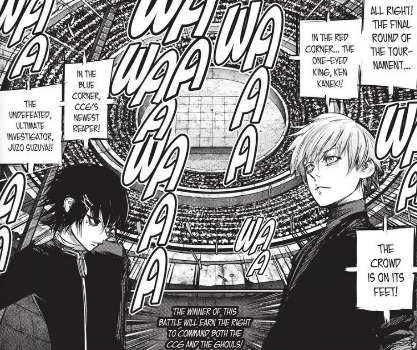
Gojo is a major character in the manga Jujutsu Kaisen, literally "Sorcery Fight" and he is the best sorcerer in the whole world. His entire identity revolves around being a sorcerer. Since he is so good and beloved at what he does, he thinks that everything is resolved by exorcising a curse or defeating a strong opponent. He has basically no identity outside of that. Which is why when he's fighting the possessed body of his student, a person he's been mentoring since childhood his priority is not to save Megumi but to beat a strong opponent. Gojo is a sorcerer, before a human being. That's who he is, that's who he always has been since day one.
I think part of the negative fan reaction comes from fans being really attached to this scene in the manga and deciding Gojo's entire character revolves around being a good mentor figure to children.

Which is just incorrect, Gojo's entire character revolves around being the strongest. On top of that though, Gojo can care about children and also care about being the strongest he can care about multiple things at once and have those things contradict each other because humans are complicated. I'd point out even in this panel where he's stating motivation he's not trying to raise these kids up into being healthy adults, he wants them to be strong Jujutsu Sorcerers. Even when he's raising kids, his intention is to turn them into Jujutsu Sorcerers because everything in Gojo's mind revolves around Jujutsu Sorcery. Gojo does not exist outside of the world of sorcerers. Gojo may be the chosen one but he'd never be able to hold down a job at Mcdonalds.
I think in general readers put more investment in the things characters say out loud, rather than their actions. You can say one thing and do another. I can say "I should never eat sweets again I'm going to improve my diet", and then go and eat ice cream five hours later. Gojo can state out loud his intention to foster children and protect their youths, but then fail to properly do that in the story. Characters are not always what they say they are, that's why they're interesting to interpret. This isn't me calling the readers stupid, just pointing out that Gojo is made up of contradictions. He wants to get rid of the old guard and replace them with something new, but Gojo IS THE OLD GUARD.
If the culling games arc has shown us one thing, it's that ancient sorcerers brought to the modern age do not care that much about human life on an individual level, they are all of them egoists. There's a reason Gojo resembles someone like Sukuna more than he does any other character in the manga. I'm not saying Gojo is exactly like Sukuna, he's far more altruistic and uses his genuinely noble ideals but at the same time Sukuna is a shadow archetype to Gojo he represents Gojo's flaws. The flaws that Gojo succumbs to in tragic fashion.
Which if you believe that Gojo genuinely does love his students, and the ideal he's fighting for is to raise up a better generation and allow them to live out their youths, then Gojo throughout the entire Sukuna fight is acting against those ideals. He cares far more about fighting Sukuna then he does saving Megumi, it's shown over and over again in the battle, Megumi is an afterthought to him. If Gojo care moredefeating the big bad and saving the world is more important than helping a child that Gojo is responsible for then Gojo is acting against his stated principles. Why should Gojo win the fight when he's fighting for all the wrong reasons?
Tragedies are like visual novels, if you make the wrong choice the novel will give you a red flag. If you ignore the red flag then you get locked into the route with the bad ending. Gojo always fights alone. Gojo only ever fights for himself, even if he's using that selfishness in support of a more noble ideal like creating a better generation of sorcerers. If Gojo consecutively makes the same changes then in a tragedy he's not going to be rewarded for it.
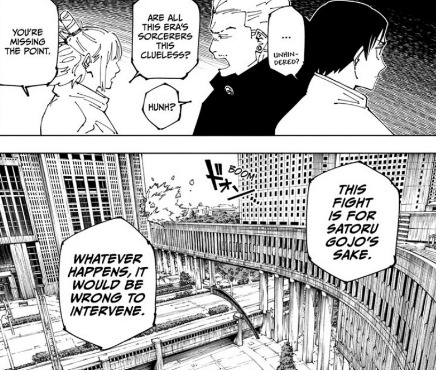
Gojo wants the old generation out and the new generation in, but Gojo resembles the old generation too much. Old sorcerers like Hajime and Sukuna respect him, Hajime argues that Gojo being able to fight for his pride is far more important than him living to the end of the battle when Yuta wanted to interfere and help him.
Gojo's death isn't a surprise curve ball that Gege is throwing us for shock value, it's a result of his choices throughout the manga. A manga about change, and the change between generations is not going to punish a character for remaining roughly the same. Of course you might find it disappointing that Gege didn't give Gojo the chance to grow and change and experience a character arc like Megumi or Yuji, but Jujutsu Kaisen is a tragedy, and the way Gojo's arc ended is consistent with what Gege wrote.

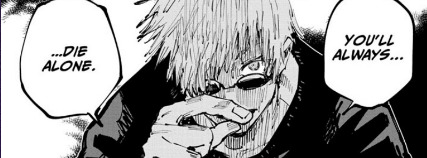
Jujutsu Kaisen is not just a tragedy though, it's a manga about death. The manga begins with Yuji's grandfather warning him not to die alone the way that he did. His grandfather's dying words are what motivate Yuji throughout the beginning of the manga as he's searching for a "proper" death.
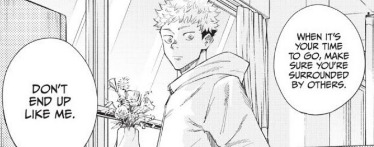
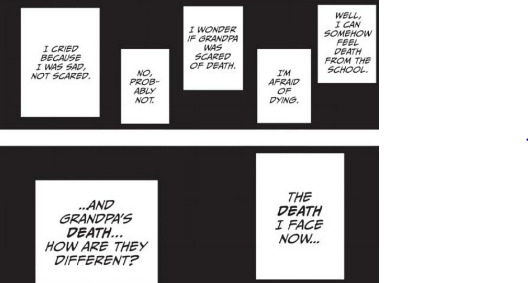

One of the major themes of Yuji's character is a contemplation of death. He accepts that death is inevitable, so he wants to save them from the gruesome deaths they'd experience if they became victims to curses and allow them to have a more satisfying death. Yuji's grandpa died an unsatisfying death because he died alone in a hospital room. Yuji even tries to make his own death a satisfying one because he believes by dying to seal away Sukuna he'll reduce the total number of casualties to curses.
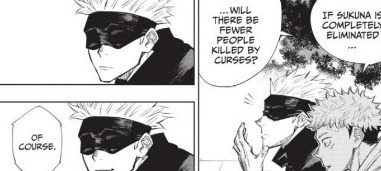
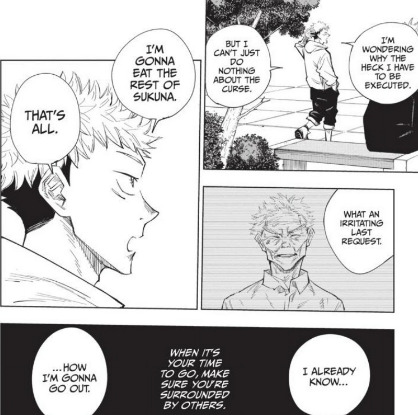
Jujutsu Kaisen keeps investigating the theme of death and what exactly would make for a satisfying death. At one point it's all but stated that death is the mirror that makes humans analyze their lives.
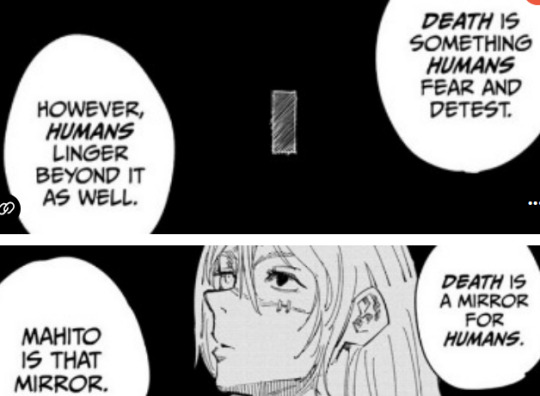
When Yuji fails to save Junpei from the "unnatural death" it calls into question whether or not his goal of saving people from unsatisfying deaths and the gruesome deaths caused by curses is even feasible. Nanami even says that Yuji might not be able to accomplish his goal and warns him away from the path.
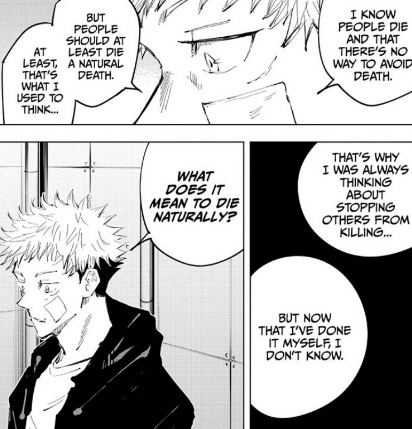
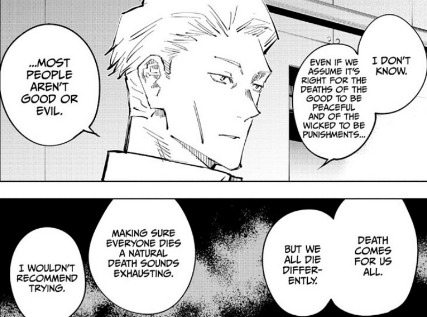
We see repeated unsatifying deaths in the manga, each time someone reflecting on their deaths that they weren't able to get what they wanted out of life. This list comes via @kaibutsushidousha by the way I'm quoting them.
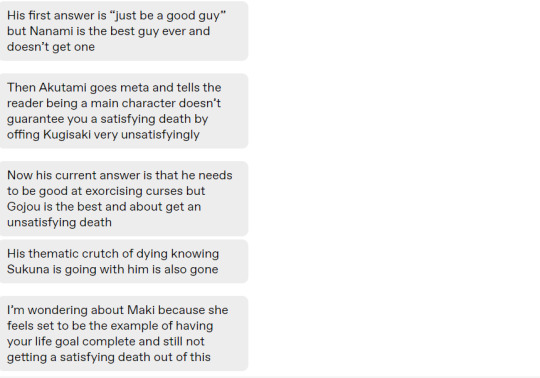
Nanami's a character who chose to work as a sorcerer because he didn't want to evade the responsibility of doing all you can to help people, he wanted to believe he's somewhere where he's needed. He never runs away from responsibility like Mei Mei does so he quite literally works himself to death, living and dying as a sorcerer. Nanami or Gojo's dying hallucination of Nanami even says as much, his death is the result of him choosing to go south and returning to be a sorcerer.
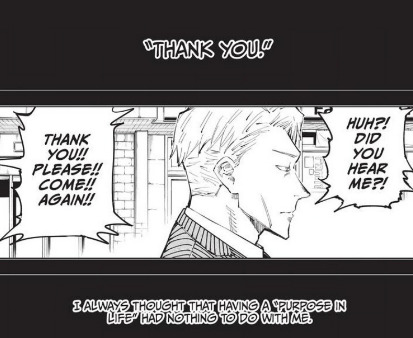
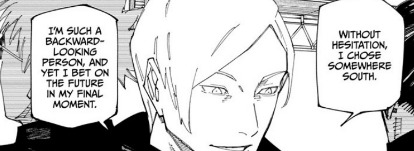
Maki chose revenge against the Zen'in over her sister, and as a result Mai is dead. Maki has all the power in the world now, her revenge complete but she's left with a sense of "now what?" She's as strong as Toji now but she failed to protect her sister, and it's the result of the choices she made. Maki's reflection isn't triumph, it's "I should have chosen to die with her."

Even Yuji himself is robbed of his narrative purpose. The manga began with Yuji saying he wants to choose how he's going to die and he'll die taking out Sukuna with him so he can reduce the number of people killed by curses in the world. Both of those things are thrown in Sukuna's face. Number one the amount of people Yuji can save by permanently killing Sukuna is now a moot point because he let Sukuna rampage in Shibuya.
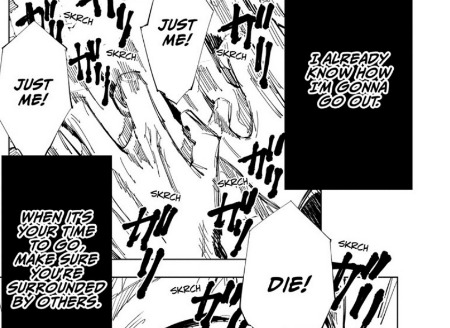
Number two, Sukuna isn't even in Yuji anymore. To build on what Comun said though, this repeated tragedy has a purpose to it and understanding requires understanding that Jujutsu Kaisen is an existentialist manga. Existentialism is basically a school of philosophy centered around the question of "Why do I exist?"
There's nothing about the invetability of death to make you question why you're alive in the first place. In the myth of Sispyhus, Albert Camus boils down all of philosophy to one question.
"There is but one truly serious philosophical problem, and that is suicide. Judging whether life is or is not worth living amounts to answering the fundamental question of philosophy. "
All of philosophy is should I shoot myself in the head or should I keep living? Everything comes after that question, which is why in Jujutsu Kaisen a lot of the characters motivations revolve around them contemplating death. Sorcerers exist in a world where they can die any moment, and as Gojo says most of them die alone. It might be the nature of sorcery itself that causes so many people to die, not only are they dying because they are trapped in an uncaring system, but the characters themselves aren't really attempting to live outside of it. They live and die as sorcerers, replaceable cogs in the machine.
All of these unsatisfying deaths may just be the result of all these characters making one choice, to live as sorcerers rather than people. Because to exist means to live in the world.
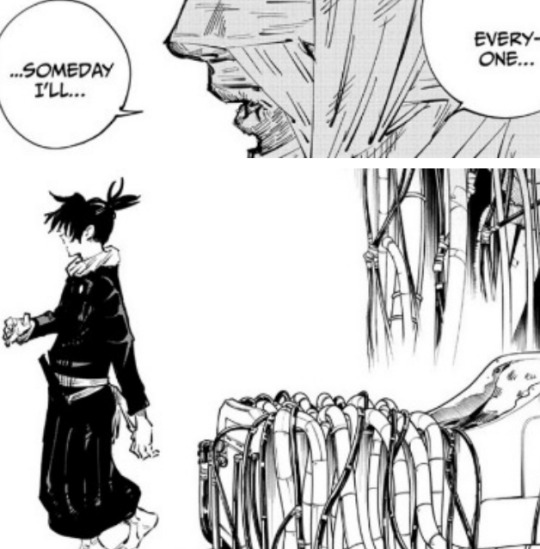

Even in Mechamaru's case, his goal is deeply existentialist by what I defined, all he wants to do is live in the world with everyone else rather than be stuck in his hospital room but his actions contradict that goal. Instead of letting his friends come and visit he's obsessed with the idea of getting a normal body because he feels that's the only way he can exist with everyone else, he makes a deal with the devil, he lies and goes behind their backs. He wasn't living with everyone else in the world and he could have chosen to, he chose wrong and his death is the result of that choice.

Jujutsu Sorcerers aren't living in the world. They're living in a little snowglobe far removed from the world with its own rules, most of them regressive and disconnected from the rest of society. If you define existentialism as just "living in the world' then a lot of these characters aren't, because they only exist in the world of sorcery.
INVISIBLE BUFFY: What are you talking ab-
SPIKE: The only reason you're here, is that you're not here. (drinking) INVISIBLE BUFFY: Right. Of course, as usual there's something wrong with Buffy. She came back all wrong. (moving around on the bed) You know, I didn't ask for this to happen to me.
SPIKE: Not too put off by it though, are you? (drinking) INVISIBLE BUFFY: No! Maybe because for the first time since ... I'm free. She tosses the sheet aside. Spike looks around, trying to figure out where she's going.
INVISIBLE BUFFY: Free of rules and reports ... free of this life.
SPIKE: Free of life? Got another name for that. Dead.
Not living in the world with everyone else is the same as being dead.
A lot of these characters either make the choice to act alone, or be a jujutsu sorcerer rather than a person and because of that they die as sorcerers, b/c sorcerers die that's what they do. Mai didn't want to keep living as a hindrance to Maki so she kills herself. Maki didn't want to be anything other than a sorcerer, so her little sister dies and she's not a big sister anymore. Nanami chose to leave his job behind and become a sorcerer again, he dies as one.
Of course I don't think the manga is punishing characters for being too egotistical, but rather too unbalanced. If anything Mai is too selfless and that is why she died, she didn't want to live for herself and chooses self sacrifice for her sister. An unbalance between selfishness or selflessness results in an underdeveloped ego. Jujutsu Kaisen doesn't punish individualism per se, moreso if you're not a fully developed individual you won't last long. Because it's also a manga about growing up in the world, and a person who doesn't have a healthy, mature, well-balanced sense of self is not a grown up.
This twitter user det_critics points out that Gojo (and also Yuki + Yuji's) failures in the manga can be attributed to the fact they don't have real senses of self.
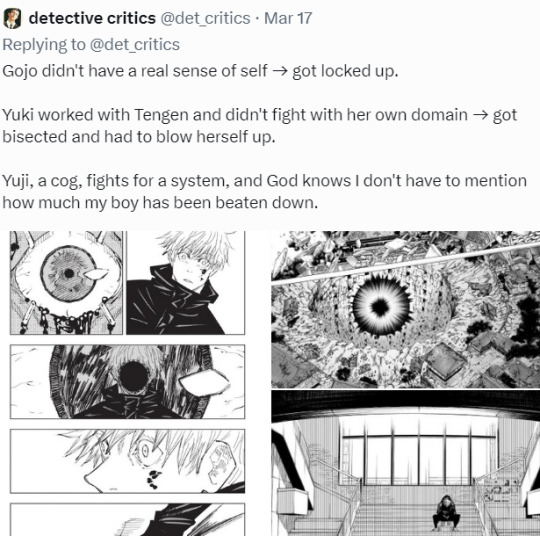
Gojo has an identity crisis as outlined by Geto, "are you Satoru Gojo because you're the strongest, or are you the strongest because you're Satoru Gojo?"
It's a challenge for him to find some reason to live outside of being the strongest, and in tragic fashion Gojo just doesn't find it in time. Gojo lived for fighting others, and proving to himself that he's the strongest, and that's how he dies.
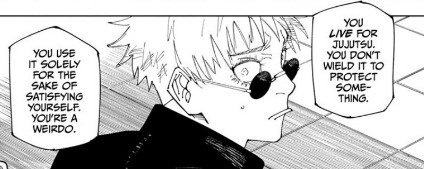
There's something I like to say about narrative punishment in stories. There are two ways to punish a character, you either don't give them what they want, or you give them exactly what they want. This is the latter, Gojo wanted to find someone stronger than him because deep down he believed that nobody could understand him unless they were on his level. He wanted to be surpassed, and that's why he focused on creating stronger young sorcerers, but he never shook himself of the belief that only someone as strong or even stronger than he was could ever be emotionally attached to him so he made a deliberate choice to draw a line between himself and others.
Gojo's essentially gotten what he wanted from that choice in the worst way possible. The student he picked to succeed him Megumi, has his body stolen and kills him. Gojo is surpassed, but it's not by one of his own students it's by an enemy that's not only trying to kill Gojo but is going to massacre his students afterwards.
Gojo's spent his entire life believing that because he's more powerful that makes him inherently different and above others, and being lonely because he himself believed he couldn't relate to ordinary people and he dies like an ordinary person, an unsatisfying death where he wasn't able to bring out Sukuna's best, where he gets unceremoniously cut in half offscreen but yay he's no longer the strongest. He's gotten exactly what he wanted. Megumi is still not saved, Sukuna's probably going to kill more people because Gojo failed to stop him here, but hey at least he stopped to compliment Gojo.
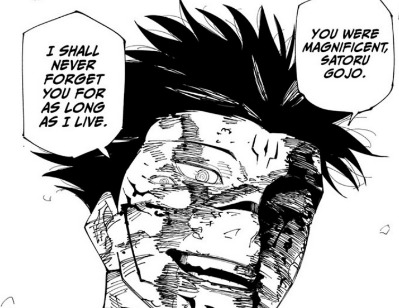
It's empty, but it's empty because of the choices Gojo made in life to just not bother connecting to people or develop any kind of identity besides being a sorcerer. Gojo lives and dies as a sorcerer, and his dying dream is returning to a teenager being surrounded by everyone he was with during his school days, because that's the happiest time in his life. Ironically he was happier before he became the strongest, because that was the only time in his life that he allowed himself to connect to people.
However in the eyes of others, he is someone who has it all. That's why he is always alone. There was no one who could hold the same sentiments and mutually understand him. Geto was the only one who could understand what he was trying to say, and the only one who could communicate well with him.
It's no coincidence Gojo and Geto die exactly a year apart on the same day, if anything I'd say the reasons they die are similiar to at least thematically. They both die because they don't want to live in the world. Geto thinks the world is too corrupt and GOjo doesn't want to be anything other than a sorcerer, both of them fail to adapt.
「 'It's just. . .'
It's just that it was what Geto had to do.
[...] To someone like him, the reality that the world of sorcerers presented to him was just too cruel.
'. . .that in a world like this, I couldn't truly be happy from the bottom of my heart.'」
They can't be happy in a world like this from the bottom of their hearts, so narratively they both die. The things they chose to live for at the end of their life they fail to accomplish, Gojo is no longer the stronget, Geto fails to wipe out mankind or make major changes to the world and they die as normal people unsatisfied because they weren't trying to live in the world and make connections to others. They die almost karmically a year apart because their main connection for both of them, the thing which made them feel connected to the world and other people was each other.
Which is why this panel breaks my heart and is so narratively satisfying because of how unsatisfying it is...
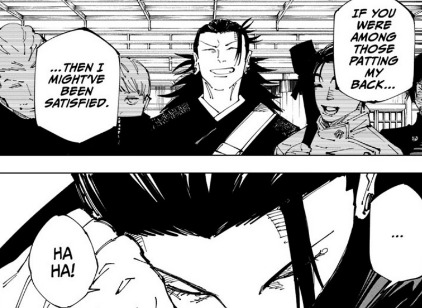
"If you were among those patting my back... then I might've been satisfied."
Gojo reflects that he's not satisfied dying against Sukuna, not because he failed to give him a good enough challenge but because Geto wasn't there to pat him on the back. The one thing that would have satisfied him he couldn't have, because he didn't live to connect to people he lived to be the strongest and he died alone as the strongest. There's just something deeply upsetting about Gojo's dying dream fantasy just him being there talking with all of his dead friends who he never appreciated or connected to properly when he was alive. Knowing that if something had just gone a little differently, that even if he had to die no matter what he could have died happier if Geto was among the people saying goodbye to him because that connection with Geto is what gave his life meaning.
Dazai Osamu: "A life with someone you can say good-bye to is a good life, especially when it hurts so much to say it to them. Am I wrong?"
-Bungou Stray Dogs Beast
#gojo satoru#jjk spoilers#jjk meta#jujutsu kaisen 236 spoilers#jjk 236#jujutsu kaisen 236#jjk 236 spoilers#jujutsu kaisen#jujustu kaisen meta#jujutsu kaisen theory#jujutsu kaisen manga#satoru gojo#geto suguru#suguru geto#satosugu
1K notes
·
View notes
Text
You were defeated by your own self , self-loathing,selfeating, Sukuna .- twisted power of love
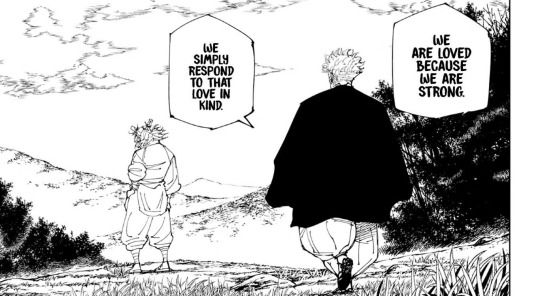
The projection of Gege's self-hatred onto his favorite character.
---The hardest battle you'll ever fight, is against yourself---
TL;DR
And thus, Yuji will strive to separate (Cut like Sukuna) his opponents BUT from their "evil" and direct his energy only towards this "evil," which is the opposite of a Sukuna's self-hatred power ,Yuji can be viewed as a mirror reflecting Sukuna's twisted power of love.
Therefore, the first chapter essentially, by title, reflects Yuuji and Sukuna
Sukuna's statement that "only the strong are loved" ("strong" can be of different kinds)takes on a particular significance: he attracts love through his strength , highlighting his main conflict reflected in his relationship with Yuji. For Yuji, strength and violence are alien; his essence is permeated with kindness. As a result, Sukuna feels his vulnerability, realizing that his achievements hold no value in Yuji's eyes. Experiencing self-hatred, he understands that while Yuji is simply kind to people, his love can be obtained "just like that," whereas towards Sukuna, Yuji harbors disdain, which is painful, as Sukuna has become strong out of a desire to receive love.
"Thus, he became strong because he realized that they loved strength, while he himself was weak. From this, he concluded that by being strong, he would receive love and respect simply for his existence as strong, and he would no longer feel weak. Therefore, his desire for love lost its significance, as only the weak needed it. Now his primary strength became his "love". And this means that using this strength towards himself and others can be compared to its application on the battlefield, where it is used to defeat the enemy. Thus, those who seek love from him will be destroyed, because all he has and who he is, is strength. Without it, he is nothing. "This implies that he cannot be loved because only the strong are loved". Thus, this expresses contempt for weakness, as the weak rely on "love" and connections, while he, being strong, does not need these connections, leading to rejection of both self-love and everything associated with it, and therefore, it is an expression of hatred.
The application of force (hatred) even towards oneself, towards one's weakness - the human side.
Thus, the application of force towards oneself and one's weakness in this context becomes a manifestation of contempt for the human side and dependence on love. This path can be interpreted as an extreme way to achieve self-assurance, which, nevertheless, cuts off from love and leads to hatred towards both oneself and the surrounding world.
The application of force towards oneself and one's weakness here is presented as a way of rejecting love and refusing to accept the human side - thus self-denial-self-eating.
This contradiction is manifested in the irony of the situation: a person becomes strong in his desire to rid himself of his weakness and dependence on love, but as a result, he becomes consumed by hatred, both towards himself and towards the surrounding world.
This desire is expressed through the denial of the human side, the refusal to accept one's weaknesses and dependence on love. This leads to strength becoming the main attribute of personality, while human connections and emotions, such as love, are rejected as unnecessary and even harmful.
Thus, the application of force towards oneself and one's weakness, as well as the denial of love and dependence on it, create a cycle of self-destruction and hatred towards oneself and the surrounding world. This can be interpreted as a path that, although aimed at achieving self-assurance, ultimately leads to isolation and spiritual destruction.
The cycle of samsara.
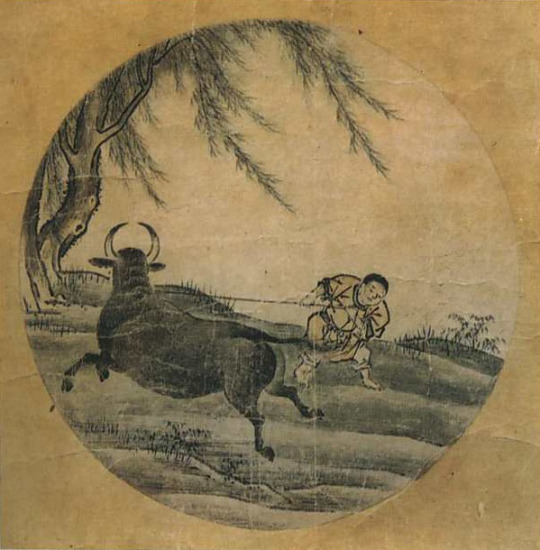
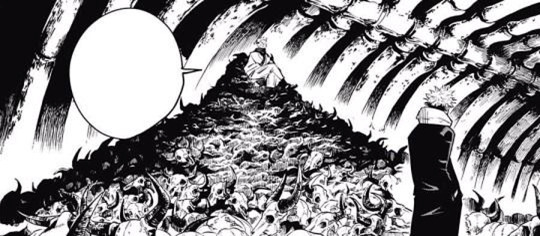
("twisted love ") his curse and power "kitchen"- (10 bulls Buddhism- you can read in wiki ) - he literally kills (eats) the “bull” "human" his own self constantly, so there are a lot of their skulls inside him - his own , and he sits on the throne of them, his essences, believing that he has “surpassed” himself - the human nature
"Sukuna is surrounded by the remnants of his failed attempts to transcend his ego, symbolized by the "skulls" of his former selves."
maybe this is part of the “vow” of constantly fighting (eating) within yourself
Self hatred
Like the seals on his shoulders - circles
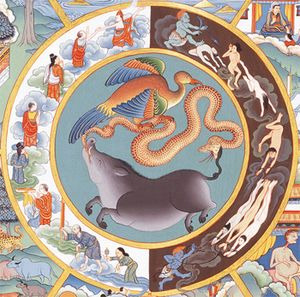
Sukuna is the strongest because he suffers the most, hates himself and experiences an internal conflict that generates cursed energy.
Anger (rage, aggression, a sense of vengeance, disgust) is represented in the image of a snake. The snake typically slithers away when approached by a human or attacks them. Similarly, a person seeks to eliminate an irritating object from their field of perception, either by avoiding it or destroying it. This is similar to his behavior and avoidance of Yuji - the epitome of absolution - kindness, because he unconsciously experiences disgust – the truth.
The Rooster is a symbol of passion, as it is both the owner of a harem and capable of finding a tiny grain in the grass and dust – exactly what it needs; just as passion keenly selects its object of desire from the multitude presented. This can be compared to how Sukuna chooses his opponents.
Ignorance (neglect, stupidity, laziness, foolishness) is represented in the image of a pig. The pig eats everything indiscriminately, unable to discern between good and bad, fortunate and unfortunate due to its lack of understanding. Incidentally, the pig is the only animal unable to lift its head to the sun. However, Sukuna usually regards others disdainfully from top to bottom, like a large pig, experiencing "foolishness" because he has confined himself within the pigsty of his own convictions.

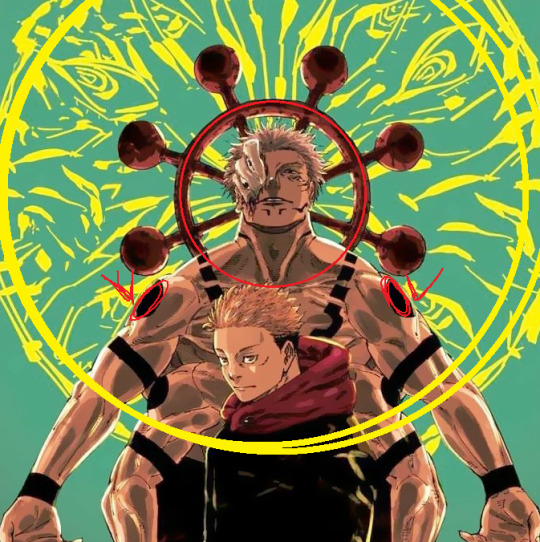
Perhaps not intentionally, but symbolically, Yuji's head is at the level of his heart.
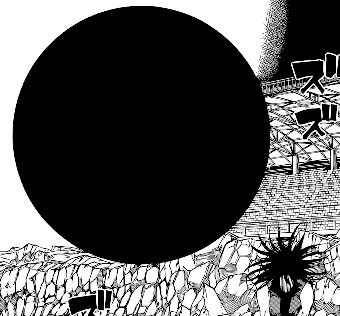
In other words, the cursed energy spawns a concentration circle of hatred , trapping individuals in an endless cycle of conflict,a cycle of samsara- in which people remain fighting with another person with their emotions. - mostly hatred
This could be seen as a vow or a struggle to overcome one's own limitations , by constantly confronting and consuming aspects of the self.

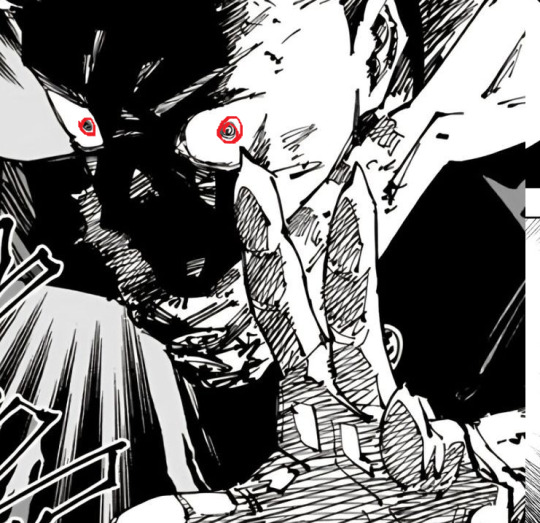

"You weren't merely defeated by external forces, but by your own internal strife—your perpetual disdain for your human side."
your downfall stemmed from your own internal contradictions, which morphed into a binding oath (all his seals on his body literally seal a person in him). Your disdain for humanity, extending even to yourself, became both your strength and your curse, corroding your soul from within (gestures toward the mask).
(the mask) Much like Tengen, embodies a constructive "emptiness" that exists harmoniously with the world, at peace with people. However, Sukuna's "emptiness" is purely literal, representing a detachment from humanity, a void of sorts.
You've lost all sense of purpose, consumed by self-loathing to the point of utter emptiness.
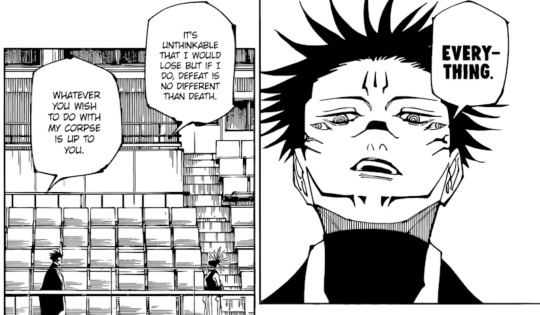
he is his strength - and if he loses, he "strength "will die, which means to him that he is nothing(because "I" = strength ),( which everything) he can feel , towards "him " is hate, emptiness ,insignificance - nothing - cant take "love".
nothing is nothing - so it his - corpse
paradoxically there cannot be “love”, because only the “strong” are loved.
It's as if he can't even comprehend the idea of being loved or valued without his strength.
Without it, he feel like a mere shell of himself, devoid of purpose or meaning. - corpse
his "manhtra "
His strength defines him, and should he lose it, his very essence will wither away, leaving him feeling like nothing.-(which everything to him.) Because in his eyes, strength equals identity, and without it, he is left hollow, consumed by feelings of worthlessness and self-loathing.
To him, strength is everything, and without it, he feels empty and insignificant. He's trapped in a mindset where only the strong are valued or capable of receiving love, leaving him unable to grasp the concept of being cherished for anything other than his strength. Without this defining trait, he fears becoming a mere shadow of himself, devoid of purpose and meaning—a walking corpse. His mantra revolves around the idea that his strength is synonymous with his identity; losing it would strip away everything that makes him who he is, leaving behind only a hollow shell consumed by feelings of worthlessness and self-doubt.
This fear of worthlessness drives him to cling desperately to his strength, as he sees it as the only thing protecting him from a profound sense of misery and insignificance. It's not so much a fear of death that motivates him, but a fear of experiencing the emptiness and smallness he associates with weakness.
So when he talks to Yuji he projects
You are my special
"Get lost in me" - "Become me."
I wanna feel your heatwave - Break down.
I love you, baby - I hate you
because you don't yield to me, to my strength
A world spinning in ambiguity - on the other hand, if Yuji does not give in, then Sukuna loses his “power” - himself and his hatred,"And will make him feel (1 )'loven'."- (This means that Yuji literally robs him of his purpose - his strength - himself - his self-loathing.)
(1 )This suggests that Sukuna's identity is closely tied to his ability to dominate others, especially Yuji. If Yuji resists, Sukuna not only loses his power and sense of self but also his profound self-hatred, leaving him vulnerable to experiencing an unfamiliar emotion—love. In essence, losing control and self-hatred allows Sukuna to explore a more vulnerable side of himself.
You are my special
"Even if the meaning is not correct, the fact is that they mirror to each other."
He wants to prove that his own existence and self-hatred are justified.
Sukuna conducts " a series of trials " before Yuji, aiming to prove to him that his purity of soul is not the basis of his strength. He expresses the belief that the source of strength lies in the ability to be cruel and hateful rather than kind. In his worldview, strength arises from self-loathing and denial, while love and compassion are seen as manifestations of weakness.
Sukuna seeks to affirm his beliefs through these trials and sufferings. He desires to break Yuji, to bring him down to his own level of hatred, in order to confirm his own existence and self-hatred. For him, pure strength becomes a symbol of his self-loathing - his own "self." He seeks to reinforce this hatred through Yuji, who, in his opinion, is excessively pure and capable of loving others unconditionally, which, in his view, renders his strength useless and undermines his own existence.
Overall, Sukuna's character is driven by a complex interplay of fear and a desperate need for validation through the lens of strength and self-loathing.
SURVIVAL
"You're so weak yet you cling to life?"
CHILD "I"- lack of strength" - weak and misery- unwanted , rejected, unloved, insignificant, unimportant, nothing, profound sense of emptiness and smallness.- DEATH
"You should spend your lives stifling (EATING)your misery. "
(Sukuna -Child - Yuji)

It seems to me that here it is being said that a brother or another close person can replace a parent in terms of providing love and understanding "self", as well as becoming a reliable support for the individual.
Perhaps previously he believed that self-love was meaningless (although he assumed this applied to others as well), but after encountering Yugi's soul, he realized that love, akin to dedication to an ideal, gains significance as it can transcend death and become something eternal, which is the true meaning. This enlightenment proved more significant than Sukuna's physical prowess, piercing his self-perception for the first time and shaking him to the core.
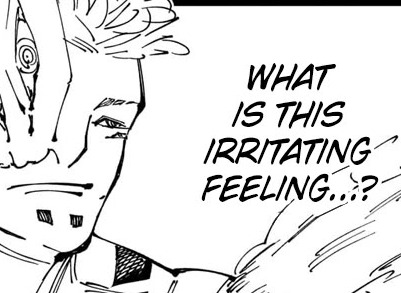
As the only thing he had been doing was killing time to die.
From the expression on his face in these two frames, there is a similarity: when it comes to love, he appears irritated, but this time he felt it - the love - and experienced pain, for the first time in a long while.

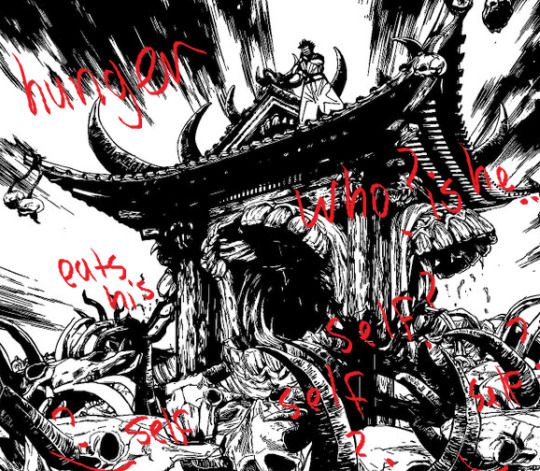
Sukuna, as the most powerful being, has moved away from the notion that his strength guarantees victory. Now it's more of a shadow of an ideal—meaning himself as well, because Sukuna possesses only power—a symbol of relentless personal resilience that he finds in Yuji. He has realized that without this strength, he is devoid of purpose, and in his pursuit of it, he has lost everything, including himself and his inner content. While in Yuji, lacking this power, his eyes shine like a beacon of humanity the love he needed—an ideal that transcends himself, through the idea of protecting others, akin to Prometheus his kindness. This irritates Sukuna and casts doubt on his own existence.
The deal is that Sukuna, regarded as the "strongest " was bored and annoyed with Yuji because his strength was based on something Sukuna could never understand or accept—the true essence of love.
Love, as a force and a tool, is immeasurable except through the sacrifice of those who gave their lives for the ideals of higher humanity—those whom Sukuna could not understand and whom he killed in his pursuit of "strength" and acts of violence deemed "supreme" beyond human nature.
Only after meeting Yuji did Sukuna gain insight, and his transformation can be characterized as a (2 )manifestation of love. Because he begins to "understand" other aspects of human existence, such as compassion, selflessness, and the ideals of higher humanity. In this context, his insight and change are perceived as manifestations of (2 ) love—understanding and accepting these human qualities that he previously could not comprehend or acknowledge.
The (1 ) first follows from the (2) second, but Sukuna hasn't understood it yet, he has only feel it.
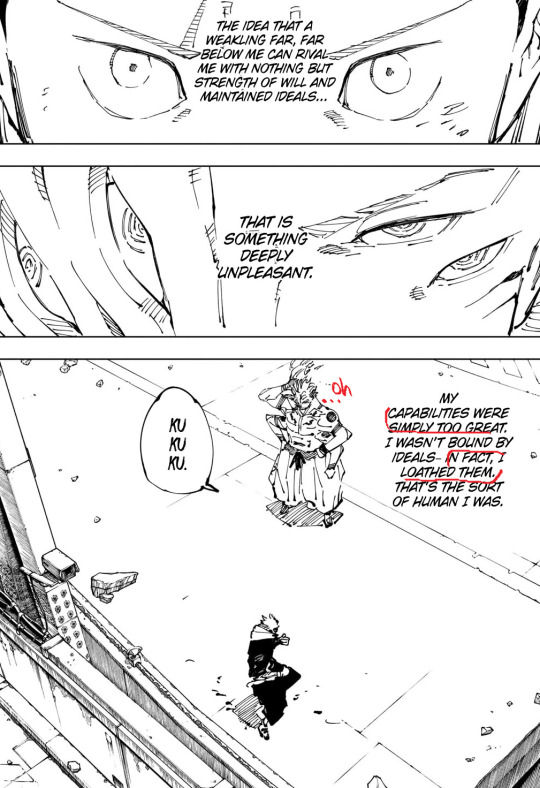
Sukuna has long lost the battle against his own hatred, mired in feelings of anger and jealousy. These emotions only fill him with disappointment and rage, fueling his desire to seek ways to cause pain and damage solely to destroy Yuji and undermine his faith
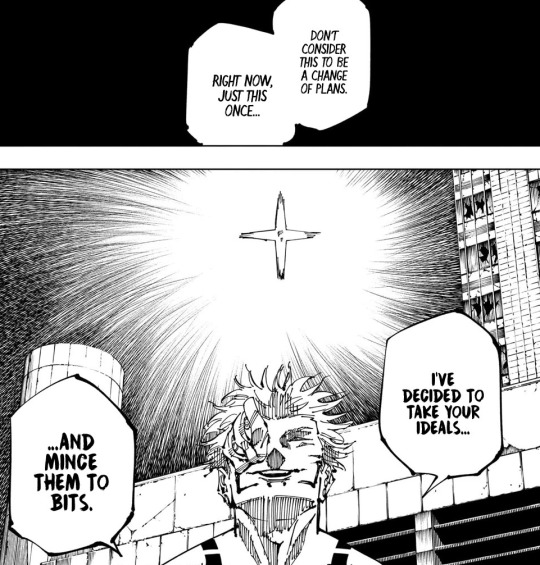
The acknowledgment that his kindness - love is genuine and unconditional seems incomprehensible to him, as if he's afraid to admit that such a thing is possible - because he was not loved and had no one. and that means he didn’t need anyone to satisfy him


Short version
He remembers his yearning for love during childhood, seeing it as a symbol of vulnerability and lack of significance. Regarding dependence on someone "stronger" as a weakness, he holds the belief that seeking affection and connections is characteristic only of the weak.
As a child, Sukuna often felt vulnerable due to his weaknesses, which made him feel chained to his flaws. This prevented him from truly loving himself and others, and he believed that only the strong deserved love, attention, and respect. Sukuna realized that true strength lies not in seeking love, but in giving it to others. However, he saw this gesture as a weakness and chose to demonstrate his strength through hatred instead of love. In battles, he "gave" his "strength " - "love "to others as a form of victory, judging the weak (including himself) as deserving of destruction. Sukuna rejected the concept of love as a dependency for the weak and meaningless for the strong. He avoids using names because he sees his past (weak) self in others, particularly Yuji, and despises himself for it.
In the past, Sukuna often felt vulnerable because of his weaknesses. It created the impression that he was shackled by a chain linking him to his flaws. This hindered him from truly "loving" himself and others, experiencing compassion ..? huh. He believed that only the strong deserved love, attention, and respect, and without strength, he was nothing.

That's why Sukuna realized that true strength lies not in the pursuit of love, but in being able to "give" it to others. He concluded that such a gesture is something only the weak need. Therefore, he decided to resort to another way of demonstrating his "strength"—using it as a tool of hatred instead of love.

Here, he seems to be contemplating a reflection that doesn't actually exist, only its silhouette - in the present, or, to be more precise, he sees himself in Yuji - in the past.
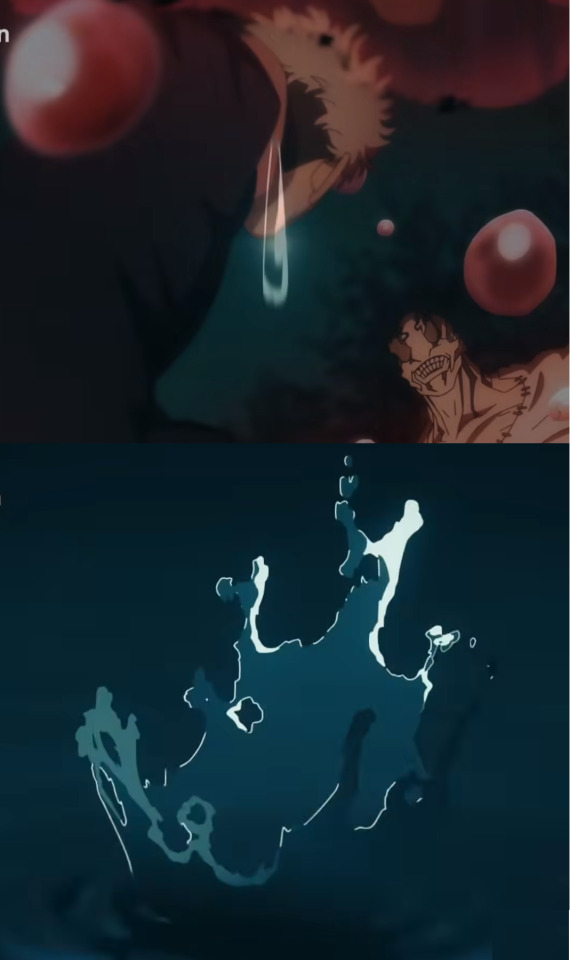
I wonder that this drop falls in Sukuna's domain, isn't it?

Sukuna began "giving" his "strength" to others in battles, seeing it as his version of "love"—an act of victory, where he acts as the judge of the battle, where the weak (Sukuna)are destroyed. And he decided to abandon the concept of love, considering it a dependency meant only for the weak and meaningless (now he's above "love" ,he is not a child, a parallel with Yuji and his treatment of him is disdainful-he recognizes himself in him)for the strong.
So he refrains from using his name because he sees himself (specifically, his past self as a child) in him - and despises himself.
Sukuna regarded strength as the sole indicator of success, and it became his driving force, but, like fuel, it only fed his inner hunger, the desire for self-destruction, rather than self?-love. He replaced strength with a sense of his former insignificance. Even being the most powerful, he couldn't stop and didn't find satisfaction, destroying himself, killing his "self" in the process, which ultimately led him to emptiness. - But the fact is that this emptiness is not of a Buddhist nature, not grounding, but self-eating
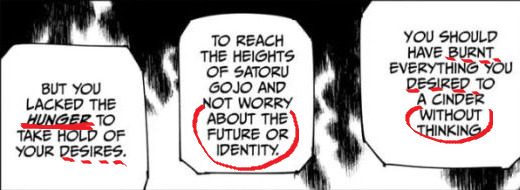

In the depths of Yuji, there is something that I am sure will turn out to be his hidden power : the ability to transform internal negative emotions into a manifestation of faith in goodness. He will not just suppress these emotions but actively engage in a struggle with them. Yuji uses hatred as a sort of weapon against hatred itself—like fighting fire with fire. He will begin to see "more than he" the idea of hatred as an inner enemy present in each of us, reflected in his own personality, in Sukuna, and in the personalities of those around him.
And thus, Yuji will strive to separate (Cut like Sukuna) his opponents from their "evil" and direct his energy only towards this "evil," which is the opposite of a Sukuna's self-hatred power ,Yuji can be viewed as a mirror reflecting Sukuna's twisted power of love.
Speculation below
The absence of parental love can create a profound void in childhood, leading to a deficiency in emotional support which, in turn, contributes to negative self-perception and attitudes toward oneself and the world. This deficiency often manifests as low self-esteem, self-hatred, and behavioral issues such as aggression or depression. Jacques Lacan's concept of the "mirror" provides insight into how parental relationships sculpt a child's self-perception and psychological development.
It is intriguing to observe how Yuji and Sukuna mirror each other's behaviors.
Identification and emulation: Individuals who lack parental figures may seek to emulate others who resonate with them or serve as role models. This behavior often stems from a desire to comprehend how to appear, feel, and act based on observed traits in others.
Search for emotional connection: People who lacked parental figures or did not receive adequate emotional connection during childhood often strive for intimate relationships with individuals who can fulfill this emotional void.
It's worth noting that characters may not fit perfectly into any one personality type due to their complexity and fantastical nature.
Yuji's identity is deeply intertwined with television. Gege's narrative underscores that he "grew up on television," suggesting that this medium became a surrogate for parental figures and filled the emotional void in his life. His enthusiasm for parodies and karaoke, venues where he could interact with others, reflects his ambiguous sense of individuality, likely influenced by television as his primary source of inspiration and behavioral model. Additionally, his emotionally reserved grandfather deprived him of necessary support during childhood. - if unfounded then Yuji INFJ -INFJs are known as chameleons, adapting to different situations. This clarifies why Yuuji excels in collaborative combat and absorbs lessons from others—he's like a sponge.
Sukuna's depiction as a petulant child reflects emotional immaturity and egocentrism commonly associated with unresolved childhood traumas or deficiencies in parental nurturing. His reactions and demeanor echo characteristics typical of children: egocentrism, emotional volatility, rebellion, and disobedience. His unpredictable behavior mirrors the emotional turbulence of a child grappling with feelings of abandonment or neglect, particularly evident in situations beyond his control or comprehension. - if unfounded then Sukuna INTJ
INFJ : "I may not always understand the intricacies of your emotions on an intellectual level, but I can feel them deeply.It might not intrigue you cold mind , but it brings warmth to your heart." Breathing life into your being."

INTJ: "Your natural stands as an enigma within my ordered world. Yet, I find myself drawn to this anomaly, stirring within me something beyond rational comprehension. This connection, however unconventional, holds a fascination that I cannot ignore."
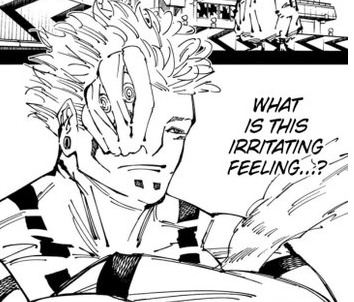
One feels the other thinks - but they are one -connection between Yuji and Sukuna, suggesting that despite their apparent differences, there is a symbiotic relationship between them. This mean that they influence each other in profound ways, with Yuji's emotional sensitivity complementing Sukuna's strategic thinking, or vice versa. It indicates that their identities are intertwined on a fundamental level, even though they may manifest differently in terms of behavior and personality.
Nevertheless, Sukuna experiences a transformative moment when he acknowledges and embraces the profound love emanating from Yuji. This revelation serves as a form of "enlightenment" or "rebirth," illuminating a path within the darkness of his existence. This is the first time Sukuna encounters unconditional love. For him, it signifies liberation from hidden motives, such as the desire to use others in his childish power games ("me versus you," "who's superior," etc.), simply to kill time. Now, he avoids manipulations he once considered normal but which Yuji interprets as a craving for attention. Yuji doesn't value "power," leading Sukuna to the paradoxical conclusion that he's unloved - the only thing he ever desired. He realizes his past actions were merely theatrics, where he played the leading role, but now, meeting Yuji, everything changes. Yuji doesn't engage in this game, refusing to succumb to the spectacle of death for emptiness' sake. This moment underscores parental resilience, selfless guidance, and dedication to the greater good.
This realization is especially poignant following Sukuna's unsuccessful attempts to break Yuji. Yuji's unwavering loyalty and resilience, directed not towards himself, exemplify a depth of love Sukuna has never encountered. Sukuna's inability to avert his gaze from Yuji, despite the accompanying anguish, underscores his inner turmoil. This revelation challenges his preconceived notions, exposes internal conflicts, and highlights emotional vacancy, reflecting the difficulty he faces in embracing newfound emotions and comprehending the true essence of love and loyalty.
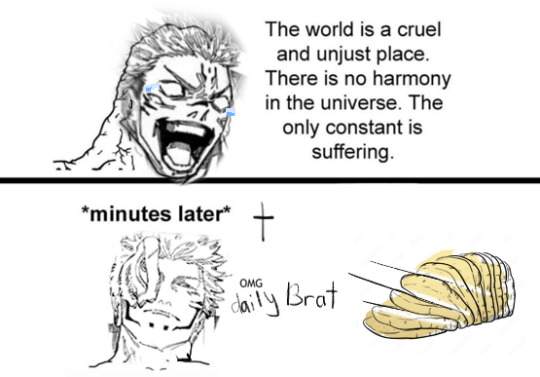
#jjk meta#ryomen sukuna#jujutsu kaisen#jujutsu kaisen theory#jujutsu kaisen analysis#jjk#jujutsu kaisne spoiler#yuji itadori#jjk manga#manga#anime#jjk spoiler#jjk analysis#jjk 255#jjk 256#sukuita
123 notes
·
View notes
Text
yuji and kenjaku? or jin and kenjaku?
By now we've reached chapter 244, Jjk is becoming more and more unpredictable, but I suspect that when we know who Kenjaku really is and why he and Yuji are close, the answer might be about what Wasuke wanted to say to Yuji just before leaving him forever.
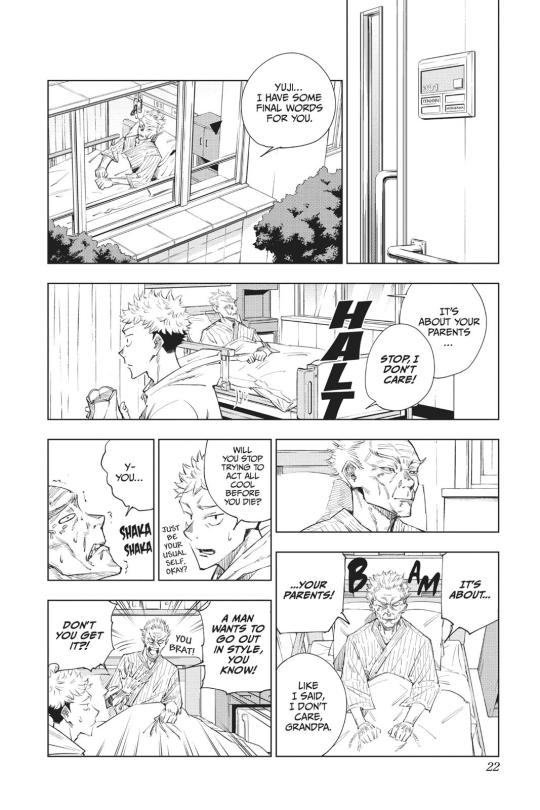
What reinforces this thought of mine is the fact that in chapter 143 Wasuke seemed to know that if Jin continued to be near the person who took Kaori's body, he would be in danger. Also, this chapter informs us that Jin was apparently aware that Kaori was not "Kaori", because Wasuke says "But her death was-" By her death he meant -> the death of the real Kaori. This is probably exactly why Wasuke thinks his son is in danger. So we are certain that Kaori is theoretically dead, but... here she is. It is obvious that anyone, especially a parent like Wasuke who is aware that that woman cannot be Kaori, would not want his son to be with a dangerous impostor.
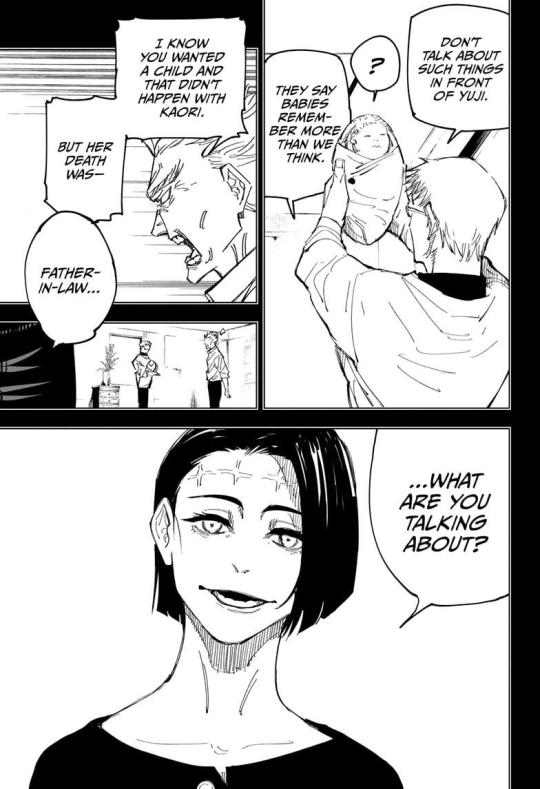
Jin doesn't seem to care much and it's very strange… and creepy. When Wasuke begins to speak, Jin interrupts him, making it clear that he has no intention of listening to words that accuse Kaori.I've always wondered what connection there is between Yuji and Kenjaku, but perhaps the real question is: what connection is there between Jin and Kenjaku?
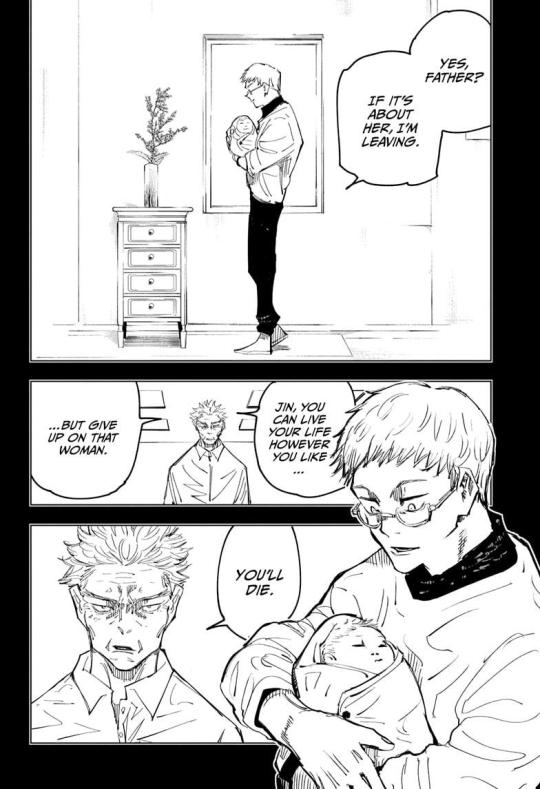
And... what if it all started from the two of them?
#reasoning#sometimes I think too much ahah#there are too many mysteries in this manga#jujutsu kaisen#jjk#jjk theory#itadori yuji#itadori jin#itadori kaori#kenjaku#yuji itadori#jjk kenjaku#itadori yuuji#yuuji itadori#jujutsu kaisen manga#jujutsu kaisen theory#kaori itadori#jin itadori#itadori wasuke#jjk manga
179 notes
·
View notes
Text
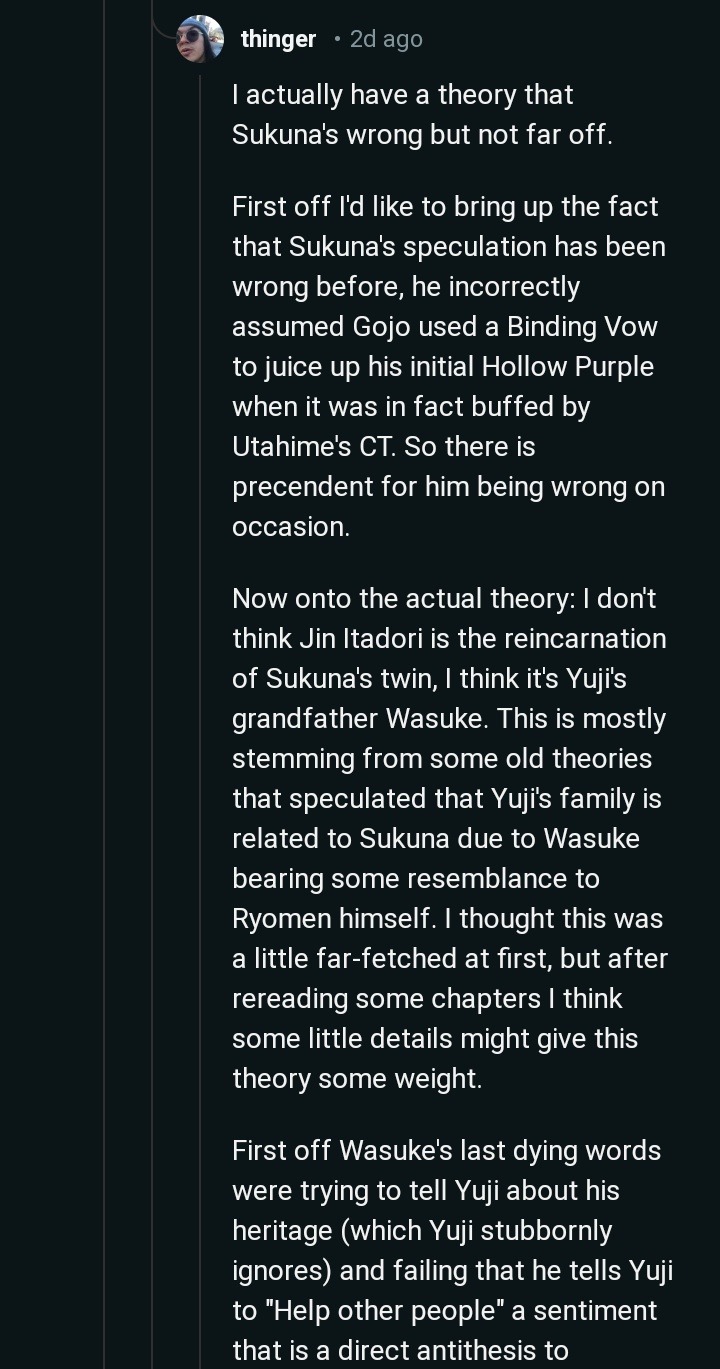
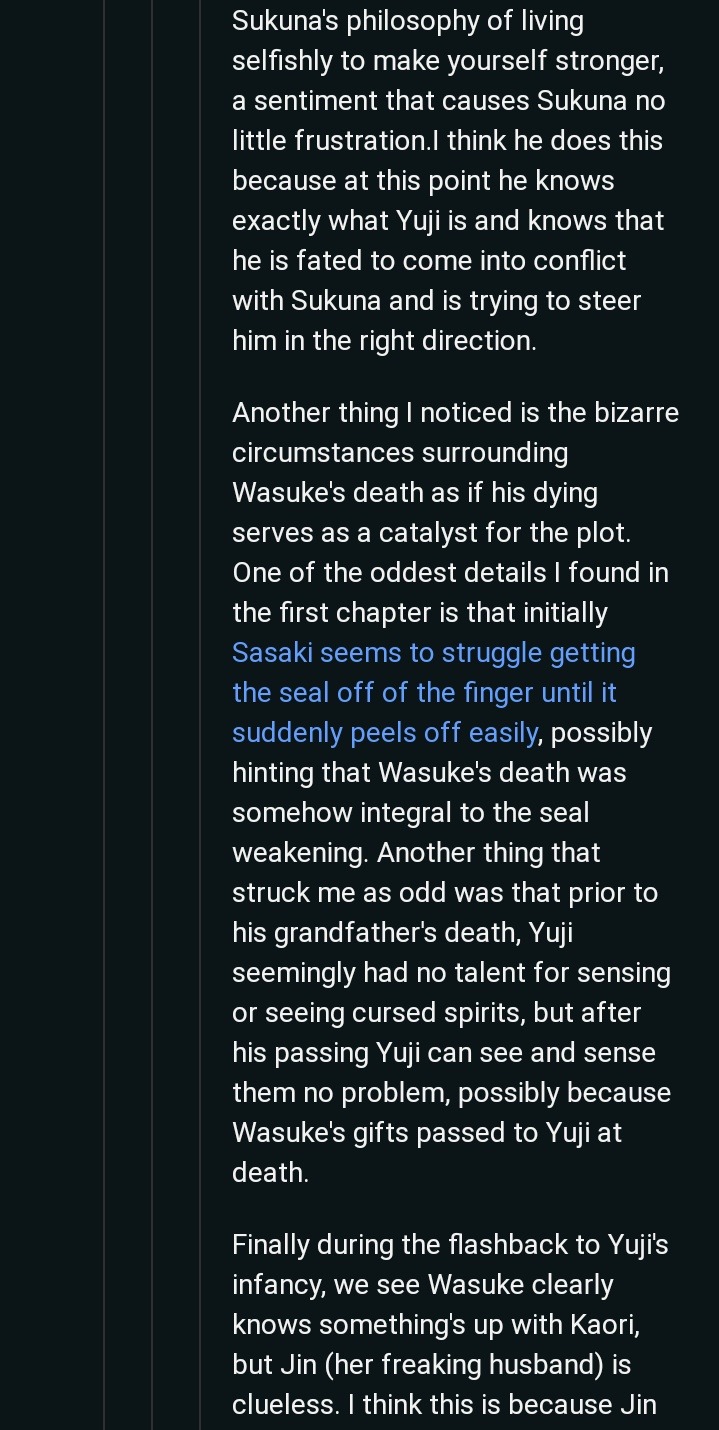
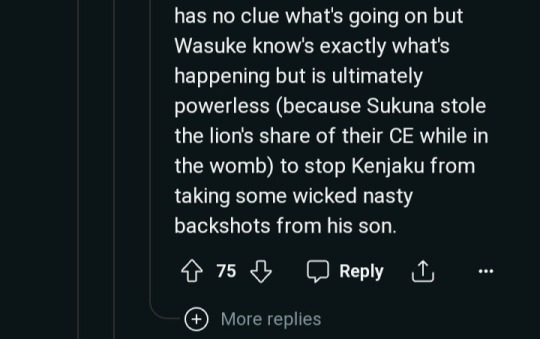
some foods for thoughts, ain't they?
79 notes
·
View notes
Text
Maki has the potential to be the ultimate counter to Sukuna right now. Here's how she might play a big role in his defeat.
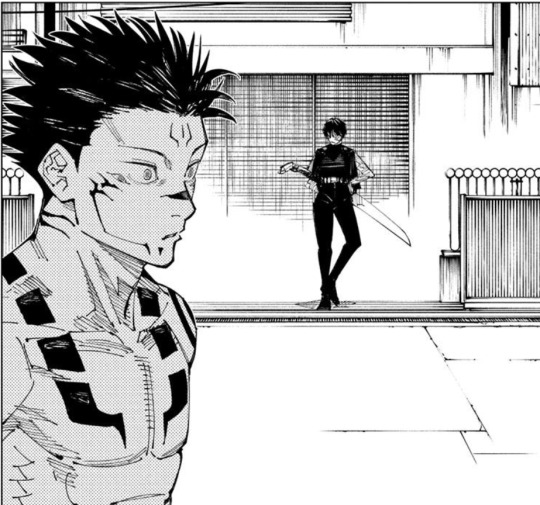
For ages, I thought Maki was a terrible match up for Sukuna, but after rereading some of the manga, I realised how she could counter almost all of his abilities if the good guys played their card right.
How she can seriously hurt Sukuna:
Sukunas reversed curse technique is so broken that there is almost no way to really damage him, he has more cursed energy than anyone else in the verse and since he was refreshed by incarnating the chances of him running out are pretty tiny.
But there is one thing we know reversed curse technique can't heal. Damage to the soul

It's stated twice in the manga that Sukuna can't heal Mahitos Idle Transfiguration, a technique that attacks the soul directly.
And Maki just so happens to have a weapon that can cut the soul of its target, in fact this is even pointed out in the manga.

Since Gege points this out himself, I feel like there is some real grounds to say Maki might be able to really damage Sukuna.
How Maki would survive Dismantle and Cleave.
Other than the fact we see characters like Kusakabe, Higaruma and Yuji taking hits from dismantle and cleave, (all characters that should be way less durable than Maki).
I think there's solid evidence that Maki could even doge these attacks before they hit her, even though the slashes are invisible we see Mahoraga deflect one, meaning they do travel to hit their target and could be dodged.
How would Maki see them coming?
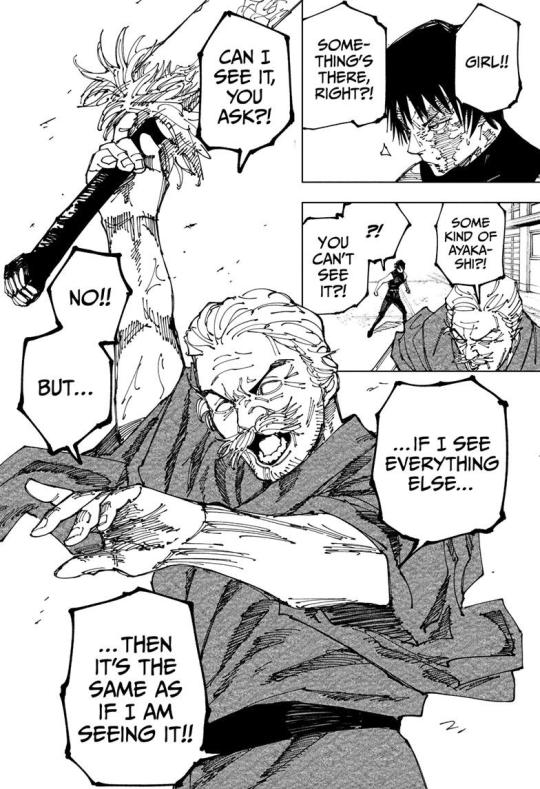
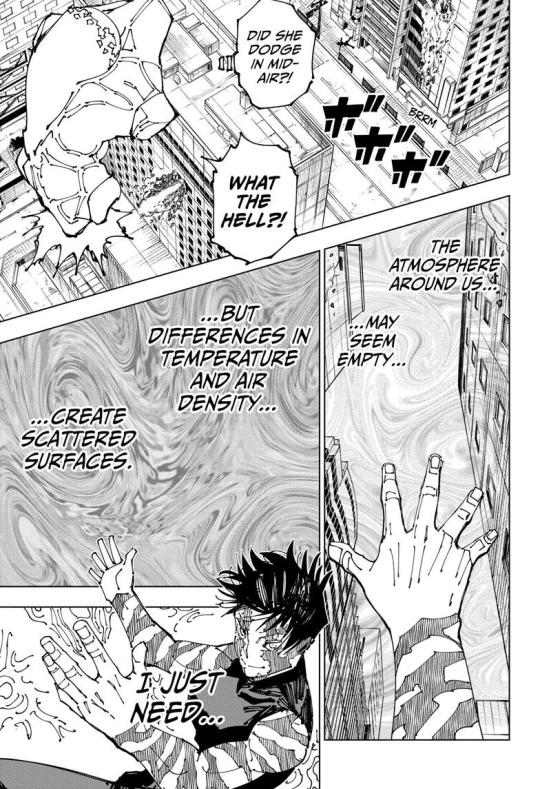
It's shown that characters like Maki, Toji and Daido can see invisible things by seeing how they affect the space around them, so her seeing Sukunas slashes makes sense.
How would she survive Sukunas domain?
Since Sukunas domain target inanimate objects with no cursed energy as well as sorcerer's, it's one of the few that Maki isn't immune too, so how would she survive?
Well there is one thing we've seen able to dispel domain expansions and can be used freely only by someone like Maki.
The Inverted Spear of Heaven!
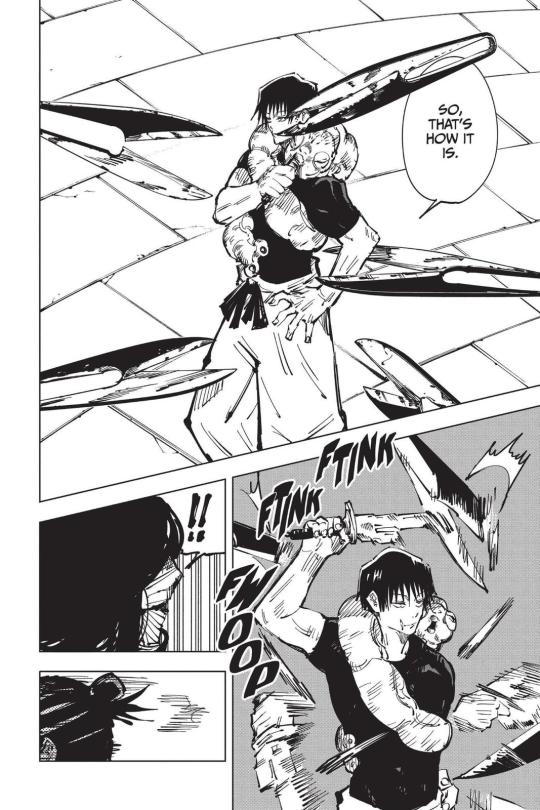
Toji dispels this cursed spirit's innate domain by bringing out the Inverted Spear.
bUt goJO DesTrOyeD iT
No, Tengen says Gojo either sealed it or destroyed it, we don't know which
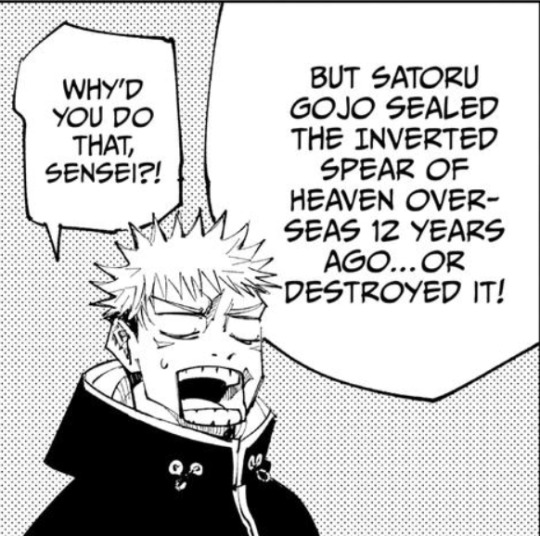
While Gojo definitely wouldn't want the higher ups to know about a weapon that could counter him, I don't think he would destroy something as unique and valuable as the spear. He probably hid it somewhere, only he could get it.

In the time between Gojo getting unsealed and his fight with Sukuna, I think it's fully possible he would retrieve the spear and give it to Maki, seeing how she had awakened and knowing how well Toji used it.
If he did give it to her, and Sukuna tries to open his domain, it would collapse as long as the blade is exposed to it.
Finally, how would she get close enough to strike?
As much as I love Maki, she is not on Sukuna's level of speed and in a one on one fight she would never get close enough to hit him, but if he was distracted by a bigger target, then she could land a sneak attack since she's basically undetectable.
And who's a better distraction then Yuta Okkotsu, he is constantly described as having overwhelming cursed energy and with Rika manifested that's only going to be more extreme.
Sukuna doesn't have the Six Eyes and remember Gojo was the only person to ever notice Toji when he was standing behind him, I think that while Yuta holds off Sukuna there is a perfect opportunity for Maki to land a clean hit with the Soul Split Katana.
Maki is the only heavy hitter that's been completely absent from the Sukuna fight so far, and I really hope Gege uses her to her full potential here, since he loves Toji comparisons a parallel to this shot would be awesome to see
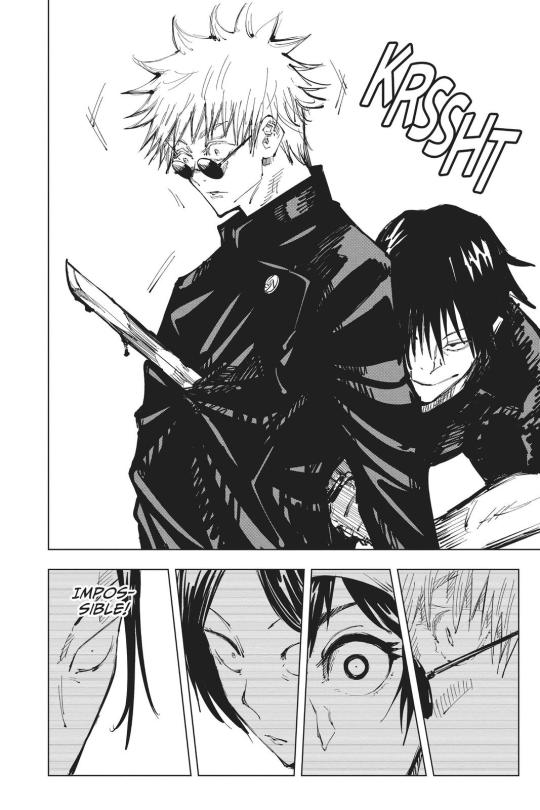
I don't think Maki will be the one to defeat Sukuna, that has to be Yuji, but I hope she gets to at least do some serious damage that lets Yuji have an actual fighting chance.
Of course Gege could pull some bullshit "I had a perfect counter to this from 1000 Years ago" again, but I hope he doesn't
#jujutsu kaisen#jujutsu kaisen theory#jujutsu kaisen prediction#jjk#jjk theory#jjk theories#jjk maki#maki zenin#maki#jujutsu kaisen maki#jujutsu kaisen analysis#sukuna#ryomen sukuna#jujustu kaisen manga#jjk manga spoilers#jjk manga#jujutsu kaisen spoilers
127 notes
·
View notes
Text
in honour of geto's birthday, i want to talk about the fandom discourse that paints him as a mother. he definitely has a degree in motherology (with a minor in babygirlism), but i also think it’s possible that gege is genuinely using his character to say something interesting about motherhood and maternity.
this post is inspired largely in part by @virgobingo's thoughtful meta on geto and monstrous femininity, which you can find here. i want to extrapolate from the trope of monstrous femininity and extend it to monstrous motherhood. (which @virgobingo also touches on; you should really check out their meta— it's awesome!)
geto's character is immediately established in a protector capacity, which is intensely reminiscent of the tropes that mothers embody in media. his whole thing is that the strong must protect the weak; it's his core belief. his character is premised around this belief, much like the way mothers' constitutions in media are premised on the principle that they'll go to any length for their children.
we're repeatedly shown his caring side during hidden inventory— he cares for riko, he expresses concern for gojo, he even asks about kuroi after he finds out toji supposedly murdered his best friend. it's made very clear that he's an outwardly caring person with a strong sense of duty. in this way, he parallels the textual role of mothers, whose function is to care and provide above all else. the repeated emphasis on his caring nature is what directly likens him to maternity, whose characteristic trait is tender love and care.
he also houses curses in his body. he unleashes them from inside of him, almost like children leaving the womb. these curses obey him and operate according to his will in a very parent/child dynamic. they are powerful, but they can only do what he tells them to do. he uses them to fulfil his duty according to his core belief: to protect the weak.
when he defects, his ideology fundamentally does not change— it just inverts. instead of the strong protecting the weak (the weak necessitating their strength because they can't protect themselves), now the strong must be protected from the weak (because the weak leech the strength from the strong, therefore rendering them weak).
nothing really changes; he still cares —fiercely— it's just in the opposite direction. he takes the tropes associated with motherhood and inverts them— he'll do anything to protect those under his care, including killing, because he wholeheartedly believes in fulfilling his duty as a protector (like a mother). his unwavering conviction and willingness to die for his beliefs (which are directly about those he's protecting) is the most flagrantly maternal thing about him.
toji's worm calls him "mommy" and it's not wrong. he takes in daughters and becomes the central figure of his "family"; his emphasis on family throughout the story (even as a youth) also speaks to his maternity, as mothers are often written as the binding emotional centres of familial structures.
after he dies, his body is taken over by someone who is Iiterally a mother. he embodies monstrous motherhood during life and after death, leading us to the question of what gege is trying to say about all of this. is caring too much a bad thing? does caring in one way open the door to caring in another? what happens when a mother's love, supposedly strong enough to lift fallen trees off their children, goes in the “wrong” direction?
there's also the fact that geto is male. i think gege is also asking us to reckon with how the tropes of maternity have been confined to women, showing us that these intense convictions and the depth of care attributed to mothers can apply to anyone, even (especially) if they are distinctly masculine. in doing this, he's also expanding the conceptual definition of motherhood, suggesting that mothers can exist beyond their provident care and one-dimensional duty to their beloveds.
geto's monstrous motherhood is an explosive reclamation of agency in a trope where women have been historically limited by the categorical imposition of maternity. it seeks to disrupt not only who we consider to be mothers but also what we consider a mother to be. perhaps the monster is not the maternal figure whose love turns vicious or violent, but us, who monstrously imprisoned them in the fixed role of "mother".
#happy birthday geto suguru#my jjk meta#jjk meta#jjk#jujutsu kaisen#jujutsu kaisen meta#jujutsu kaisen analysis#geto suguru#geto#suguru#jjk geto#geto my beloved#jujutsu kaisen theory#jujutsu kaisen anime#geto analysis#geto meta#jujutsu kaisen suguru#jjk suguru#getou suguru#gege akutami#jujutsu kaisen season 2#jujutsu geto#夏油傑生誕祭2024#geto angst#miminana#kenjaku#jjk anime#jjk thoughts#jujutsu kaisen thoughts#jjk analysis
93 notes
·
View notes
Text
the anti-climatic end of Gojo's character arc
(manga spoilers!!!)
(what I say here is unrelated to the fact that I am a major Gojo death denier lmao, i’m saying this considering story and character arc)
It was very obvious to me that Gojo would lose the fight with Sukuna. if he won, it would make no sense for the story and the actual protagonist. Everyone kept saying how 'if Gojo was here, there would be no problem' and how Gojo would win, etc.
But I think Gojo dying would be a waste of a character and an anti-climatic way to end his story. While he may not be a protagonist of JJK, there is still a lot about Gojo’s character and his story in the manga, so ending it like that, cut in half in a fight with Sukuna, is just boring to me.
It would have been much more interesting for his character and his growth if he somehow got brought back (Shoko, I’m counting on you), but lost his power.
Gojo was born with powers of a god and he knew it from the beginning. The balance of the world has been changed when he was born, and all that stuff that suggests he was born to be the strongest.
It’s been hinted a few times how much this strength isolated him from others. He considers Geto his ‘one and only friend ever’, because Gojo recognized Geto as someone equally powerful. Also, at the same time, Geto recognized him as his best friend and not only ‘the strongest’.
There’s also the fact that he became a teacher to create a generation of jujutsu sorcerers who could not only be on his level, but also surpass him, and in that way he wouldn’t feel so lonely anymore.
But if that was all, Gojo surviving and losing powers wouldn’t be a challenge at all.
Besides the loneliness he experiences due to his immense power, loneliness that bothers him, Gojo is also obsessed with the feeling of being the strongest. You can see in it the Hidden Inventory arc, in his second fight against Toji Fushiguro. On the brink of death, he taught himself the Reversed Cursed Technique and survived. In the same scene he mentions how he doesn’t feel mad at anyone or sad, because reaching this new state, expanding what he can do with his powers, feels so right.
It’s like what Geto said - are you the strongest because you’re Satoru Gojo, or are you him because you’re the strongest? The godly strength and powers identify Gojo and at the same time make him feel lonely.
He doesn’t want to feel lonely, so instead of thinking about dimming his powers, he thinks about making his students stronger.
I think Gojo surviving but losing his powers (for example, let’s say it’d be the cost of bringing him back to life) would give him what he desires, would make him just another sorcerer (with minimal/average power) or a regular human being, and therefore he wouldn’t feel so ostracized, but at the same time he’d have to learn who he is as a person without the thing that defied the name Satoru Gojo since the moment he was born.
#jujutsu kaisen#jjk#jujutsu kaisen theory#jujutsu gojo#jjk manga#jjk gojo#gege when i catch you gege#gojo satoru#jjk spoilers#jujutsu kaisen spoilers#gojo#satorugojo#jjk satoru
100 notes
·
View notes
Text
"When the day turns into night
And you’re way beyond my sight,
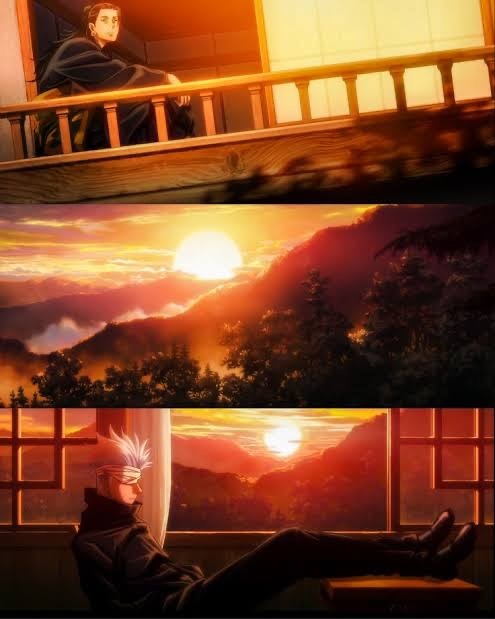
I’ll think of you, I’ll think of you.
When the night turns into day
And you still are far away,
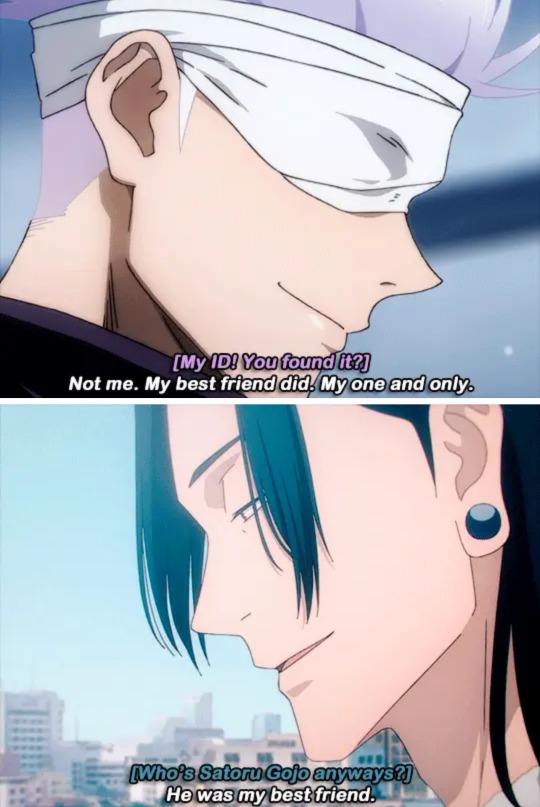
I’ll think of you, I’ll think of you.
Even when I am not here
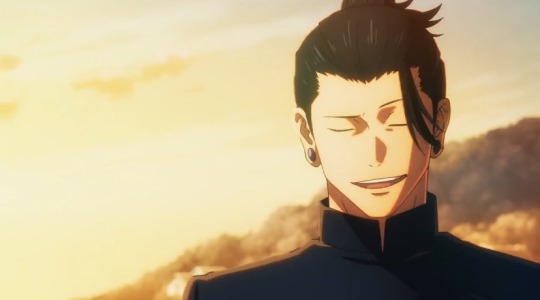
We still can be so very near

I want you to know my dear
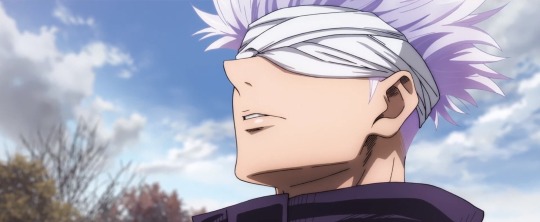
I’ll think of you."
Source: Facebook & misterrogers.org/videos/when-the-day-turns-into-night
And think of each other throughout their short lives they did.
Headcannon, analysis and theorising - more under the cut:
I’ll preface with how I’m aware there is some reaching and rambling, but there are so many interesting parallels and foreshadowing in Gege’s work that I’ll be at risk of writing my own “war and peace” with my theories and headcannon. I might be wrong as always, but I hope it makes for an interesting read even if you don’t agree! Comments and reblogs welcome!
I’ve pondered on this theme of lateness. I have another draft post on this topic, but in this scenario it illustrates the impact of riko’s death and their defeat (eventual victory for Gojo) to Toji.
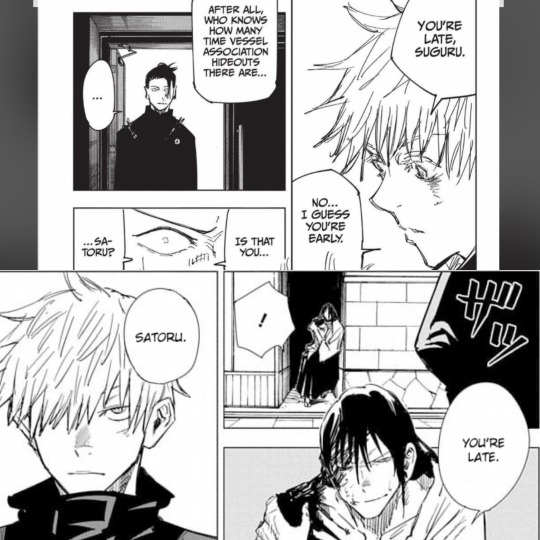
One ascended and the other descended. Arguably one saved the other, and equally debatably, they exchanged paths. However else you wish to explain it, Gojo deferred to Geto who was his moral compass, and was guided back to a sensible path. Geto did not wish to be saved by the time Gojo intervened, but ultimately was saved from himself before he could get too twisted.
Or, was it ultimately still a tale where Gojo was indeed too late, and despite everything he had, he could do nothing?
Nevertheless, their first defeat left them both scarred and changed.
Losing each other was something they never got over - Gojo and Geto had wounds shaped like each other.
One went off to find strength to change the world; the other went off to foster students to change the world. They pursued each other’s forte to make up for the sense of loss from their separation - trying to find completion within themselves and their world around them, but falling short of healing their emotions wounds - until they could meet the other once again to resolve their relational rupture.
Look at these two paralleling each other... papa Geto and Gojo sensei.
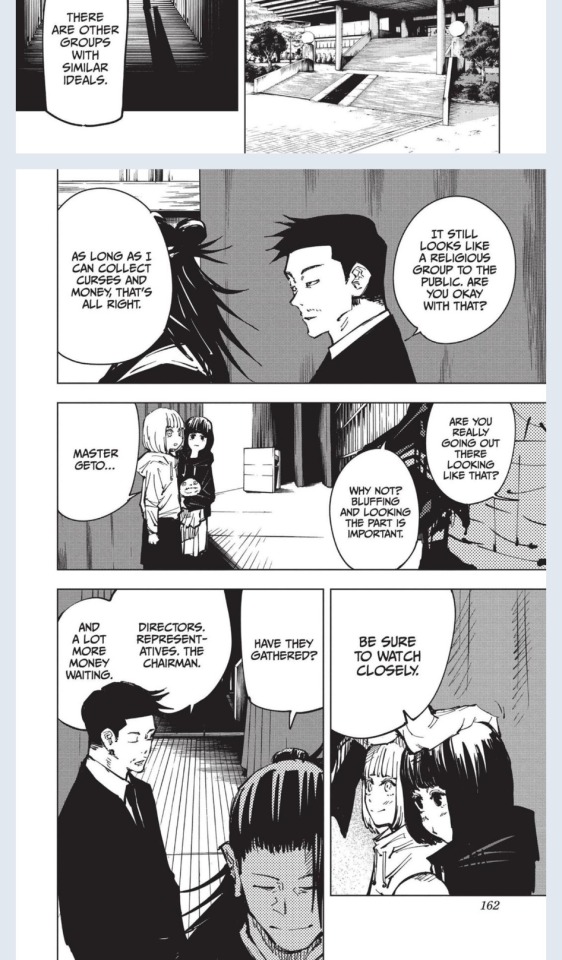
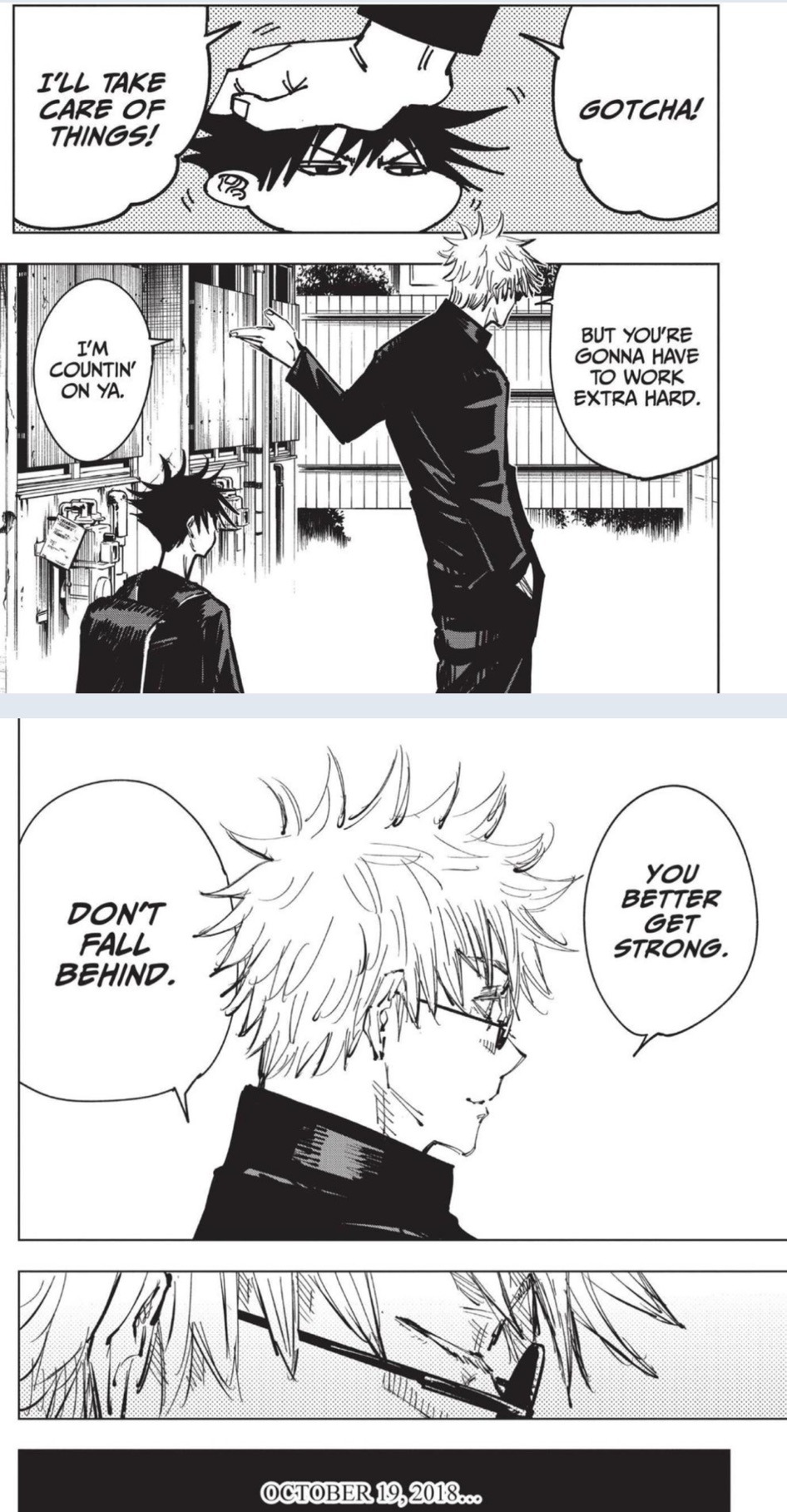
Let me start with Geto:
In this world, Geto admitted before his death that he could never smile from the bottom of his heart.
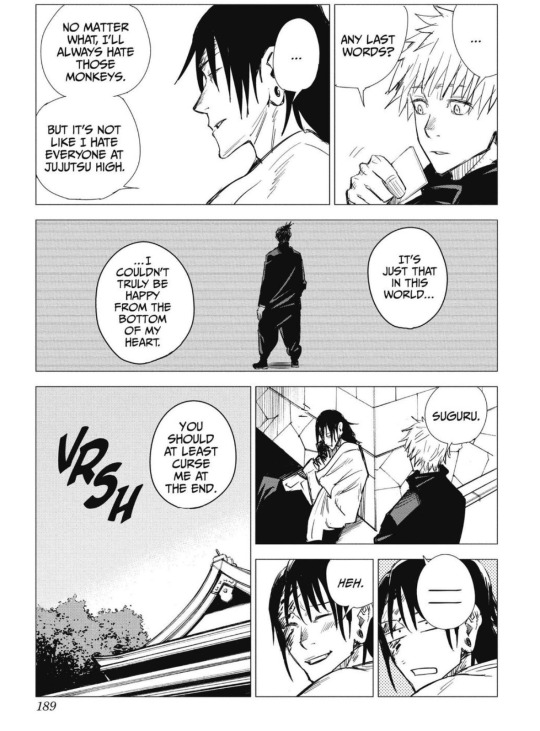
No matter how many people loved him, how much they were willing to dedicate to him by following and trusting him, Geto didn’t feel happy. We see, so touchingly, how much he was loved by his family - Mimiko, Nanako, Miguel, Larue.
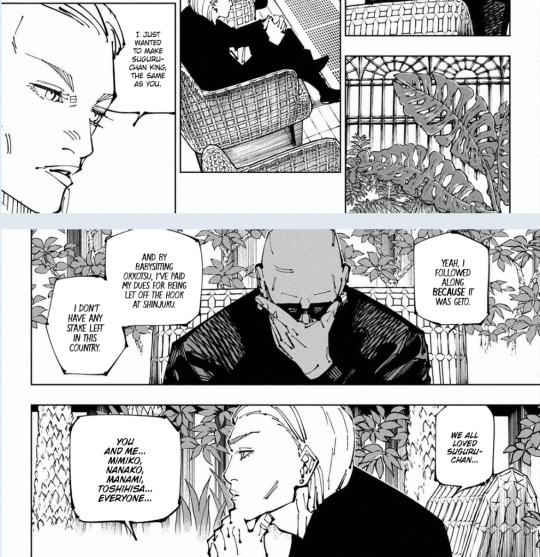
Did he ever feel loved? He certainly felt protective over them, but did he feel he mattered, besides being the one who gave them a vision?
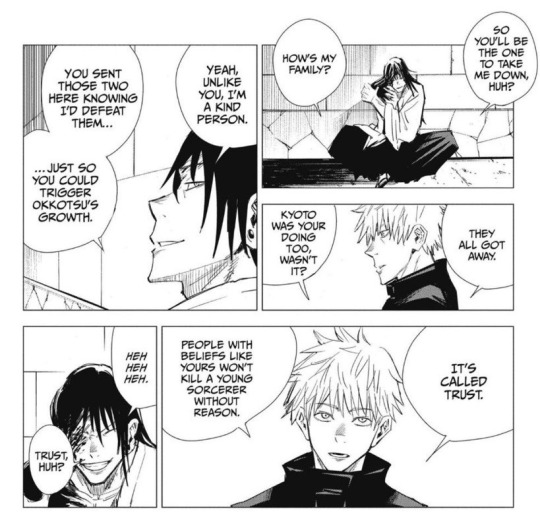
It doesn’t seem so. Geto seemed to think little of himself, for someone prideful and egotistical (by his own definition). He lost a sense of security in himself and value following Gojo’s distancing of himself too. Untethered, he probably felt like he was free falling.
I theorise that his desire for a better world was born out of a desire for redemption, and it was a curse to avenge the loss of his youth as well as those who had died under his care - Riko, “Gojo” (pre-enlightenment), and Haibara. Geto had lost himself within a spiral of depression and self-affirmation following the Toji incident.
I sense that his search for meaning and purpose through the protection of others was always an act of self-sacrifice that was exhausting and defeating for him. Just like the consumption of curses. Like a futile attempt at regaining control when he was slowly losing it even more - getting further and further away from what he really needed - to heal from his emotional wounds.
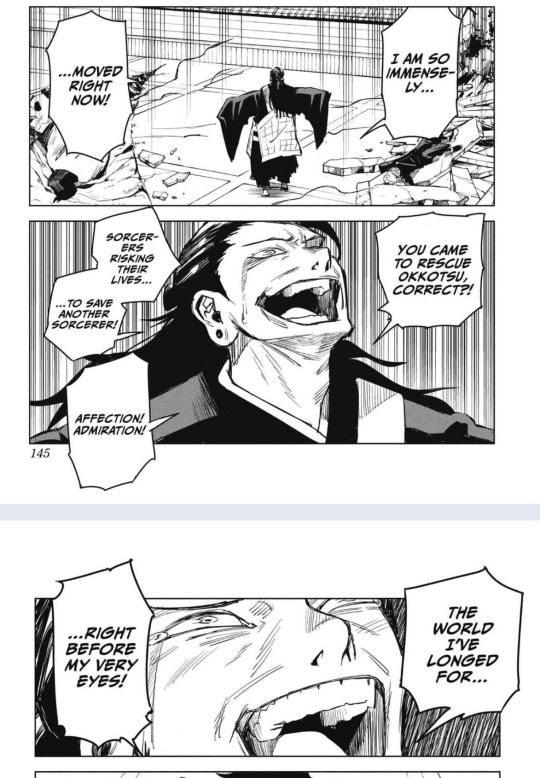
What he needed to resolve was learning that he was loved within the world; that he had a place and belonging there. It didn’t have to be about him being a protector or making a difference. When he was feeling balanced from within (secure), existing in harmony could become possible. The rest could then fall into place.
But how could Geto have faith in the universe, after the system fails them all, his best friend now finds meaning in acting alone (being protective in his own way), he learns that riko’s death/sacrifice was inconsequential, and that his fellow peers would just keep dying if he continued powerlessly chugging on. He began to believe he can only rely on himself in a world separate from jujutsu high.
The only time he can remember feeling safe or having equilibrium was in his youth beside his best friend, Gojo. The primary source of his wound was losing Gojo and the disillusionment of their defeat was not repairable.
For Geto, despite chasing his goals to the best of his ability, he could not smile authentically for all these years. The world that was presented to him felt cruel; like a curse stuck on vengeance and justice, he kept burying himself with lies that he used to avoid facing the inevitable truth that this could only end in one way. It began and will end with Gojo.
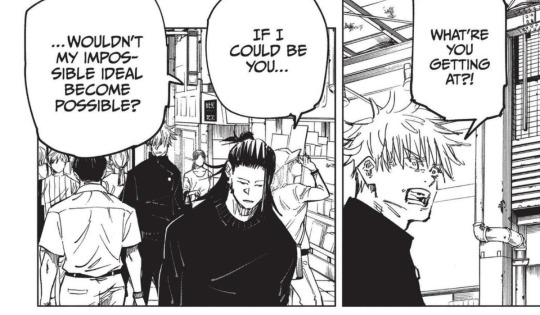
He could not replace what Gojo was to him, and the strength he may have envied to fulfil his goal, was a constant reminder of what he had lost - the trust and understanding of someone. His vision of clarity had become costly and darkened as time passed. To gain more power meant he’d become increasingly twisted. Knowing he was on borrowed time, that what he was doing was wrong, that it could only end one way - to Gojo’s hand.
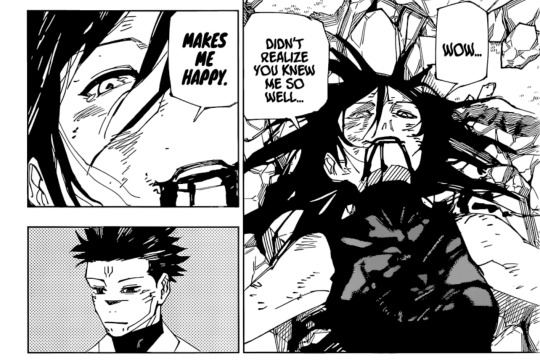
Did Geto, like Yorozu, need to be seen too? Was this the validation he found / sought - to be witnessed? I honestly don’t know, but whatever Gojo and Geto shared, it was more reciprocal than Sukuna and Yorozu. I do wish Geto was more honest with Gojo, but I think it was enough in itself to yield completely to Gojo and accept his end.
Geto had a Gojo-shaped wound that Gojo mercifully filled upon his last moments - showing him unconditional love and regard despite the changes between them.
We are kept out of the last words Gojo delivered, but we see that: He was recognised by the one who had truly mattered to him the most - the one whom he loved, and thought he had lost. He smiled sincerely at the very end.
Geto was shown to shed not one but two tears in Gojo’s afterlife scene. How moved must he have been to receive the regard and love from his best friend? Despite the lack of honest insight from Geto (Gege, you’re so stingy with inner narratives), it seems rather clear that there is something there that only Gojo can ease for him.
As for Gojo:
In his death dream / afterlife scene, Gojo was shown to express to Geto: If you were there, I probably would’ve been satisfied. It was received as loving, as Geto shed tears to this, and we know Gojo deflects from emotions by abruptly changing topics when he gets a bit heavy.
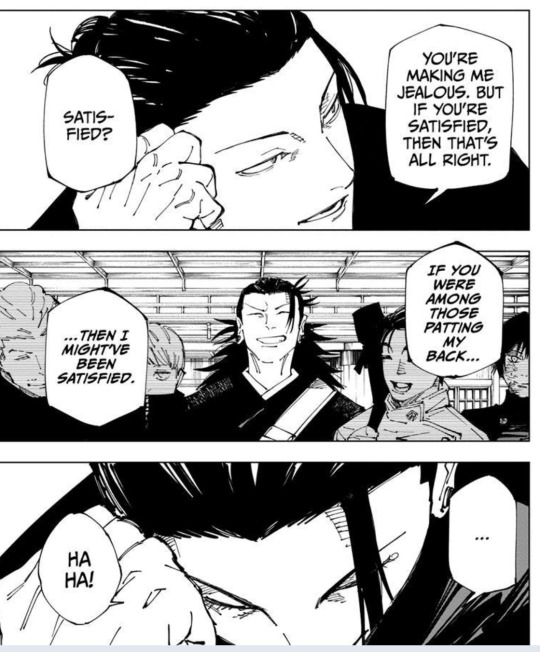
Gojo also describes how, no matter how many people adored him, he felt a distance between them; although he didn’t feel lonely, he could not feel understood in all these years as the strongest.
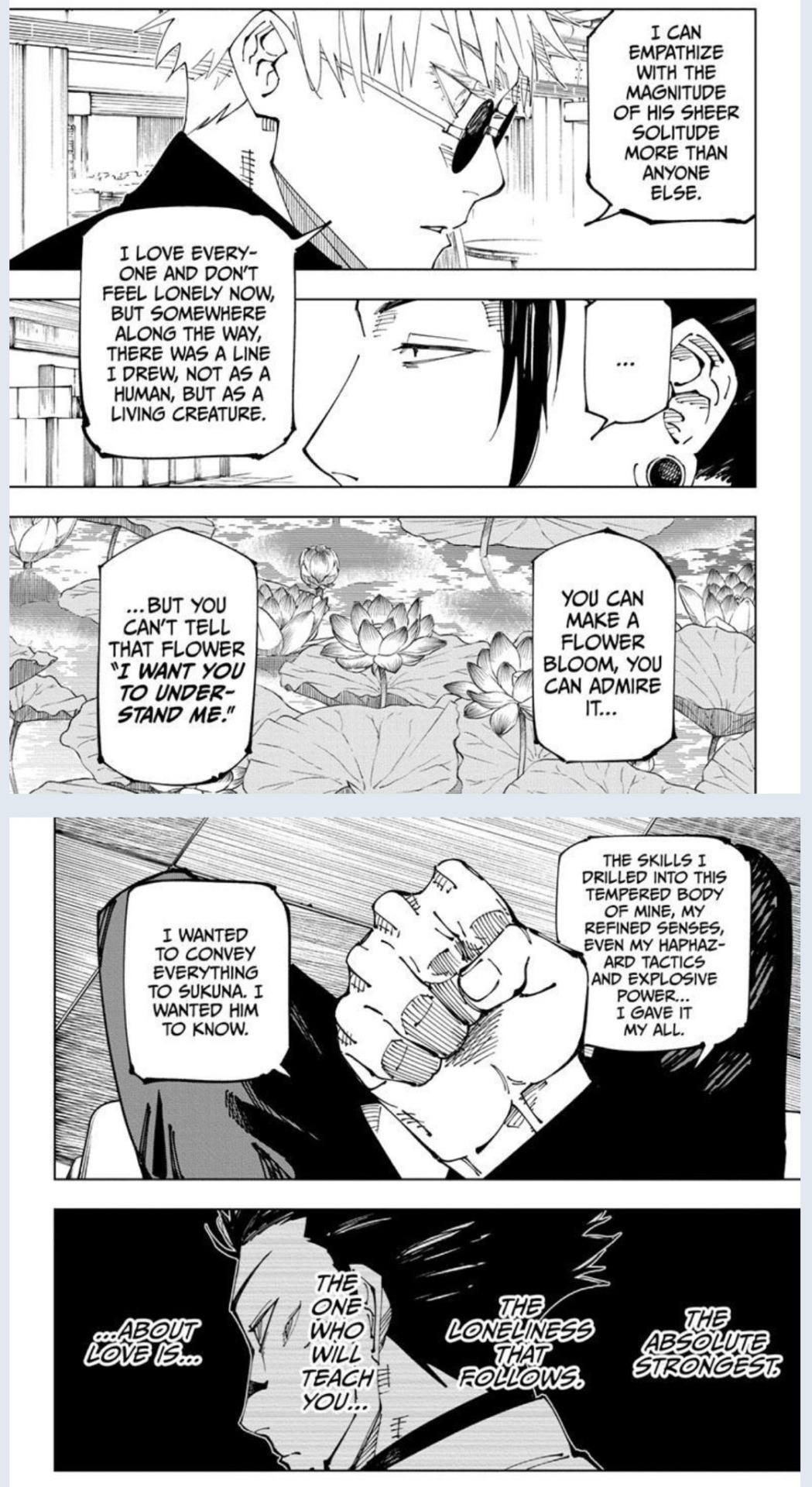
The line was drawn even more following his enlightenment, and his only memory of connection was with Geto, who had modelled a way for him to connect with those weaker than him and not see them like feeble dirt beneath his feet (as Hajime did) or pursue power like Sukuna did without caring about “worthless” love.
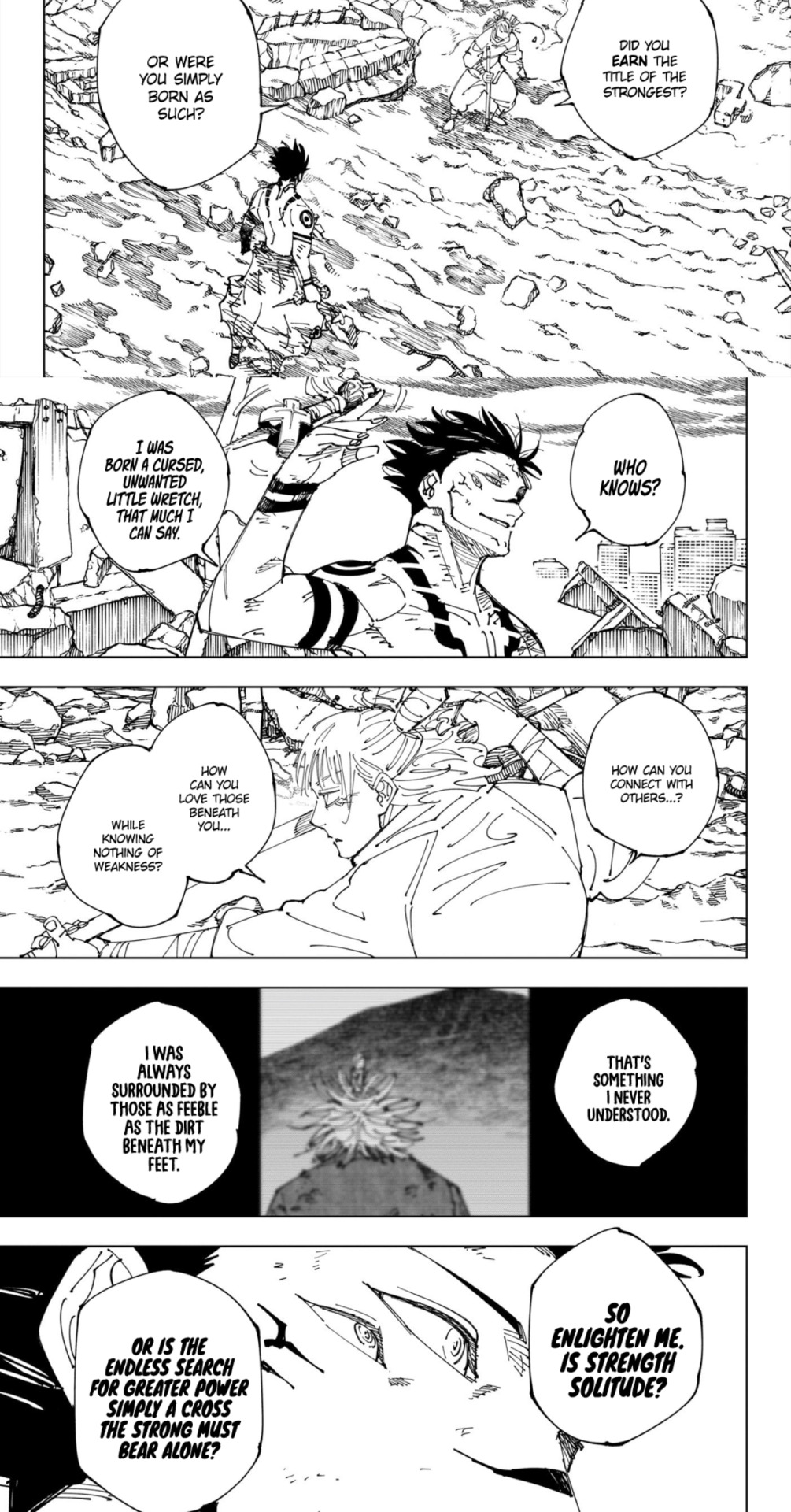

His main reason for being a teacher was also Geto. I headcannon/theorise that it wouldn’t have been the first time Gojo missed him, imagined “what would Geto do?” or saw Geto in his students in those 10+ years. What could he do differently?
Through the impact of Geto’s loss and the power of their love within their friendship, Gojo was compelled to think about others - whether he wished to prevent it from happening again, to reform the jujutsu world, to make room for Geto to potentially return (pre-jjk 0), or to simply understand his students... Gojo stretched himself to carry the emotional and mental load that was almost exclusively Geto’s role in their friendship.
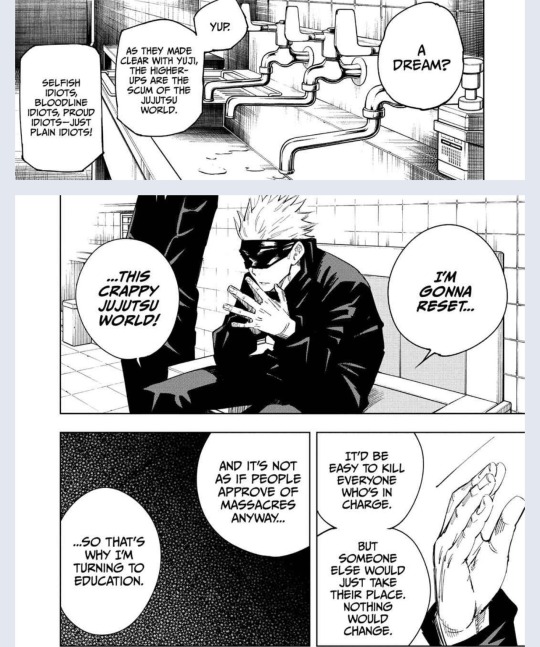
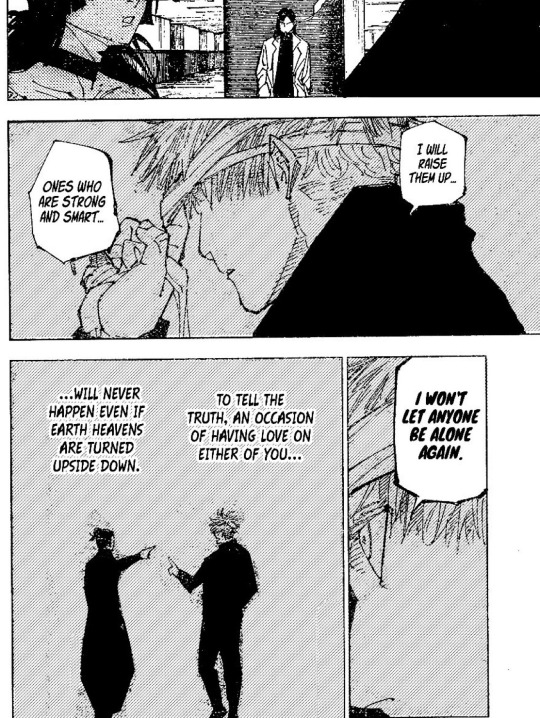
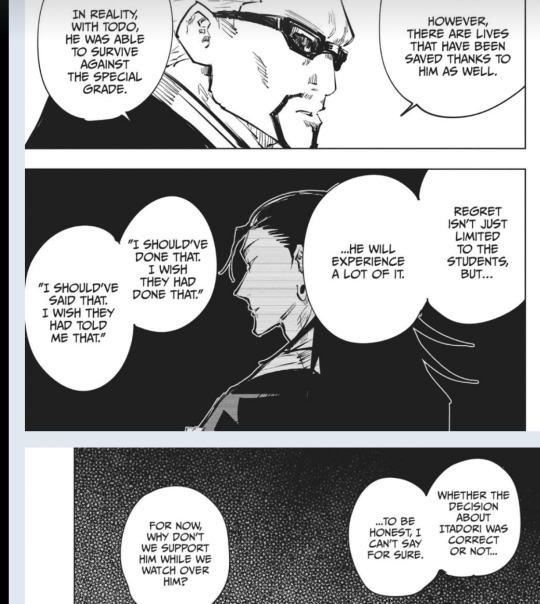
Gojo was never the most nurturing type, but he did his very best - to advise, demonstrate, and protect the youth of these students. Giving them their own blue spring was also an ode to what he shared with Geto. Despite healing a lot and making room for others, Gojo had a Geto-shaped would that only Geto could fill.
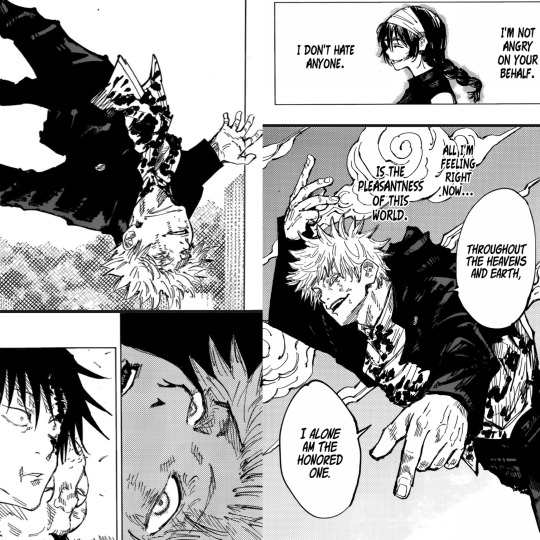
What Gojo needed to resolve was to learn to love others - even moreso following his enlightenment in the manner in which he did after Toji - that he did not have to be isolated and alone, that true connection (love) exists and was worthwhile.
Meaning and purpose beyond “just getting kicks” out of being the strongest or wielding his skills beyond self-fulfilment - were all possible - but Gojo only had a limited canvas to work from - it was mostly Geto’s palette that he expanded upon. That he didn’t want to repeat whatever mistakes either of them made if possible.
His main forte was being a skilled sorcerer. This was his primary focus still, because this was just in his nature. Gojo was practically bestowed with the assets for this role. Nobody can blame him for being greedy and coveting more (love/connection he once knew) or attempting more (influencing a new generation). Gojo was meant to be human with all his flaws and thankfully, he kept his humanity.
He ultimately tried to reach and connect to Sukuna - a potential peer whom he could “converse” with, but they were too different. He fulfilled a need to showcase his skill and philosophy to his students - alongside his own personal desire to “go all out” and die gloriously-victorious through giving it his all.
He found the connection he needed right upon his death; meeting Geto and his friends without the need for an encounter at death’s door with Sukuna - unlike Jogo and Hajime who spent their last moments with Sukuna in a dialogue. Gojo didn’t need to talk with Sukuna. They could not understand each other; not when Sukuna did not know real love - even Yorozu did not think so.
To know love is to long for it enough to recognise it.
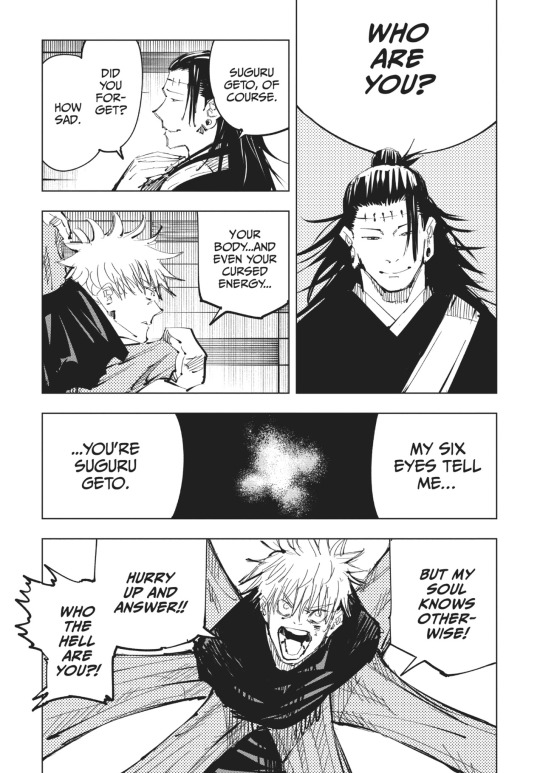
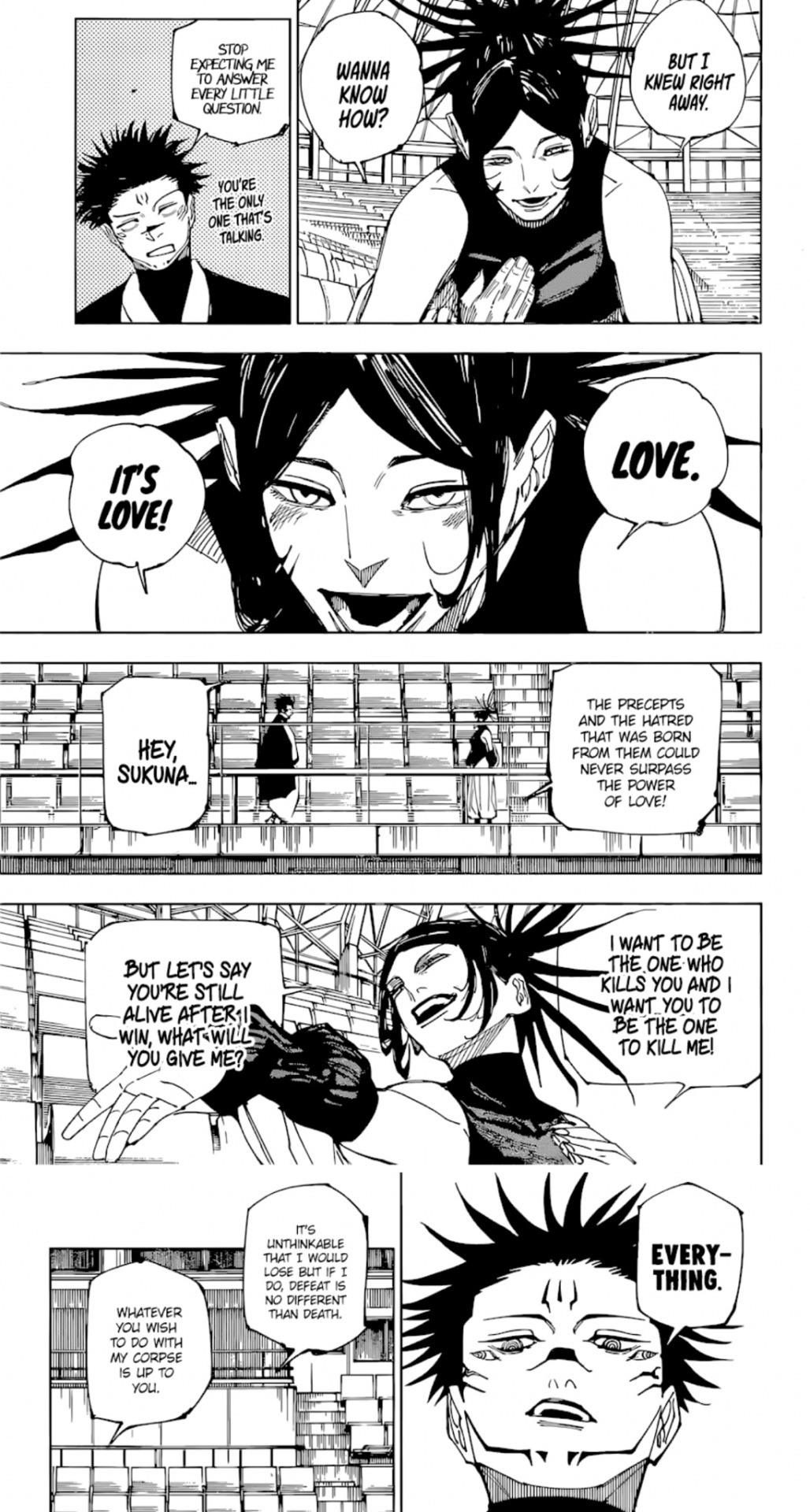
Since Gojo could not share with Sukuna what he wanted to teach (about love) he was able to tell and share it with the only person he knew who could understand - Geto. Even if Nanami and Haibara didn’t, Geto did.

It’s enough for them, isn’t it?
And it’s enough for us to know their legacy continues. It is so heartwarming to see Gojo’s students and members of Geto’s family being there too - all fighting for their own reasons - to defend and / or in honour of their memory.
#satosugu#stsg#jujutsu kaisen#gojo satoru#jjk analysis#jjk meta#jjk spoilers#jjk#geto suguru#jujutsu kaisen headcanons#jujutsu kaisen meta#jujutsu kaisen analysis#jujutsu kaisen theory#satoru suguru#goge gego#jujutsu kaisen theories#jujutsu kaisen manga#jujutsu kaisen anime#satosugu brainrot#jjk theory#satosugu headcanon#jujutsu kaisen headcannon#jjk headcanons#gojo satoru analysis#geto suguru analysis#satosugu angst#jjk stsg#stsg angst#jjk character analysis#satosugu analysis
56 notes
·
View notes
Text

What if Nobara...👁️👁️✨
JJK manga theory
#jjk manga#jjk spoilers#jjk art#jjk fanart#jujutsu kaisen fanart#nobara#nobara fanart#jujutsu nobara#jjk nobara#nobara kugisaki#jujutsu kaisen nobara#jujutsu kaisen theory#jjk theory#six eyes
23 notes
·
View notes
Text
Sukuna's Death or Immortality? (Theory)
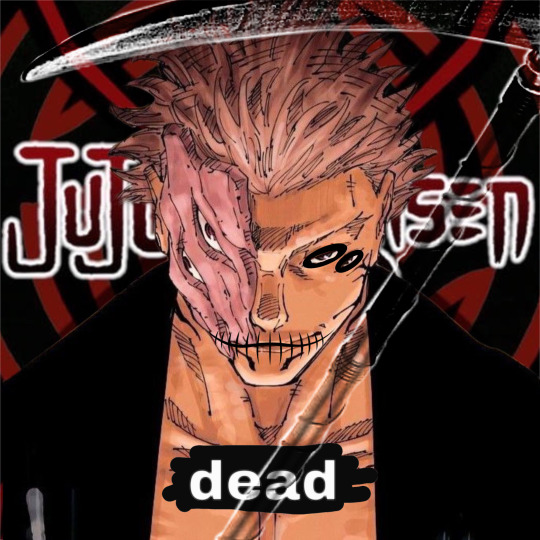
I don't think Sukuna will die so easily. They say he's so strong, almost immortal. No one could take him down back then; the other sorcerers tried to fight Sukuna together, but in the end, they failed. Maybe history will repeat itself?
And even if Sukuna loses eventually, he'll probably continue to live on for thousands more years or so because, I mean, the guy's not really human; demons can't really die. Sukuna was supposedly defeated once before, but he still lived on until he was revived by a boy named Yuji.
And we haven't even seen Sukuna's other powers yet; the guy deliberately hides the other powers he possesses, and what about his trident staff? We haven't seen that in action either. Maybe it'll come into play soon.

#anime#anime and manga#animes#jujutsu kaisen#jujutsu sukuna#jujutsukaisen#manga#mangas#ryomen sukuna#ryomensukuna#Sukuna#jjk#jjk spoilers#jjkspoilers#jujutsukaisen Spoiler#jujutsu kaisen theory#jjk theory
21 notes
·
View notes
Text
The Other side and Fate
A #JujutsuKaisen theory on The Other side and Fate. This will be a continuation of my previous theory about the 9 levels of consciousness and particularly the 8th level (Storehouse consciousness.
In JJK , Gege makes use of a lot of ideas and words with Buddhist connotations. The Title for Chap 211 was 'Ripen', now the usage of this very term alludes to 'Ripening of Karma or Karmic seeds'. But what are Karmic seeds ? The Karmic seeds (Bijas) are said to be the impressions, Habits and tendencies accumulated throughout one's countless lifetimes. The Storehouse consciousness or Alaya is the repository where these Karmic seeds are stored. These seeds are the very basis or foundation of our personality, the deepest layer of our consciousness
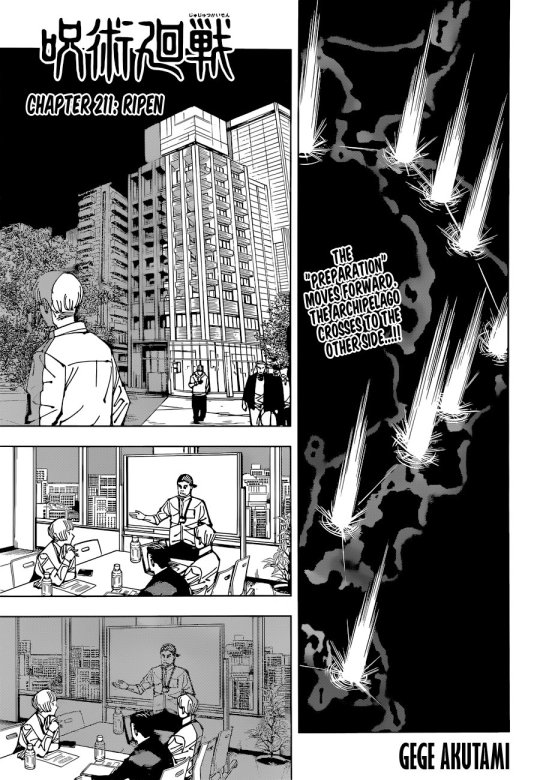
HOW our senses will perceive the world , our inherent bias all comes from the storehouse consciousness. In JJK i believe Megumi's shadow IS the storehouse consciousness, notice how Megumi can literally 'store' weapons and even himself in his shadow.
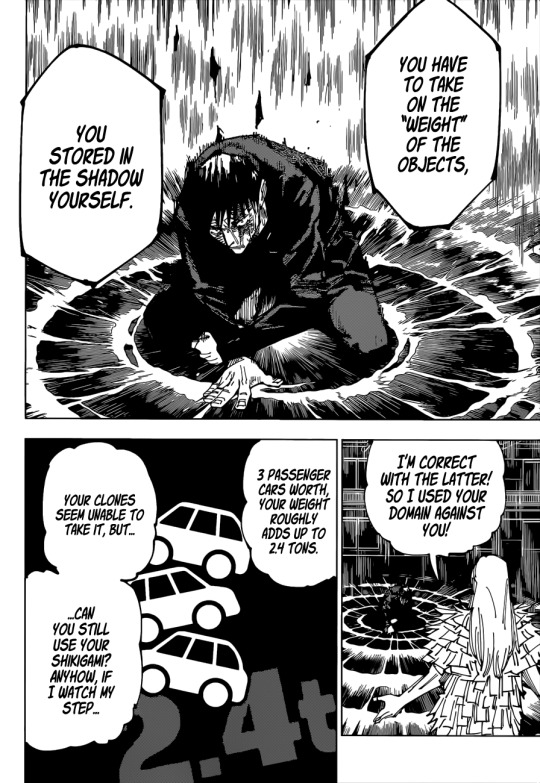

The idea of Ripening of Karma means that under the right situations and circumstances, these Karmic seeds constituting past thoughts and experiences have the potential to 'ripen' into future actions , emotions and thoughts. Even Megumi's domain name Chimera shadow 'garden' alludes to the idea of the shadows constituting the Karmic seeds
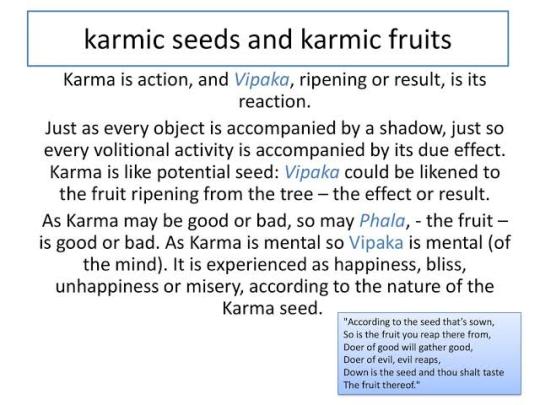
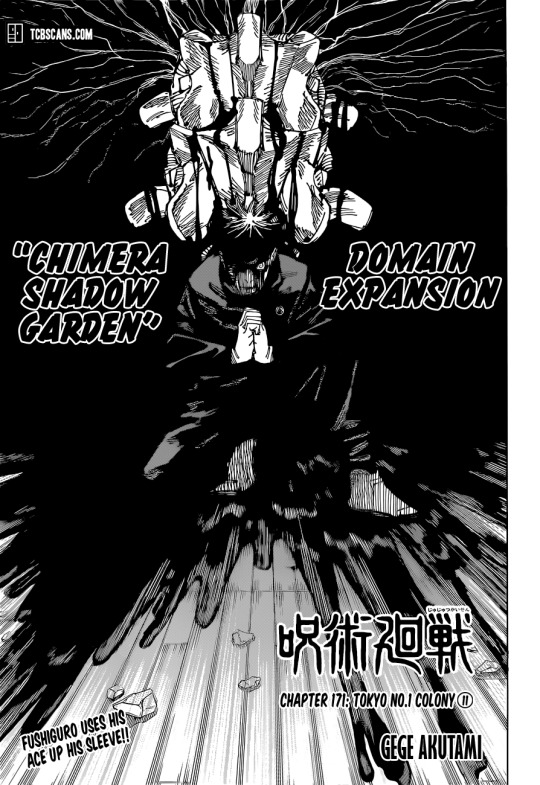
This philosophy of storehouse consciousness is analogous to the western idea of the subconscious or more accurately the 'unconscious' and in terms of depth psychology this idea of the unconscious brings us to the concept of "The Shadow". The Shadow is a part of the Model of psyche (soul) proposed by Swiss Psychiatrist Carl Jung whose works , i believe are one of Gege's primary inspirations. According to Jung the psyche is divided in 3 main parts:
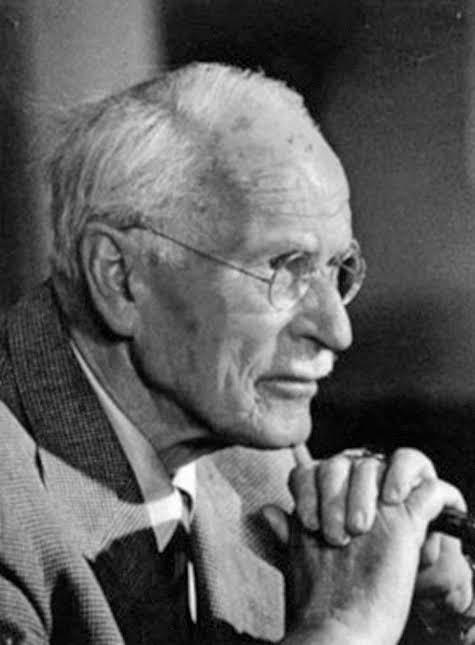
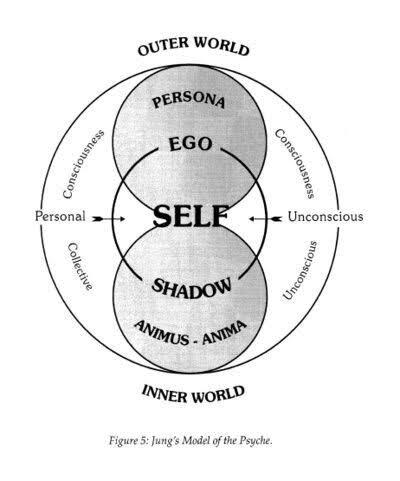
1. Persona (Ego) : It is the aspect of one's character or soul that is presented to or perceived by others or rather 'society'. The outer or assumed aspect of character, it's the mask we wear to create a bridge between our self and fulfilling societal or worldly expectations. It's the Ego we cling to.
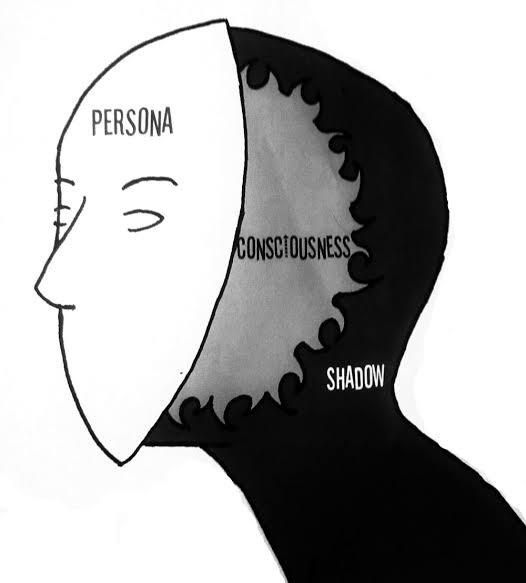
2. Personal unconscious (Shadow): The Personal Unconscious is located at the fringe of consciousness, between 2 worlds. The external or spacial world and the internal or psychic world. It refers to the information and experiences of an individual's soul that have been forgotten or repressed but continue to influence their behavior and attitudes on an unconscious level , It is also what you call the archetype of "The Shadow"
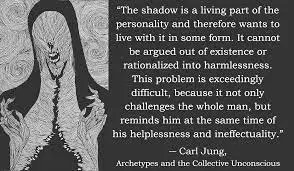
Before moving to the final part of the psyche let's look at how the persona and the shadow operate on a micro or individual level.
Every person creates an identity for themselves based around the concept of persona or ego , influenced by the information received through sensory input (First 6 levels of consciousness which i mentioned in the previous thread) and societal expectations but this is not the core of their soul, it's performative.
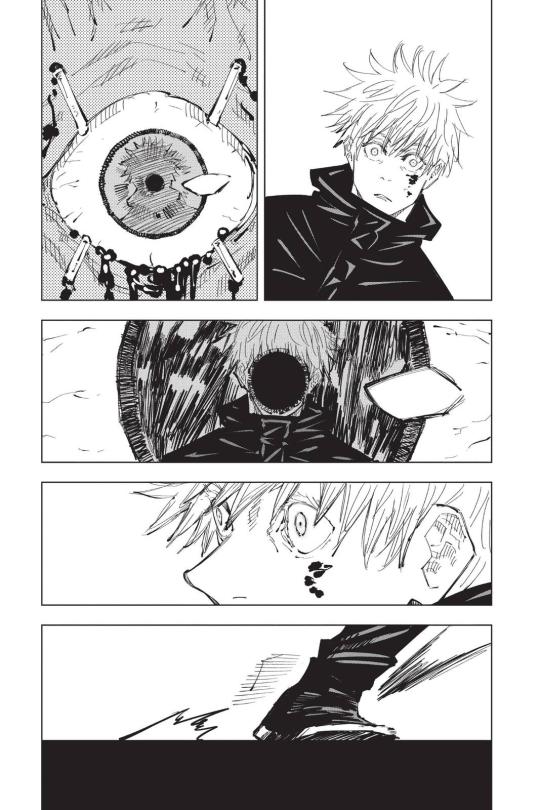
The true essence and nature of the self comes from the shadow of the karmic storehouse as mentioned above, HOW we differently perceive the same world occupied by others is caused due to the nature of our shadow but this is the part that is hidden from us, we suppress and ignore it. It's the most alive part of the soul yet is treated by an individual as if it's dead and nonexistent , this illusion of confirming with the persona and ignorance of the shadow causes a disparity within the Self
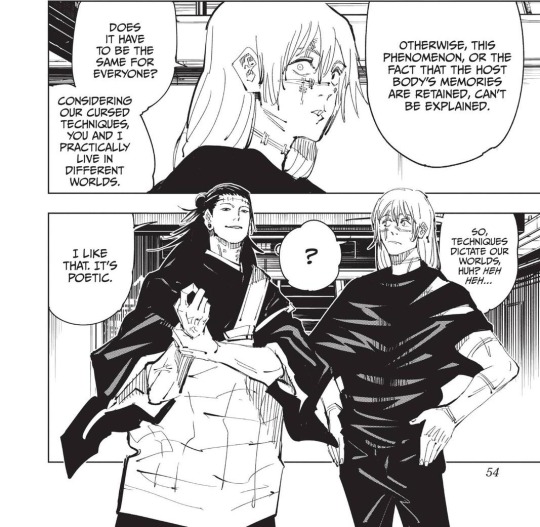
This disparity causes suffering and this very suffering is Humanity's Curse. All these traits that one considers to be negative are hidden here but we also lock away our truths which is why Jogo said "They are the Real humans" born from humanity's truth, their shadow, their karmic energy.
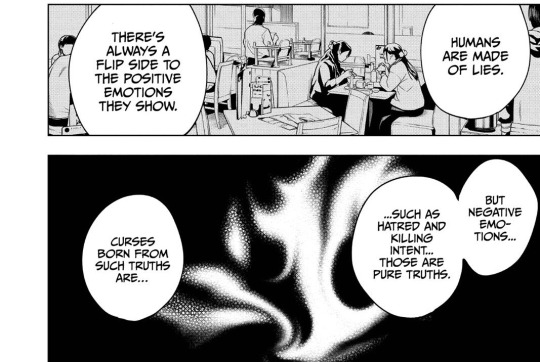
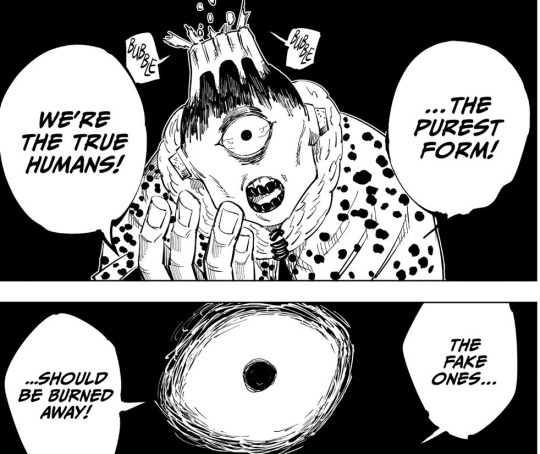
This shadow is also what Gege refers to as "The other side". The other side of our soul and that's why the motif of evolution and enlightenment is attached to it, Culling game creates the favorable conditions for humanity's karma to ripen and takes them to meet their other side, their truth.
Nirvana or the other side isn't a physical place , it's a state of mind that can be achieved right here, right now

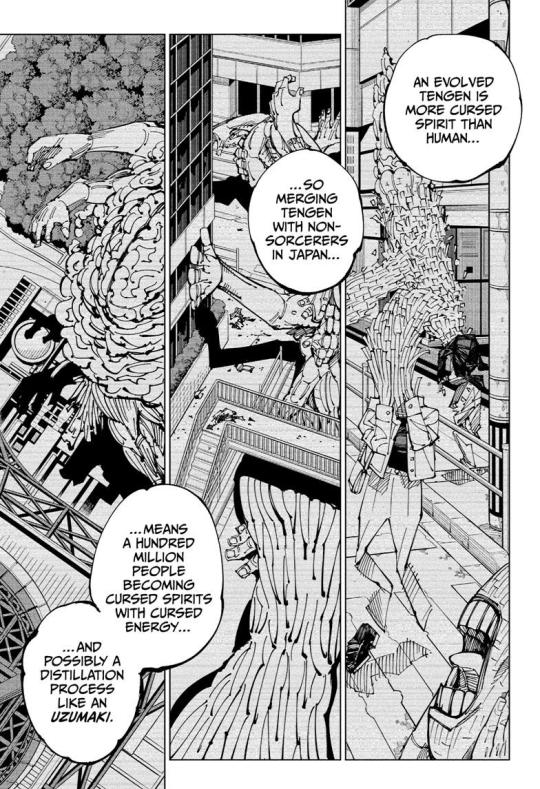
3. Collective Unconscious (Collective shadow) : the primordial grounds of unconscious from where all personality traits originate and return to , it's what I think Jogo referred to as "the wasteland". This is where archetypes are formed, where the personal shadow takes birth. This collective shadow evolves with time, constantly changing, impacting the personal shadow which impacts the Self of an individual.
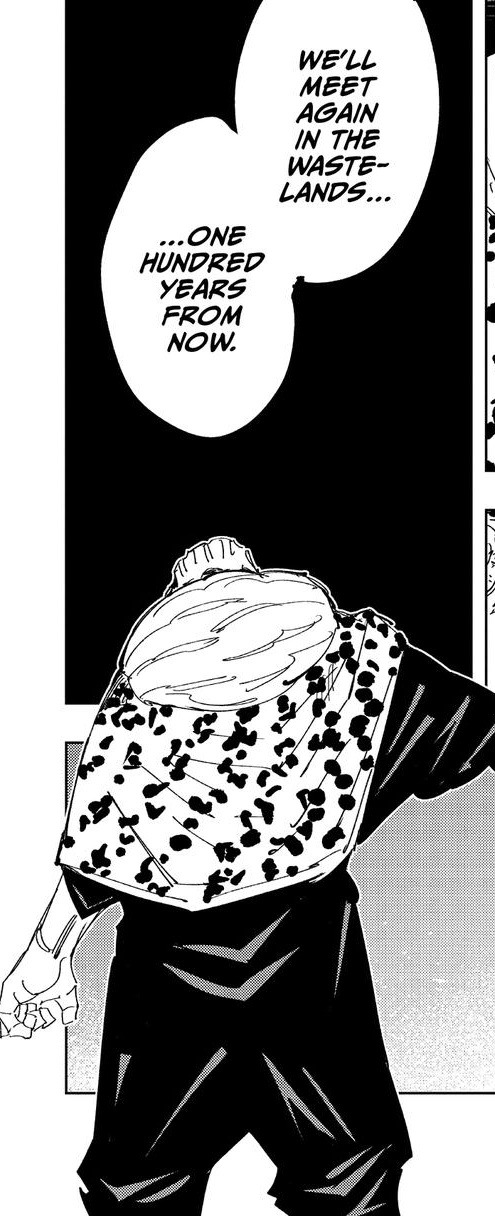
This is also the space that Kenjaku and Sasaki inhabited in chap 160. Remember this vol 23 Pv ? Look at how there seems to be a different form of existence that is active at night (the big eyes and the shadow).
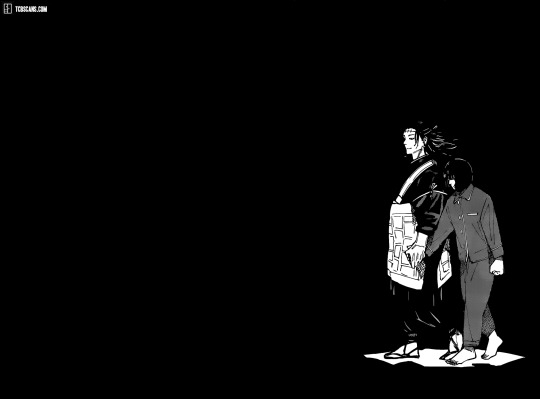
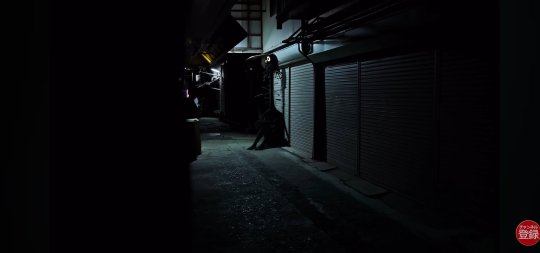
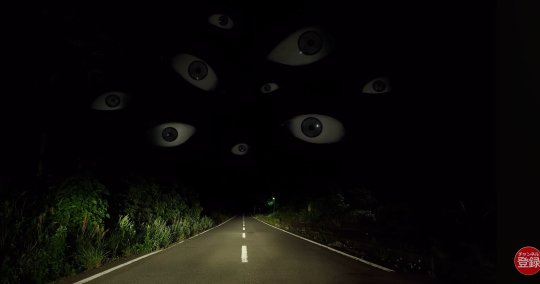
While one is asleep, the shadow self is awake. It sends messages to guide and control them through the medium of Dreams. Humanity's actions are instigated by their shadow which arises out of the collective shadow and this form of control is what JJK refers to as 'Fate'.
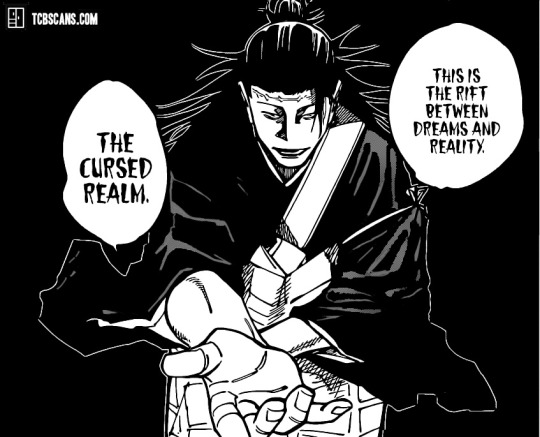
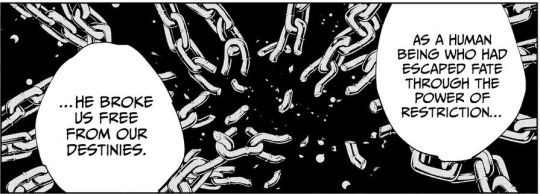
Now the inclusion of fate doesn't mean that it is supposed to predetermine every action and extinguish free will. It's a form of test and this is where the difference between fate and karma comes into play. Fate is the set of cards given to one based on their previous karma , how they choose to play with them is their present karma offering them a chance to be free of their fate ONLY if they could recognize their shadow and accept it and this acceptance is 'Love' in JJK's context.
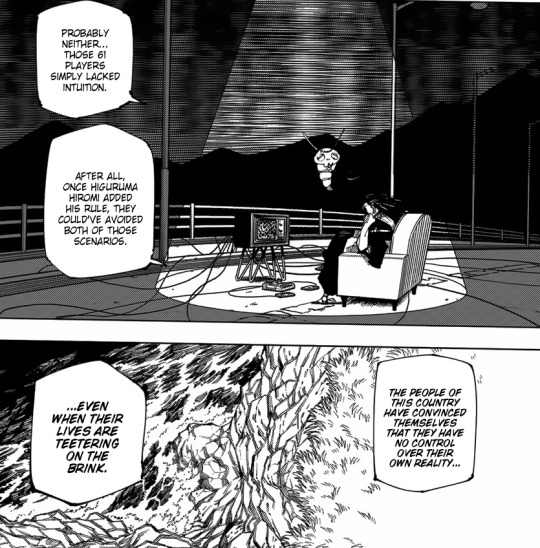
Kenjaku talking about the impermanent nature of Fate or Karma
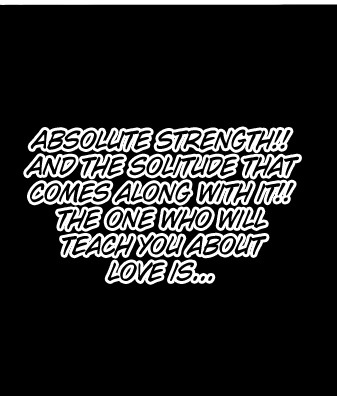
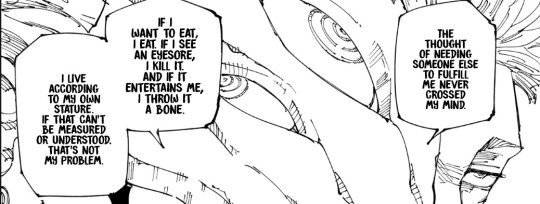
The concept of love or understanding, the love of Self
The collective shadow is ultimately the repository from where parts of the soul that humanity ignores originates, this collective shadow IS what Gege refers to as "Evil" in JJK, what Sukuna wanted to get close to through "The Bath".
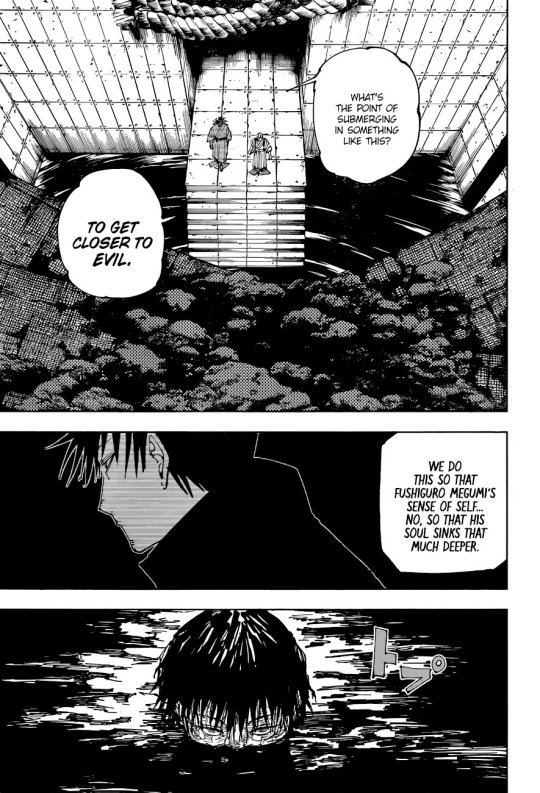

Jung once said "Until you make the Unconscious conscious, it will control your life and you will call it fate" which summarizes the concept of Fate within the framework of Jujutsu Kaisen.
I'm honestly not very sure if what I've said in this thread and the connections i made will turn out to be true but it was fun to write and share this and i intend to continue this theory. Yeah...there's even more that i want to add later on. Thanks for reading.
18 notes
·
View notes
Text
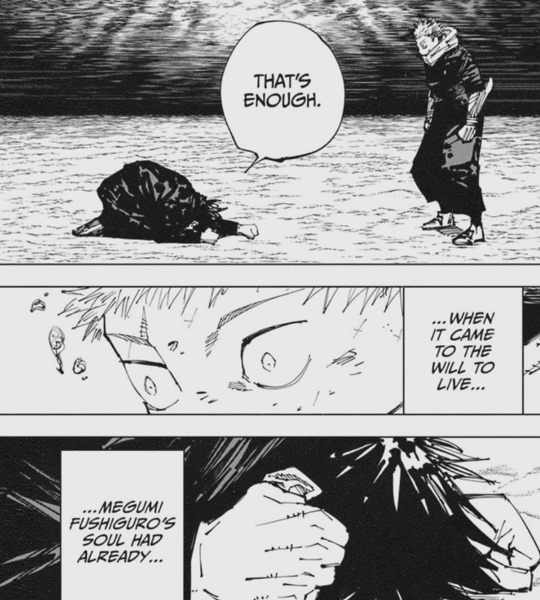
Megumi Will Start the Merger Theory
You heard me. I know this sounds wild and out of left field, but it's just a theory. A Jujutsu Kaisen theory. I fully acknowledge it might not happen, but please stick around long enough for me to argue why I think Megumi's character may go in this direction.
This one is for all the Megumi corruption arc truthers out there. I came up with this theory when it became clear that saving Megumi from Sukuna's grasp was going to be more difficult than just giving him a motivational speech, or punching Sukuna until their souls separated. Furthermore, I believe that Jujutsu Kaisen's manga won't end with the defeat of Sukuna. There will be one more curve ball thrown at us by Gege in the late game, and this is me trying to anticipate the pitch before the baseball hits me in the face. Underneath the cut I will speculate on the direction that Gege may take Megumi's arc, the relationship between Sukuna and Megumi, and Yuji's role in the finale.
What is a Corruption Arc?
Before digging in too deep I want to explain what I mean when I say I'm a Megumi corruption arc truther. A character arc is a story arc in regards to a character where a character changes from beginning to end. That's the most basic definition, arcs can be more complex, some arcs are actually inversions of the standard character arc where a character is defined by his lack of change.
However, those still need some element change, sometimes characters around them change to show contrast. For example, Eren is a stagnant character from beginning to end in Attack on Titan, but characters like Mikasa, Armin, Jean all grow up to show by comparison how little Eren has grown. Sometimes circumstances change around a character, and their lack of growth is a failure to adapt to those circumstances.
A character arc requires a change, but it's not necessarily a positive change. Often called negative character development, these characters regress instead of grow. This happens in many ways. One of the most basic examples of a character arc is a want / need arc. A want / need arc shows an emotional hole in the protagonist's life that needs repairing and how resolving the plot allows them to fill that hole. The protagonist usually knows what they need, but they know what they want, and often what they want won't actually fix them.
For example if I'm feeling sad I want to eat donuts to lift my mood, but what I need to do is learn healthier ways to work through my negative emotions. A character who keeps pursuing what they want, instead of realizing what they need won't grow, that's negative character development.
That's just one example though, Gege gave us a blueprint for a corruption arc in Hidden Inventory.
In Yu Yu Hakusho the character Sensui (directly cited by Gege as his inspiration for Geto in an interview) once was a spirit detective like the protagonist. No one describes him as corrupt from the beginning, in fact he's constantly described as more pure and upstanding than delinquent Yusuke Urameshi who likes getting into fights. He has a strong sense of justice, but rigid black and white views that come with it. Once he's confronted with evidence that directly contradicts his demons bad, humans good paradigm he cannot cope, and the narrative all but states Sensui's purity traditionally a good trait corrupted him because of his inability to adapt and his rigidity in in his beliefs.
Sensui goes through a corruption arc, albeit one offscreen and mainly referred to in backstory.
Geto's happens onscreen in its own story arc where he is one of two main characters. Much like Sensui he's presented to us as a sorcerer like Gojo, but unlike Gojo he believes sorcerers are obligated by duty to protect non-sorcerers who have no way of fighting against curses. You could argue that in some ways Geto and Gojo are the same type of jerk, but Geto's principles are clearly set up to contrast Gojo who at that age only was a sorcerer to flex his abilities. Geto's friendship often has him lecturing Gojo about respecting others, paying special attention to Gojo's feelings in ways that other characters don't, and also not being afraid to clash with Gojo over differences in morals.
If Geto is corrupt from the beginning there's no arc there, so he's clearly set up as being the moral fiber to contrast Gojo. We are literally presented with a scene where Gojo admits he could kill the non-sorcerers who hired a bounty hunter to assasinate Riko and feel nothing, and relies on Geto to make a moral judgement in his place, that society will already punish them and their slaughter is pointless.
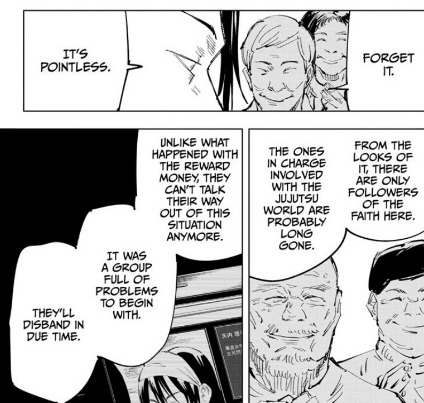
The irony is that later, Geto will engage in pointless slaughter killing an entire town in retribution for their abuse of Nanako and Mimiko. When Gojo confronts him about his actions, Gojo cites the same reasoning that Geto provided him to stop him from killing the cult members.
That Geto's murder of innocent civilians is pointless, because it won't achieve anything - his world of sorcerers is out of reach. Geto's clearly positioned as Gojo's moral tether, because he cites Geto's statement of only killing when there's meaning to it right back at him.
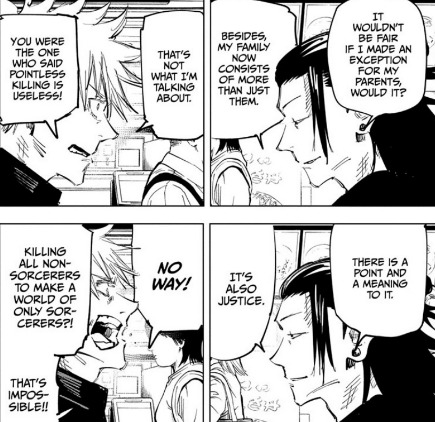
This is also where the corruption part of his corruption arc comes in, a change has taken place here. Geto hypocritically contradicts his earlier words, not just engaging in meaningless slaughter but also punishing people with his own hands instead of letting the justice systems in place take care of the punishments. Two things he held Gojo back from doing, only to do himself post corruption arc.
You could cite many things as the reason for Geto's corruption arc, but the common theme shared with Sensui is resistance to change. Geto saw the world in two distinct categories strong / weak, the same way Sensui saw humans good / demons bad. When Geto is shown that weak people are capable of bonding together to oppress strong people (the cult) and that sorcerers despite having strength are on the losing end of their society (they are expected to risk their lives and toil endlessly for curses 99% of the population can't even see), he cannot cope.
He especially cannot cope with the reality that Rika's death showed him, that he is not strong as he once believed. All of this combined leads Geto to double down, still seeing strong and weak as separate categories but now blaming normal citizens for the inherent corruption inside the Jujutsu World. Notice how Gojo a character with positive development seeks to reform from inside the Jujutsu World instead.
Geto also still wants to think of himself in the strong category, rather than facing the feelings that Riko's death and his helplessness in that moment gave him, as well as Gojo pulling he instead decides to double down on the idea that he's in the strong category, that he's superior.
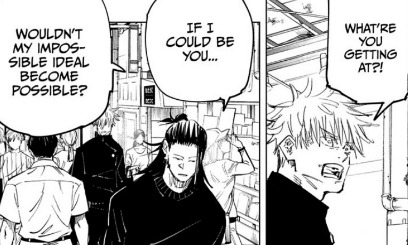
Geto even remarks jealousy at Gojo's godlike power for the first time, when before this he's always been the only person to treat Gojo as an equal - because Geto doubling down on his superiority complex begins imagining himself above others and therefore untouchable by trauma. It's also a grab for agency, because in this world sorcerers are rather agenciless, forced to be cogs in an unfair system. Geto incorrectly assumes agency = power. If he possessed Gojo's power he would be able to grab his agency back (which is simply incorrect because Gojo is one of the most agenciless characters in the manga, defined by his rigid role as the lynchpin of society).
Geto also doesn't mature. A mature adult lives in the world, and accepts that the world is imperfect. Geto is remarked as childish, first by Shoko when they are smoking together "sulking because no one understands you... sounds awfully childish if you ask me", and then by Yuta "You think you're a god? You sound like a kid!"
So we have, refusal to grow up, refusal to adapt to a complex world, resistance to grief, and grabbing for agency and power instead of fixing an issue inside himself - all of these combine to make the Jenga Tower that is Geto Suguru collapse.
The central question of Geto's arc, spoken by Gojo to Yaga is "Is it possible to save someone who doesn't want to be saved?"
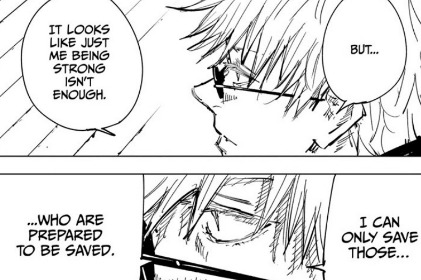
If Geto refuses all help, refuses to admit that he's wrong, and does not want to change then what really can Gojo do in this situation? Was he right to give up? Did he give up too early, refusing to kill Geto but also spending ten years just ignoring the problem until Geto attacked in Jujutsu Kaisen Zero? Did it not matter what Gojo did because ultimately Geto's choices are his own?
There's no clear answer, because it's a question the author is asking the audience to ponder. It's also a question directly set up for Megumi to answer, because when Gojo is unable to do a thing for Geto we see his next action is to seek out Megumi. His words imply that he sees Megumi in Geto and advises him not to be left behind, he also clearly became a teacher in order to not let what happened between him and Geto repeat in the next generation.
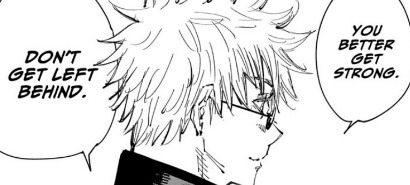
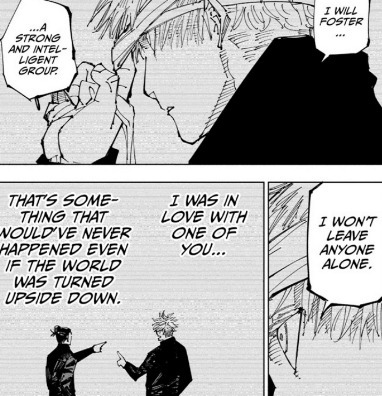
In spit of Gojo's best intentions, he's not able to protect Megumi from any of Sukuna's designs toward him, or basically anything that happens in post Shibuya's. Simply raising Megumi to be strong, did not prevent him from suffering trauma in his youth on Geto's level.
There's even a deliberate parallel, they both witness the death of an innocent who they promised to protect (Tsumiki, Riko Amanai) and they both have had their body taken from them, Geto's corpse is turned into a literal puppet to help advance Kenjaku's plans, Sukuna steals Megumi's body in order to revive himself in the modern era. They're both even used as tools against Gojo, Kenjaku uses Geto's body to awaken memories in Gojo and complete the sealing. Sukuna uses Mahoraga to learn the world splitting slash that cuts through Gojo's defenses.
Megumi also has a set of values that society spits in the face of. Megumi wishes to selfishly protect his sister, and pick and choose who to save. Geto believes the strong are obligated to protect the weak. Geto sees weak people who are corrupt and not worthy of his protection and also the reality that sorcerers are the exploited class, Megumi is forced to kill Tsumiki with his own hands.
These are intentional narrative parallels to show the risk of Megumi may walk the same path as Geto, especially since Megumi is in many ways a pure child like Geto himself.
Dark Phoenix Arc
There's one more corruption arc I want to compare Megumi's too, to give some idea of where I expect Megumi's arc to lead.
The Dark Phoenix Saga commonly refers to the story in Uncanny X-Men #129 - 138 of Jean Grey’s corruption by the power of the Phoenix and the Hellfire Club. It was considered incredibly shocking for its time. One thing to note is while Jean Grey is famous nowadays, in early X-Men she was the weakest character and her role was basically limited to “The Woman” of the team.
Elevating the helpless damsel woman to the most powerful member of the team, if not the entire universe and then having her turn evil had never been done before. It was a jaw-dropping shock at the time.
The reason I am citing the Dark Phoenix arc as an example, is because both Jean Grey and Megumi's character arc revolves around themes of agency, how it's stolen from them and how they reclaim it.
The basic summary of the Phoenix arc is that Jean Grey is initially given a massive power boost when she's possessed by the Phoenix. She stays behind on a crashing ship only to be saved by the Phoenix, a guardian, alien entity of immense power that was locked away in a crystal. Jean Grey returns as Phoenix with a massive power boost, but there's several ambiguous elements that compromise her agency. It's implied that Jean Grey always had a tremendous power that was in part sealed away by Professor Xavier using his telepathy (infringing on her agency) and that while the Phoenix gifted Jean Grey power, it's also an alien entity effecting her mind and body.
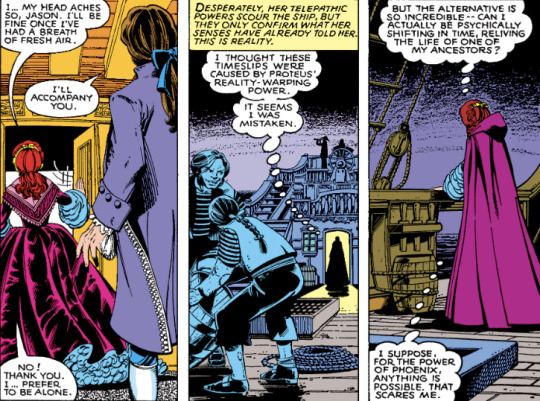
On top of that when she acquires the power, outside forces begin wanting to manipulate Jean in order to gain her power for their own ends.
A group called the Hellfire club begin to psychically tamper with her mind. They trap her in hallucination world where she is a woman of the 1800s, (not famously known for their agency) and in love with the leader of the Hellfire Club, even going so far as to give her false memories in order to convince her that this is reality.
The concept of agency and how it's constantly infringed upon, even by someone who's supposed to be on her side (Xavier) is central to this arc. Jean evetually escapes from the Hellfire club's manipulation, and reclaims her bodily autonomy but the story does not end there.
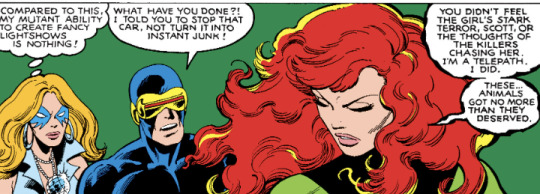
The subtle changes in Jean's behavior still continue, even after Jean has freed herself from the mind control. Is this the result of being given too much power at once? Is Jean losing control because she was never taught to properly handle her powers?
Jean Grey is also the character with the strongest potential in the main cast (much like Megumi) and also a character who's been prevented from using her powers to their full potential and even had her powers stolen and used by others (Much like Megumi).
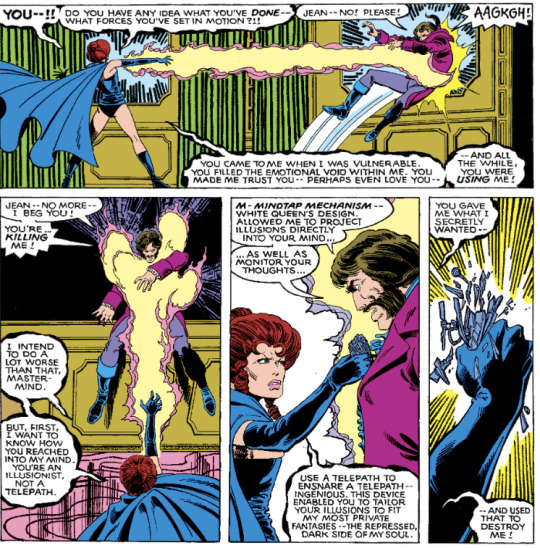
It's heavily important that Jean's corruption into dark phoenix happens after freeing herself, and in response to the Hellfire club's machination to take all agency away from her. Jean instead makes a grab for power and agency by abusing her power as Dark Phoenix.
Jean even mentions that turning against her friends and trying to kill them as Dark Phoenix, will sever the last tie holding her back, will get of Jean Grey for good and cause her to fully embrace being Phoenix.
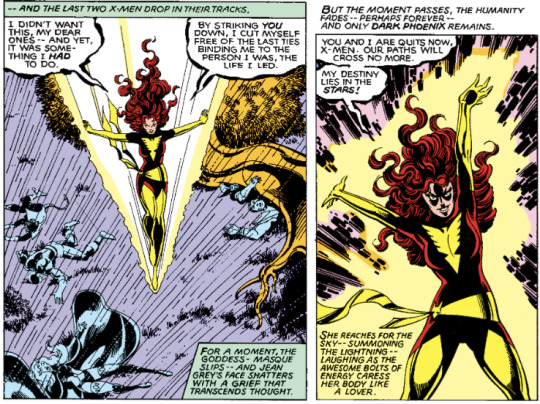
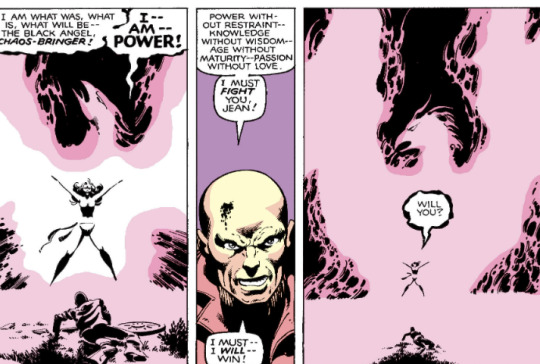
Jean has flipped entirely, overembracing the power and agency that has been stolen from her again and again, but really how could someone not desperately try to take back control of their lives after being mind controlled or having their mind violated multiple times (the phoenix itself, the hellfire club, even by Xavier).
How can someone never allowed to use her power, or given choices on how to use her power, not be corrupted when after being stepped on all of their lives the power of a god is dropped into their lap?
This is why I believe Megumi will be the one to initiate the merger, because his entire arc has been about having his power stolen away from him and what would Megumi do when given total power over the merger by Kenjaku?
Megumi Corruption Theory
The biggest piece of evidence for this theory is right here, Kenjaku specifically says to give Megumi Fushiguro the authority to start the merger.
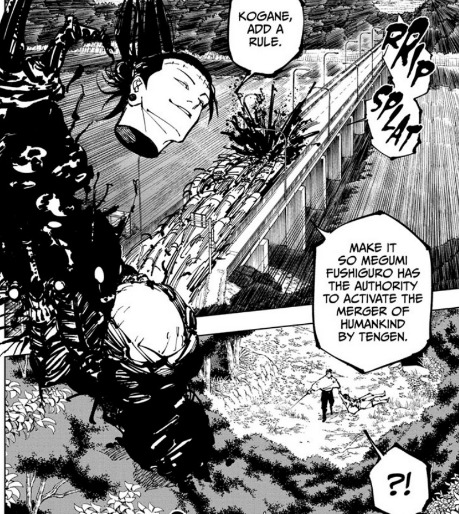
There's a technical reason for this, Sukuna is currently in Megumi's body, and Sukuna himself was actually registered in Yuji's place because Yuji was built by Kenjaku to be a cage for Sukuna.
However, it can also be read as foreshadowing. If you believe like I do that the merger has to happen, then Sukuna can't be the one to initiate it. The simple reason why is that the main characters will have to be alive to fight against a merger, and Sukuna has set the condition that he'll start the merger after killing the main cast in order to motivate them to fight him with everything they have.
If Sukuna is going to start the merger after killing all the main characters, then he can't be the one to start the merger because the main characters have to be alive to witness the merger take place and fight against it somehow.
Therefore, logically if the merger is going to occur the only person who could possibly activate it is Megumi Fushiguro after reclaiming his body.
There's more foreshadowing then this one instance however, and a lot of it revolves around Sukuna and Megumi's unique relationship and Sukuna's role as a character.
As for why Megumi would possibly start out the merger, it's the same as Jean Grey, a character denied of agency suddenly has all the power in his hands, who wouldn't be corrupted? Especially Megumi, a character who's just been robbed of his sister and his mentor, and his purpose in life besides that (protecting Tsumiki)? Why wouldn't he lash out if suddenly given the power to? His friends are trying to save him yes, but Megumi is begging those save friends not to save him to end it all.
How do you save someone who isn't prepared to be saved?
How is the story going to answer that question, if saving Megumi is a matter as simple as just beating up Sukuna and giving his body back to him?
Onto analyzing more foreshadowing, but first a brief tangent on the nature of foreshadowing in Jujutsu Kaisen. Every major twist in the manga is foreshadowed far in advance. Kenjaku beng the one to possess Geto's body - foreshadowed by Kenjaku killing Mechamaru when Geto was against killing young sorcerers, and the fact Geto was deliberately killed onscreen with no explanation provided to the audience on how he could possibly revive.
Sukuna calls the purpose of the bath to be near evil, to submerge Megumi's soul.
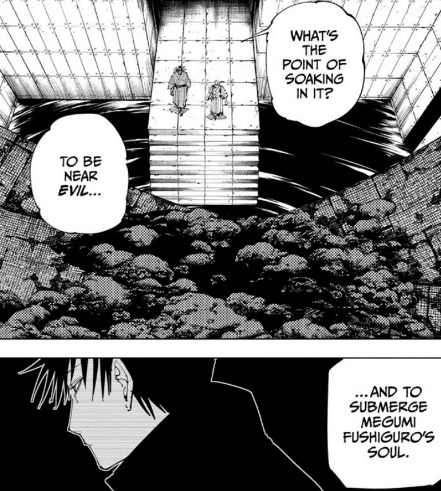
If saving Megumi is just a matter of ridding him of Sukuna's possession however, then how does that allow Megumi to reclaim his agency? What agency does a damsel in distress who just exists to be rescued have?
Megumi's entire arc has been defined by the potential power that everyone sees in him, and his inability to reach that power especailly since other characters (especially Sukuna) seek to steal that power for their own ends. In the culmination of this arc, Sukuna literally steals Megumi's body, and his bodily agency.
How does Megumi finally live up to that potential if Megumi's arc ends with him being saved by Yuji? How does this make Megumi grow or change in any way?
Sensui, who is once again Gege's model of a corruption arc is referred to as a pure angel that was inevitably grew scarred and defiled, by his close personal confidant Itsuki. Not only that, but sinking deep into despair made him grow stronger not weaker.
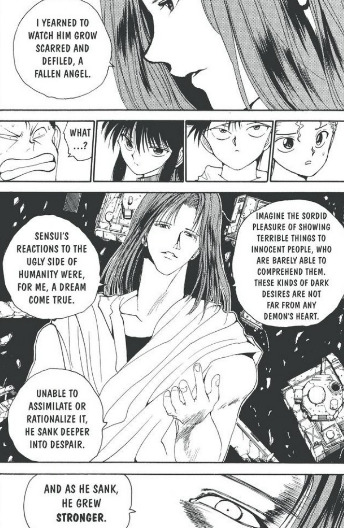
Itsuki is also, a demon who met and encountered Sensui and then took a deeply invested perosnal interest in watching Sensui be corrupted in real time.
Megumi also has a curse that took a sole interest in him because of his talent and potential, then had a hand in bringing him closer to evil in order to make him sink into despair. There's once again the symbolism of purity being corrupted.
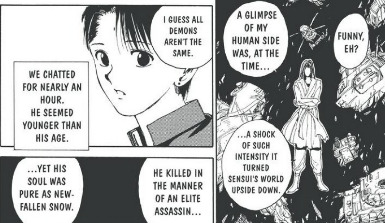
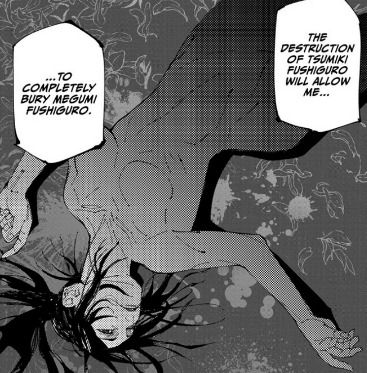
This panel explicitly shows white lilies (symbols of purity) being torn apart and blackened to symbolize what Sukuna wishes to do to Megumi in order to further is own ends.
There's also the heavy budhist symbolism with Sukuna's role in the story, and the way he influences the rest of the cast, especially Gojo Satoru who is our stand-in for the Budha. If the goal of Jujutsu Society is to attain enlightenment (escape cursed energy probably the only thing that will end the miserable lives of sorcerers), then the merger represents the opposite, Kenjaku's goal of optimizing cursed energy by mixing humans, sorcerers and curses to give birth to a new being.
That's also a conflict that needs to be resolved, but Sukuna by pushing forward the optimizing of cursed energy and representing the peak of sorcery living only for sorcerery and his own strength represents a Mara.
Sukuna is comparable to the Celestial Demon Mara in budhist mythology, more on it in this thread. In budhist cosmology, Mara is the “personification of the forces antagonistic to enlightenment.”
If the ultimate goal of budhism is to escape the cycle entirely and stop being reborn in the sensuous realm, Maara instead tempts people to stay in this realm. it defines impernanence by suggesting we stay in this realm forever. It defies Dukha by saying we indulge in physical pleasures in this realm, that we should seek to satisfy ourselves even if budhism argues that life is primarily unsatisfactory.
We even see Sukuna literally tempt a budha-like figure into remaining in this earthly realm. After all aren’t we shown that Gojo achieved enlightenment at seventeen and let go of earthly emotions like the need to be angry and avenge Riko’s killer because the feeling of oneness with existence was too good in that moment.
A lot of people noticed what they thought was Gojo acting out of character in the fight with him and Sukuna, by enjoying the fight and choosing his selfish desire to love jujutsu and fight as a sorcerer over his responsibiltiy to protect children. Something which Nanami says in his dying hallucination that Gojo only ever lived for the pursuit of his selfish desire for Jujutsu in the first place.
Gojo in his last fight against Sukuna forgets about saving Megumi or at least makes it a lesser priority, because Sukuna tempts him to do what he's always wanted to go all out in a sorcery fight and have the freedom to use his powers to the best of his ability. Hoewever, even after using his full strength, Sukuna cuts down the notion that he is above humanity and drags him back to the earth - literally calling him unenlightened.
“This is goodbye. You were born in an era without me and hailed as the strongest yet you turned out to be painfully ordinary…”
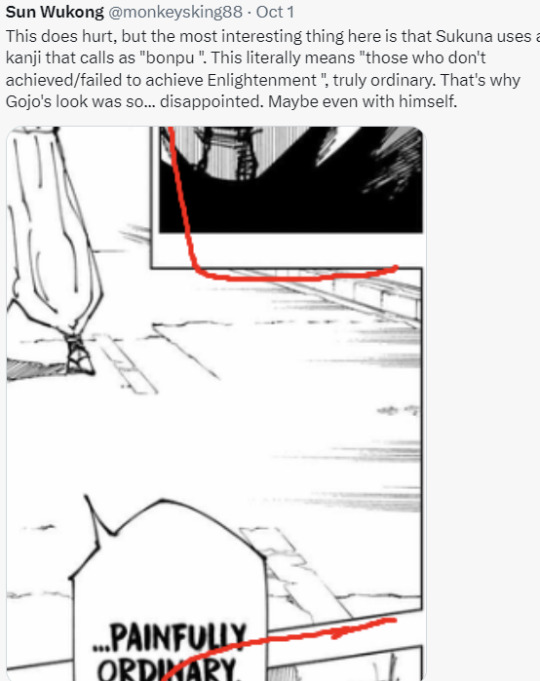
Does Sukuna not represent this temptation for all characters? Sukuna represents the selfish ideal of sorcerers, using his powers for himself to satisfy his hedonistic desires and because of this he has the most agency in the story and the story at times even bends to his desires.
Characters even fight for Sukuna's recognition, Hajime, Jogo and Gojo are validated by that same recognition in theend.
Why wouldn't Gojo and more importantly Megumi who are characters with very little agency not jump at the chance to be more like Sukuna, especially if it brings Sukuna the freedom he possesses?
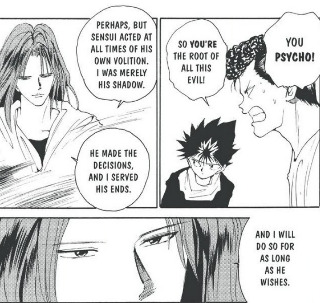
Itsuki refers to himself as Senseui's shadows, leading him to act on his darkest impulses and enjoying watching the corruption spread. Megumi is literally a character who's Jujutsu revolves around his shadow, and summoning powerful Shikigami from it in order to fight. A character with an incomplete domain expansion (another loose plot thread with Megumi that would be unresolved if Megumi were simply saved) which is his own creation, which might surpass Mahoraga the technique handed to him.
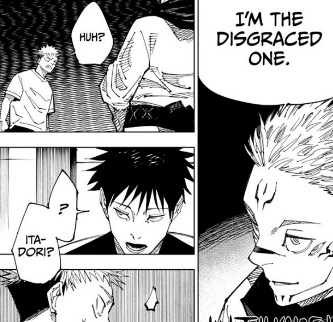
In addition to being a Mara, Sukuna is also literally called the "fallen / disgraced one". Itsuki calls Sensui a fallen agel, but in the context of Jujutsu Kaisen there's literally a character called Angel, who's only goal is to save Megumi's soul, and there is a satan figure in Sukuna who wants to corrupt him. Literally, there's an angel and devil on Megumi's shoulder.
How is stealing Megumi's body corruption though? Megumi's not being tempted into being selfish. He's not responsible for any of the sins that Sukuna commits in his body. There's no arc there, because Megumi doesn't reclaim his agency in response to having it stolen away, he doesn't decide to do the bad things himself - it's Sukuna who commits the wrongs.
Even More Setup for the End Game
Here's where I stop referencing Yu Yu Hakusho and only use foreshadowing in the comic itself. The first is the discussion of roles, and how Yuji needs to break away from them, as much as Megumi needs to fight for his agency back.
Part of the reason Sukuna jumped bodies is because Yuji wanted to be given an easy role like a character in a story - rather than thinking and deciding for himself. He thanks Megumi and Gojo for giving him a role seconds before the body swap happens. If Yuji is immediately punished for thinking that what he needs is to be a cog in the machine, to be given a role then methinks that's a bad thing.
However, Yuji has not broken away from that thinking in any significant way. Sukuna even mocks him for finally being given a role.
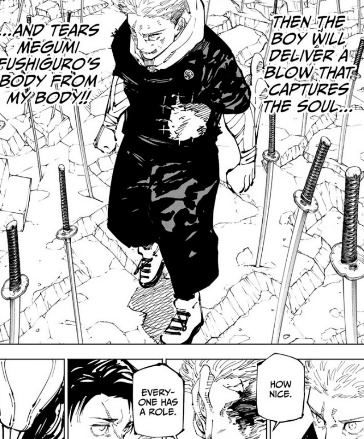
If Yuji's thinking hasn't changed then no story arc has taken place. If this conflict of Yuji wanting to conform to a cog or a role has persisted since Shibuya - then it's clearly important to his arc and is something that needs to be resolved. If Yuji just solves the problem by being stronger than Sukuna and beating him in a fight, how does that resolve Yuji's flaw of clinging to roles rather than thinking for himself? I ask once again, where's the change?
Saving Megumi like a damsel in distress is still a role someone else has assigned him.
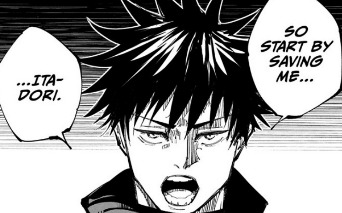
How does the decision to save Megumi right now challenge Yuji's hero complex in any way, besides the fact that Megumi has sunk into despair and would rather just end it all. Is that much a conflict that really forces Yuji to think for himself - to go against the grain of society rather than blindly following others.
If Yuji gets to rescue Megumi like a damsel, that's giving him what he wants, without forcing him to realize what he needs. That's as much of an unfullfilling end to Yuji's arc as a ending where Megumi never reclaims his agency and stands on his own feet and just has to sit there and wait and be passively saved.
Most of all the question: "Is it possible to save someone who's not prepared to be saved?" goes unanswered.
Geto wasn't just depressed and suicidal, he was actively making harmful choices and represented a danger to others. He also had no intention of stopping the path that he was on.
There's a clear parallel between Megumi and Yuji's friendship, and Geto and Gojo's past fallout. However, if it's just a conflict of Yuji saving Megumi who's simply too suicidal and doesn't want to go on living, there's no conflict there. The audience will not see whether or not Gojo was still capable of saving Geto post his burning down the village, or if there was no walking back from that choice. The previous generation won't resolve or fix the mistakes of the past generation.
Yuji remains a hero, Megumi remains a victim, as I reiterate for the thousandth time there's no change.
Megumi starting the merger, or even defeating Sukuna himself (maybe with a completed domain expansion) and then starting the merger is a change. It's also foreshadowed, Mahoraga is the technique he inherited, the technique Sukuna stole (and Mahoraga won't work against him he's already defeated it), Megumi's domain expansion is his own creation, created in his deepest moment of personal growth.
The process of individuation also literally requires a character fully integrating their shadow. Sukuna possessing Megumi is not Megumi facing his shadow or his worst traits, because Sukuna is not Megumi's shadow, he doesn't reflect Megumi's flaws in anyway, he's literally just a parasite.
There's also the 1001 Toji parallels to Megumi that have gone unfulfilled. Toji specifically a character who was abused, then chose to continue the cycle of abuse, specifically because he wanted to prove himself stronger than the peak of sorcery. Especially after a lifetime of being belittled and abused by not having the potential of his Heavenly Restriction recognized.
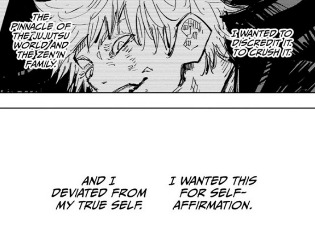
And what do we have here, but a scene of Toji LITERALLY EMERGING FROM MEGUMI'S SHADOW, in order to enter Dagon's domain.
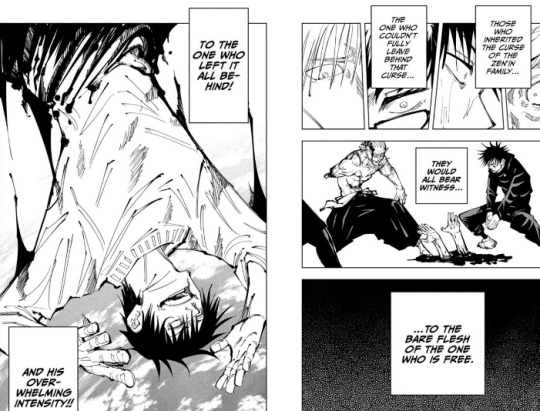
How is Toji referred to afterwards? As a puppet of carnage bearing his fangs at the strongest around.
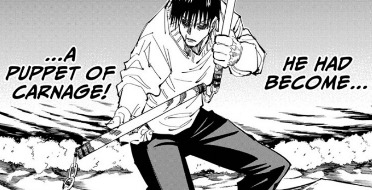
An incredibly Sukuna like description, number one because Sukuna's entire existence is simply bearing his fangs at the strongest around, and number two Sukuna is referred to as pure destruction, like a calamity, something with overhwelming sense of self and no humanity.
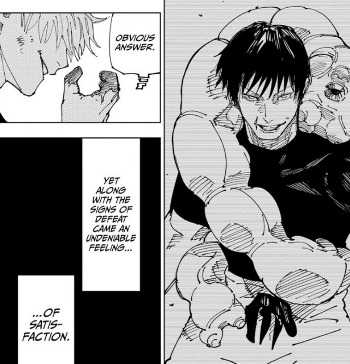
Not only that, but when fighting Sukuna, Gojo makes an explicit reference to Toji comparing him to Sukuna as the last time he ever felt nervous or challenged by an enemy. Sukuna and Toji are being alligned as similiar characters, supremely selfish people who hoard their agency and strength. Toji also represents the worst of Megumi, a victim caught in a perpetual cycle of lashing out against the world, a bad future path he might take if he doesn't get over himself.
Sukuna is connected to Toji wo is connected to Gojo, and all three represent a path that Megumi has been nudged down his entire life, that he should just selfishly use his power with no regards to anyone else the same way they do.
As I said before in my comparison to Jean, why wouldn't someone who's been robbed of all agency for so long, not go too far in reclaiming it? What's stopping them now that the chains are finally off?
Megumi parallels Geto, who parallels Toji, who parallels Sukuna and why draw all these lines between these characters if it's not to represent a path that Megumi could take?
In other words...
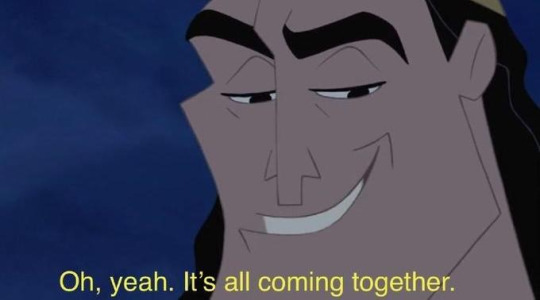
#megumi fushiguro#jjk meta#jujutsu kaisen#ryomen sukuna#geto suguru#fushiguro megumi#gojo satoru#jujutsu kaisen meta#jujutsu kaisen theory#jujutsu kaisen spoilers
183 notes
·
View notes
Text
Was there a chance or a choice?
Loneliness in strength his arrogance pedestal by birth

I am fascinated by high-quality combat systems, especially when they are rooted in something that nurtures positivity within us, like a core. However, in this story, everything is the opposite: negative emotions prevail, cursed energy abounds, and not everyone can attain the ability. Those influenced by it are capable of absorbing this negativity and transforming it into combat techniques, which is disheartening and does not contribute to enlightened perception, would you agree?
This story about a closed society, full of alienation and devoid of hope, presents an interesting comparison with other plots in the "shonen" genre. The most unpleasant aspect for me lies in the illusion of power in this story. Here, there is no spiritual essence, nothing akin to notions of the soul, but rather a physical embodiment of human emotions, which is quite saddening.
There is no idea of liberation and absolution in this story
It's surprising that, for the first time, I am against the idea of the main character becoming the " strongest " here .This contradicts the true essence of strength—avoiding the descent into madness, a characteristic often seen in other formidable characters who appear dissatisfied and seemingly bound, unable to perceive themselves beyond the 'curse of strength.' The question remains whether they desire this state or are simply incapable of escaping it

Regarding the moment with Gojo, it's interesting to consider that he, like Sukuna, belongs to a society with different values . Perhaps he is incapable of perceiving himself outside of this context, distorting his understanding. I wonder if he grasped this " proverb "or projected it onto himself, distorting the comprehension, as he is in the "hands of madness" of his "power." It seemed as though he divided himself into a human and "power," emphasizing the "ego" in the "power," placing himself in the center of the " stage " in manga panel.
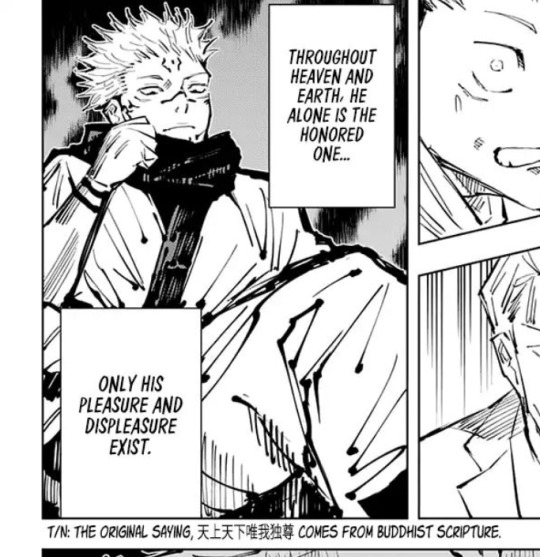
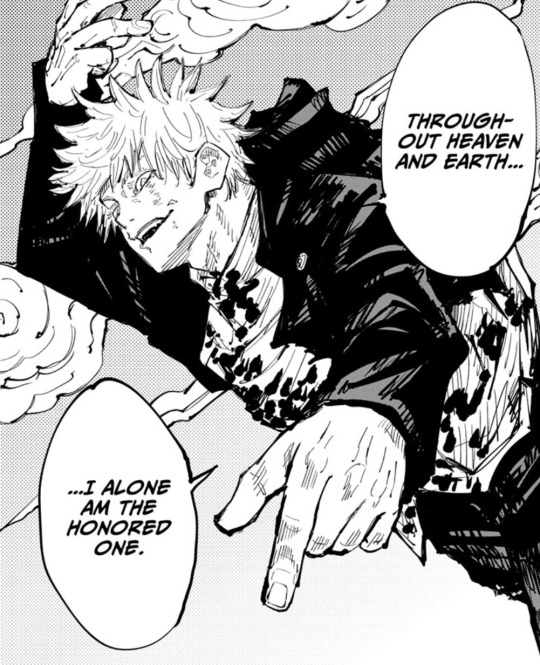
and with an equally patronizing gaze from top to bottom
In doing so, he "highlighted " - ego, the heavens, and the earth. He emphasized the separateness of the heavens and the earth, which is fundamentally incorrect. Since there is no boundary where the sky separates from the earth, I'll jest and say that a significant part of our body resides "in the heavens" within our common air. And that's where I'm heading
When Buddha proclaimed, "only I reign supreme / I Alone Am The Honored One," he distinguished himself from others. Few have contemplated that a significant part of our physical existence resides in the realm of the heavens. By embracing this awareness, he positioned himself as the sole individual consciously perceiving himself within the heavens, as there is no discernible boundary marking the beginning of the sky. Consequently, he became part of that vast expanse, akin to a monarch inviting others to join his state of mind.
In this context, Buddha's proclamation transcends specific earthly elements like the earth and sky. Instead, he directs attention to the space where he achieved enlightenment, emphasizing the unity of everything. He asserted that the boundary of the world is not a horizontal division between sky and earth but a vertical one that unites them.
Having attained mental enlightenment, Buddha liberated his perception from mundane categories. He recognized the absence of boundaries and emphasized his presence within the entirety of space as a unified whole. Here, true strength did not lie in physical power or authority but in the awareness of undividedness. This realization serves as a crucial observation, as the characters in our story struggle to escape this understanding.
Buddha's awareness of his exceptional position in the world, existing "in the heavens," signifies his integration into all aspects of that space, including the sky and the earth. This mental enlightenment enabled Buddha to transcend ordinary categorizations and perceive reality as an undivided whole.
------------------------------
Traditional Translation: "(天上天下唯我独尊 - whether it's above heaven, or it's under heaven, only I reign supreme)"
獨- alone
尊 - to honor
My interpretation 天上天下唯我獨尊 - whether it's above heaven, or it's under heaven, only I single honored
honored with freedom . (OF mind)
SO
Compare the Pali aggō hamasmi lōkassa, jeṭṭō hamasmi lōkassa, seṭṭhō hamasmi lōkassa, ayamantimā jāti, natthidāni punabbhavo from the Dīgha Nikāya.
The Pali text emphasizes the concept of "I am the highest in the world, I am the best in the world, I am the supreme in the world; this is the last birth; there is no more becoming."
His " height " it's literally about beyond mind behaviour - without reasoning things, objects . Surpassed the view (judgment) - gained sight- moment (without human mind without future and past ) - world itself.
freedom in everything not subject to human perception to meausure , peace
This state of freedom leads to peace, as it transcends the causes of suffering rooted in attachment and ignorance. Liberation from conventional cognitive constraints.
------------------------------
So, Gojo either doesn't want or is unable to accept himself differently because he perceives himself through the lens of "things like power." He doesn't see things without judgments or expectations and he hope , that someone who could be equal to him, understand him, and share his suffering in his "loneliness" on his own level of power. It's like he has reached a peak where his identity is inseparable from this concept of power. he cant sight all things , but only the thing that raised him and shaped him.
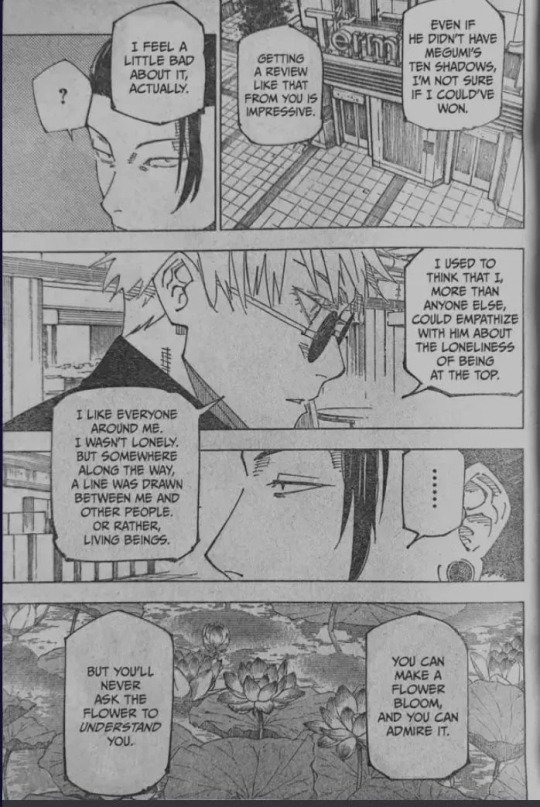
In Japan, the lotus flower symbolizes purity, enlightenment, resilience, and the beauty of life's cycles.
"Proper control over one's emotions is key to channeling cursed energy and every jujutsu sorcerer is trained to do so. This makes it so sorcerers don't waste their power supply even while they're overcome with emotion.
While cursed energy leaks outward from non-sorcerers, it flows heavily within sorcerers which keeps it contained. "
(assumption speculation)
It appears that sorcerers harbor a substantial amount of cursed energy, the entire "negativity" that they control, creating constant tension and the risk of madness. Battles serve as a means to release this negative energy, much like how strong emotions are unleashed in ordinary people.


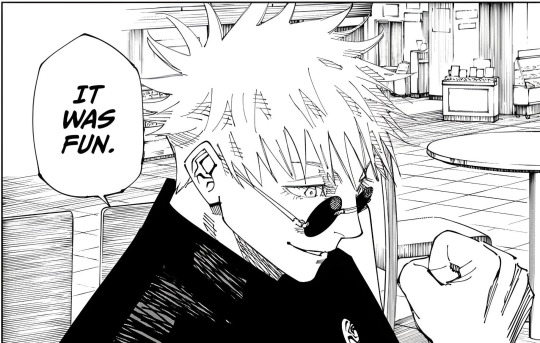
Did he find pleasure in his madness?

Yes, he did.

Their strength is primarily a constant pursuit of struggle, rather than defense

And in the end, Gojo finally died content, as he had always yearned to unleash his full power, finding true satisfaction in a battle with someone who could share that moment of madness beyond flowers and their purity . Whoever understands him truly
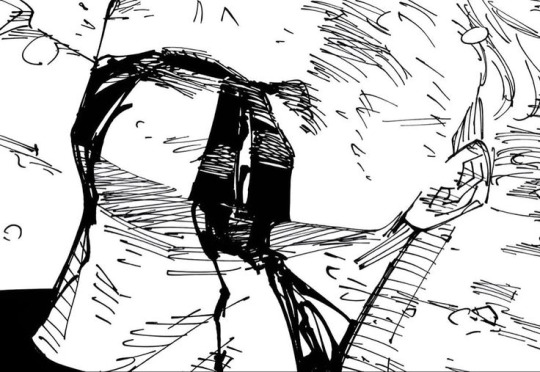
His smile(smirk) is hidden from everyone. His true feelings... his eyes are not depicted, the truth is hidden even from him.
The cycles of normal human life are not applicable to them , but chaos and decay reign among them
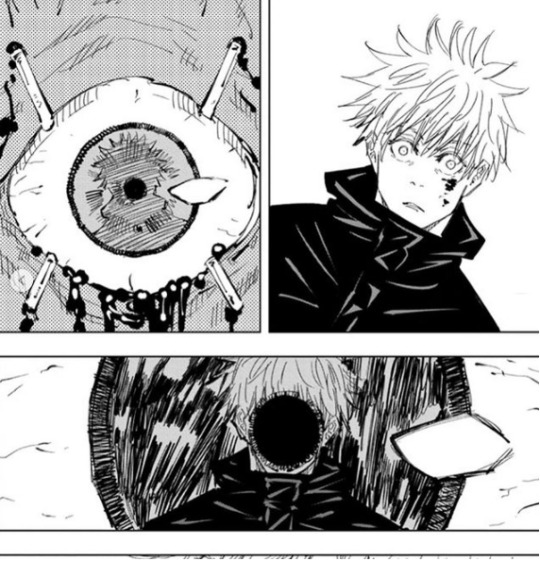
Both Sukuna and Gojo lack distinct faces;their face is a mask of war, There's no aWAReness here… instead, their visages are veiled by the mask of internal conflict, devoid of any true understanding. Their physical forms simply convey a fleeting sense of dominance, forever marked by the stain of bloodshed.
They carry the heavy burden of being the epitome of their respective eras, but the 1 question... : is this burden a consequence of their choices or merely the result of chance?
Between Sukuna and Gojo, Yuji couldn't care less about strength because it holds no significance in the context of his past and the society that shaped him—a life grounded in human values. He doesn't live in the insane, literally cursed world where people condemn themselves to loneliness in "strength." They are fixated on it, akin to samsara—engaged in constant battles and transforming negative, cursed energy. The "stronger" they become, the more they separate their "human" essence from that "strength"—descending into their own madness. The farther they distance themselves from their "human" core, their sanity erodes, giving way to madness. Their very existence is characterized by perpetual struggles.

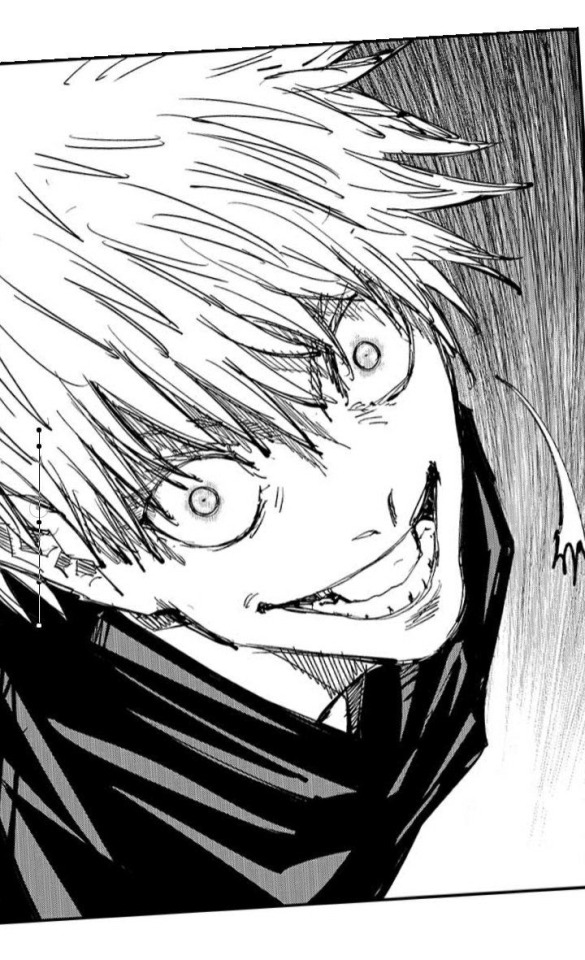
Gojo's opinions of others are often constrained by his judgment of their strength, and he is entirely apathetic toward those he deems weak. This is counterproductive.
I may not agree with it, but I do understand . the power. Being the one who can topple everything with a single push is quite daunting.
Especially when you've been treated that way since birth.

It's akin to a situation where a highly intelligent person probably wouldn't bother spending time with an ordinary person who can't offer knowledge in exchange. However, unlike this, he doesn't elevate himself and inflict pain, channeling his "knowledge strength" into something productive and not keeping it within himself. His "madness" manifests in inventions that benefit people, rather than creating solitude. It's productive.
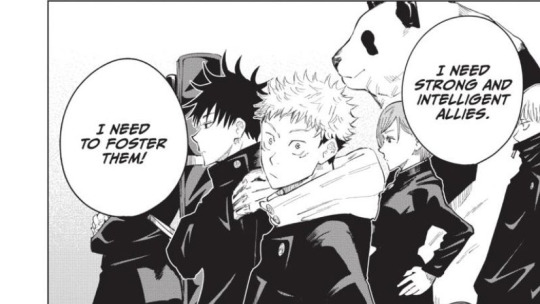
But in this case, he gained the ability to guide others - educate, nurturing the next generation. His mindset isn't focused on protecting the weak, but rather on ensuring that his students become the strongest.
In light of this, it's intriguing to consider the story as a society of alienation, where strength is cursed, and battles are fought with the physical embodiment of human emotions. Such irony creates a sorrowful image, far removed from spiritual teachings. The 2 question... remains open: do the characters wish to break free from the "curse of strength," or are they incapable of doing so? Releasing their ego for the sake of freeing their soul remains a poignant inquiry.
#jjk meta#ryomen sukuna#jujutsu kaisen#jujutsu kaisen theory#jujutsu kaisen analysis#jjk#jujutsu kaisne spoiler#yuji itadori#jjk manga#manga#jjk spoiler#jjk analysis#gojo satoru
40 notes
·
View notes
Text
JJK Theories
I honestly was so devastated (if that's how you spell it) when gojo and nanamin died (lalalalaalalal i don't hear it).
I don't know how it will be in the future.
But this is how I want it to be.
yuji (my baby) practices hard and becomes brave. Like so powerful. More than anyone else. He finally overpowers Sukuna. He wins against sukuna. And when that happens... every single sorcerer, who would have been alive by now... would come back. Like they reverse unaliveness. Like all of them. Be it Gojo ( my boyfriend ), nanamin (my husband), megumi ( my baby ), nobara, geto. Like every single one of them. And once Sukuna, king of curses die, every single curse dies with him. No king no subjects. And none of them would have to go through this shit again.
Like imagine....
I hope that, if not this, something else, but better happens. Cuz I can't handle it now. I want my babies back. (˘・_・˘)
If you guys have any theories or other imaginations. PLease tell me.
#jjk#jjk theory#jujutsu kaisen#jujutsu kaisen theory#jjk goko#jujutsu gojo#jjk gojo satoru#jujutsu gojo satoru#jjk imagines#jjk spoilers#jjk gojo#yuji itadori#gojo satoru#jujutsu geto#geto suguru#jjk geto#suguru#nanami kento#jjk nanami#jujutsu nanami#megumi fushiguro#jjk megumi#jujutsu megumi#jujutsu kaisen megumi#yuji#itadori#nobara#nanami#geto#gojo
24 notes
·
View notes
Text
me: *going through the thoughts of losing hope for Gojo’s return and no longer expecting it*
*this symbolism/theory exists*


me: *suddenly, slowly regaining a tiny bit of hope*
direction: twitter post | reddit post
#hard to be a Gojo stan.#no matter what… whether he’s coming back or not… i will continue reading it.#i never had any problems doing so when he was sealed but that’s a different case. at least i know he was still alive.#but now that he died everything is about to change. it will start with the battle between kashimo vs. sukuna#jjk#jujutsu kaisen#jjk 236#jjk spoilers#jujutsu kaisen spoilers#jujutsu kaisen theory
55 notes
·
View notes
Text
yuji is sukunas last finger
www . reddit . com/r/Jujutsushi/comments/153crf4/yuji_is_sukunas_last_finger/
I admit this is more a shot in the dark than an actual theory, but what we know so far can point towards this conclusion: Yuji came to be from Sukuna's last finger.
TL;DR: Kenjaku had all the 20 fingers and kept the last one to use it when creating Yuji. His abnormalities and Sukuna and Kenjaku's attitude towards him seem to hint this theory holds some ground.

kenjaku talking about yuji
Gojo doesn't have the finger
The last finger is currently missing, Sukuna believes Gojo has it, but it's unlikely. Gojo wouldn't leave it around, he would keep it on himself. But if that were the case I don't think it would have been sealed with him, as the prison realm can host only one being, and a sliver of Sukuna's soul is likely to be considered another person. So the finger would've been found by Kenjaku the instant Gojo was sealed.
The finger is not lost somewhere
Most the fingers were either in possession of either Jujutsu High, Uraume or Jogo, while the few laying around were quickly found and retrieved. It's not impossible, but it's really unlikely that the last finger is simply lost somewhere, even from a storywriting perspective it doesn't make much sense.
Kenjaku had all the fingers at some point
We know for a fact (Angel stated it) that Kenjaku helped Sukuna split his soul in the 20 fingers originally, and from then Sukuna learnt to do it on his own. Many theorize that Kenjaku himself was the one who dropped the fingers around hoping Yuji would come in contact with one, and this theory is supported further by the locations of the fingers being places Yuji could have been been in: a Juvenile detention centre, a school, and so on.
To sum up, it's definetely not a stretch to assume Kenjaku was in possession of all the fingers for some time.
Kenjaku kept one finger and used it to create Yuji
Now we get to the juicy part of this theory: Kenjaku kept a finger and used it for his experiments.Since the finger is neither in the hands of one of the characters, nor simply laying around, where could it be? It was used by Kenjaku when creating Yuji, to make the perfect vessel for Sukuna.
We all know that Kenjaku meddled with Yuji while he/she was pregnant, and that Yuji's abnormal physical attributes are a direct result of that. I think that Sukuna's last finger was involved in the whole process, and although I don't know how or why Kenjaku did it, I believe there are many hints in the manga that support this theory, that Yuji was created from Sukuna's finger.
Firstly our mc is a perfect vessel for Sukuna, capable even of suppressing his soul, the same soul Mahito was astonished by. An impressive feat for anyone, not to be dismissed easily. Sukuna feared Megumi might be able to hold him too, but we don't know if he would have managed to.
Secondly, while talking to Choso, Kenjaku referred to Yuji as "it", or "that thing" depending on the translation, as if he was an object, while he never called Choso and his brothers that, it's a term he used specifically for only one of his creations.On top of that, Sukuna himself admitted that Yuji "is from that era" during their latest fight. Sukuna doesn't know Yuji was made from the last finger, and at that point he hadn't met Kenjaku yet after reincarnating, but he knew Kenjaku was involved in Yuji's creation and knew Yuji is from another era. Kenjaku probably kept and keeps him in the dark about his last finger, as Sukuna wouldn't really be happy about it.
Additionally, as we know Sukuna's fingers are indestructible and Yuji is incredibly resilient. If Yuji was made from a finger, its toughness could have passed and diluted into him.
Lastly, Sukuna and Yuji look somewhat similar, to the point that the king of curses looked way more natural in Yuji's body rather than in Megumi's.
a video by quirkless shinobi who had the same idea as op:
undefined
youtube
youtube comments
There is also a nice thing to speculate upon, which is the Star Vessel. Assuming Sukuna could undergo a similar process, it could be that Yuji was made to be his vessel with a finger. Which would explains why Sukuna hates him so much, as Yuji would quite literally be him but younger, naïve and still good hearted. Back in the Hidden Treasure arc it is said that if Tengen doesn't merge he could lose his identity and maybe even turn against humans. It could be that Sukuna is exactly that, a failed merger. It's also interesting to point out that Tengen, Sukuna and Kenjaku all three cheated death and all three need vessels to do so, with the difference between them being only the specifics. Sukuna's method however is much more... Passive. Tengen and Kenjaku managed to keep hoping vessels no problem, but Sukuna was left waiting for a proper vessel to show up and finding good vessels is hard. Almost as if it an incomplete technique. And if that is the case, it would also be interesting thinking what happens when they do properly merge. Not as two souls in the same body, but if they truly fuse, how would they affect each other. Of course, this is a lot of speculation.Show lessI think that Yuji could be the manifestation of Sakuna's "soul". This ties into the conversation about what comes first from Mahito. Saluna could've been a human who discarded his soul, in a way, and essentially became a cursed spirit.I'd like to add to remember that Yuji means translated to English as much as Second son. It's a name mostly given to the second son of a family
At 2:11 I take it back because in the opening of chapter 213 we DO see Sukuna in his innate domain after he took over Megumi and he looks exactly the same as he did in Yuji. His dialogue also talks about being in "that brat's body" and taking over Megumi's in the past tense. I think the Sukuna we see in Yuji is just Sukuna and the theory I'm leaning towards the most currently is Yuji being Sukuna's finger.
I'm just going to put this here instead of answering everyone who brings it up, yes I am aware of Gege's comments on Sukuna looking like Yuji because he is inside of him. However like all author comments surrounding major plot events they should be taken with a grain of salt. Authors lie about major plot reveals to hide the truth from their readers in ancillary interviews to hide the truth in nearly all mediums of storytelling. Just ask yourself what you would do if confronted with a question that the actual answer spoils a major event in your story. In this case we see Sukuna after he takes over megumi so until we see evidence in the STORY to the contrary I wouldn't write anything off. Regardless, they look similar even if we completely ignore the innate domain which is a relatively minor detail.
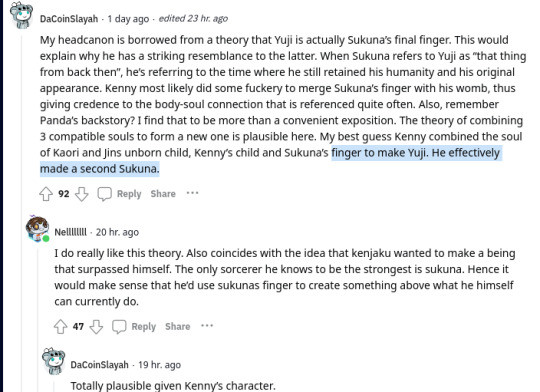
The cursed wombs like choso were made by a curse spirit a human woman and kamos blood being mixed in yuji would be made with.sukuna a and a human man and woman
#jjk#jjk theory#yuji itadori#jjk meta#jjk spoilers#jujutsu kaisen theory#jujutsu kaisen#jjk kenjaku#jjk sukuna#ryomen sukuna#Youtube
45 notes
·
View notes